Joe Moore and Anne Philippi (New Health Club) are hosts of the PS25 Morning Show! This one features Cesar Marin, AnneClaire Stapleton, Dennis Walker, Jonathan Sabbagh, Tom Feegel and Philip Graf von Drechsel!
And thats a wrap for PS25!!
Joe Moore and Anne Philippi (New Health Club) are hosts of the PS25 Morning Show! This one features Cesar Marin, AnneClaire Stapleton, Dennis Walker, Jonathan Sabbagh, Tom Feegel and Philip Graf von Drechsel!
And thats a wrap for PS25!!
Joe Moore and Anne Philippi (New Health Club) are hosts of the PS25 Morning Show! This one features Dee Dee Goldpaugh, LCSW and Tommaso Barba, PhDC!
We talk about all things Sex and Psychedelics!
In the last few weeks, Psychedelics Today has been in conversation with leadership at the Church of Sacred Synthesis about their sacrament and their perspective on the critiques that were leveled against them.
In light of these recent discussions surrounding the Church of Sacred Synthesis in connection with the findings published in the preprint of the research publication by Usona, we recognize the importance of caution and context when publishing about clinical judgments based on preliminary data, like preprints. Preprints are valuable for early dissemination but lack the rigorous peer review needed to confirm findings. Relying on unverified reports can lead to misconceptions. Due diligence, careful consideration, and peer-reviewed evidence are crucial for the foundation for clinical or scientific conclusions.
At Psychedelics Today, we acknowledge that we could have presented this story in better adherence to scientific standards and by including the voices of the church leaders as the conversation was developing. We believe we should have made efforts to give church leadership a platform to comment from their perspective. We see this as a learning experience and remain committed to thorough, balanced reporting and fostering open dialogue within the community and plan to continually improve how we show up with integrity and balanced perspectives in the psychedelic space.
In this episode of Psychedelics Today, Joe Moore speaks with Dr. Simon Ruffell, a psychiatrist from London who is also training in the Shipibo healing tradition of the Peruvian Amazon. After working in psychiatry for years, Dr. Ruffell began to feel frustrated with the limits of modern treatments. As a result, he turned to plant medicine and Indigenous healing.
Throughout the episode, Dr. Ruffell shares how Western psychiatry and traditional medicine can work together. He explains the Shipibo idea that illness shows up on three levels: spiritual, emotional, and physical. Healing, he says, must reach all three. Moreover, he describes how ignoring these levels—especially in psychedelic work—can lead to harm.
Dr. Ruffell also discusses the importance of training, trust, and cross-cultural respect. He believes that blending Indigenous and Western methods may lead to safer and more effective psychedelic care. To support this, he founded Onaya Science and Onaya.io, which work closely with Amazonian healers. Notably, their early research with military veterans is showing strong results. In fact, 84% of participants no longer met the criteria for PTSD six months after treatment.
This conversation is both thoughtful and practical. If you’re a therapist, researcher, or someone exploring psychedelic healing, you’ll find insights here. Dr. Ruffell reminds us that we don’t need to choose between science and spirit. Instead, we can learn from both.
On June 16, 2025, thousands of researchers, clinicians, therapists, policymakers, and advocates will converge in Denver, Colorado, for Psychedelic Science 2025: The Integration, the world’s most important gathering focused on psychedelic medicine and research. Hosted by the Multidisciplinary Association for Psychedelic Studies (MAPS), this year’s theme—“The Integration”—is both a guiding principle and a rallying cry: to unite the diverse domains of psychedelic inquiry and experience into a coherent, impactful movement for healing and transformation.
For mental health practitioners, PS2025 offers an unparalleled opportunity to stay at the forefront of psychedelic-assisted care. Luminaries like the creator of Internal Family Systems, Dick Schwartz, will be leading workshops integrating traditional therapeutic modalities with psychedelic-assisted ones. With Denver coming online with state-sanctioned therapeutic centers offering psilocybin for treatment, there is no better time or place for this conference. As these therapies move from trials into mainstream clinical practice, practitioners are able to enter a new era of evidence-based treatment and responsibility. With keynotes, panels, and immersive sessions covering therapy models, integration strategies, ethics, training, and cultural competency, PS2025 is a must-attend event for anyone delivering or preparing to deliver psychedelic-assisted therapy.
Spanning five days—June 16 to 20—PS2025 begins with two days of workshops, the uniquely psychedelic film festival Cinematheque, followed by three days of keynotes, panels, and data-driven presentations across 14 tracks. The Therapy, Trials, and Studies tracks will serve as hubs for practitioners seeking clinical insight and peer-reviewed data.
Sessions in the Therapy Track will explore the nuances of ethical psychedelic care—from dual roles and boundaries to trauma-informed frameworks and consent models. Speakers like Joseph McCowan will emphasize culturally competent approaches that avoid retraumatization and expand access to underserved populations.
The Trials Track will provide updates on Phase 2 and 3 research, including psilocybin for MDD, and MDMA for PTSD. With new scrutiny on trial protocols and FDA pathways, practitioners will gain clarity on what constitutes safe, legal, and effective treatment as this space matures.
The Black Liberation Track, led by thought leaders such as Dr. Darron Smith and Charlotte James, centers on psychedelic healing in the context of systemic oppression and generational trauma. These sessions will address how practitioners can offer culturally responsive care, build trust in marginalized communities, and decolonize therapeutic practices.
Meanwhile, the Veterans Track will highlight the use of psychedelics in treating PTSD, moral injury, and chronic pain. Veteran advocates like Jesse Gould of Heroic Hearts Project and Dr. Bob Koffman, a retired Navy psychiatrist, will speak to the unique clinical considerations of working with military and first responder populations, and the protocols needed to support their long-term healing.
MAPS founder Rick Doblin’s curated “Doblin Track” provides a 30-year arc of context for today’s practitioner: how we got here, what’s next, and how to build a future of care rooted in both science and wisdom traditions.
Practitioners will also benefit from sessions in the Policy Track, which unpacks how changing state and federal regulations affect clinical access, credentialing, and insurance.
For practitioners stepping into this next chapter of care, Psychedelic Science 2025 isn’t just a conference—it’s a catalyst for evolution in practice, connection, and purpose.
We hope that you’ll join us in Denver this June. Use promo code PSYT15 for 15% off registration on all conference passes, including our Practitioner Pass.
Learn more and register by visiting psychedelicscience.org.
In this episode of Psychedelics Today, Joe Moore sits down with South African ethnobotanist and healer Jean-François Sobiecki to explore the rich and largely underrecognized world of African psychoactive plants. With over two decades of fieldwork and research, Jean-François sheds light on the traditional use of these plants in healing, divination, and spiritual practices across Southern Africa.
Topics covered include:
Jean-François shares moving stories of his 15-year mentorship with a Northern Sotho diviner and healer, Letti Ponnya, and how she introduced him to African “plant teacher” medicines. His message is clear: Africa has a deep, sophisticated, and scientifically underappreciated tradition of psychoactive plant use that deserves recognition, respect, and further study.
📘 Get the book:
African Psychoactive Plants: Journeys in Phytoalchemy
🌐 Learn more at:
phytoalchemy.co.za
📝 Related reading:
➡️ African Psychoactive Plants: Journeys in Phytoalchemy – Chacruna
In this episode, Joe interviews Fayzan Rab, an MD candidate (when we recorded) at Emory University with a background in tech at Google and a focus on the intersection of psychedelics, spirituality, and public health. Fayzan shares Emory’s unique approach to psychedelic studies, emphasizing spiritual health and the lived religious and existential aspects of psychedelic experiences—what he and his team call “SERT” (Spiritual, Existential, Religious, Theological).
The conversation explores Fayzan’s collaboration with health economist Elliot Marseille on economic modeling for psilocybin therapy, including their estimate that over 5 million Americans could be medically eligible. He shares insights into the policy challenges around payer systems and the importance of preparing implementation strategies before FDA approval.
Fayzan also discusses his groundbreaking research on Muslim perspectives on psychedelics—revealing surprising openness, complex spiritual tensions, and a strong interest in integrating these substances into healing and faith-based frameworks. He highlights the need for inclusive infrastructure and upcoming work with clergy to deepen the conversation.
Finally, they explore non-clinical psychedelic use among healthcare workers and entrepreneurs, discussing how psychedelics are being used to address burnout, identity, and life purpose.
This is a powerful episode about interdisciplinary collaboration, cultural sensitivity, and the potential for psychedelics to transform not just individuals—but systems.
Science on Spiritual Health Symposium 2025
Center for Psychedelics and Spirituality – Emory University
Psychedelic research is growing rapidly, but how do we study something as subjective as a mystical experience?
In this episode, Joe interviews Josh Lipson, a Ph.D. candidate in clinical psychology at Columbia University, whose research explores the relationship between psychedelics, mystical experiences, and mental health.
He discusses the complexities of studying psychedelics in real-world settings, the role of metaphysical perspectives in research, and why different individuals respond to psychedelics in such varied ways. Lipson shares his personal journey into psychedelic research, the challenges of interdepartmental collaboration, and the evolving landscape of modern psychedelic science.
He also talks about:
and more!
Psychedelics are going mainstream, but society’s views on addiction and recovery models are still behind. Is the recovery community ready for psychedelics?
In this episode, Joe interviews Dan Ronken: licensed professional counselor and addiction counselor with a private practice in Boulder, CO, called Inclusion Recovery, and lead trainer and facilitator for the Integrative Psychiatry Institute (IPI).
He tells his story of going from a sponsored BMX racer to three stints in rehab before the age of 14, and what he’s learned from his experiences in recovery over the years: that there is a wide range of what ‘in recovery’ actually means, that abstinence-only and 12-step models don’t work for many, that connection and community – and consistency in both – are enormous parts of what actually leads to overcoming an addiction, and more. As recovery communities cautiously begin to talk about psychedelics, he highlights the importance of nuance in understanding addiction, the need for open-mindedness toward new therapeutic approaches, and the need for diverse support networks that welcome discussions around psychedelics.
He talks about:
and more!
Nature.com: Ketamine can reduce harmful drinking by pharmacologically rewriting drinking memories
Alcoholics Anonymous: The Big Book
Lucid.news: Bill Wilson, LSD and the Secret Psychedelic History of Alcoholics Anonymous
YouTube: Bill W. (2012 documentary)
The Rose Of Paracelsus: On Secrets & Sacraments, by William Leonard Pickard
*Amazon links are affiliate links, meaning that Psychedelics Today will receive a percentage of the sale
In this episode, Joe interviews Paul Grof: research psychiatrist, clinician, author, brother of Stanislav, professor of psychiatry at the University of Toronto, and director of the Ottawa Mood Disorders Center.
He talks about his extensive career in psychiatry, and how trying to understand the cause of mood disorders led him to focusing on the very nature of consciousness. He believes that consciousness is a collaborative creation between the brain, body, and external fields, and that the key to connecting with the mechanistic side of academia is through talking about the unexplainable – near death experiences, pre-cognition, remote viewing – and of course, them having positive non-ordinary experiences through psychedelics or other means. He talks about how much we’re connected, how much our bodies remember, and how much society could change for the better if enough people experience the transpersonal.
He also discusses:
and more!
Sciencealert.com: Eerie Personality Changes Sometimes Happen After Organ Transplants
The Holographic Universe: The Revolutionary Theory of Reality, by Michael Talbot
Zimbardo.com: Life and Legacy of Psychologist Karl Lashley
Nasa.gov: What Is the Spooky Science of Quantum Entanglement?
Thelaszloinstitute.com: The Akashic Field with Ervin Laszlo – Higher Self Expo
*Amazon links are affiliate links, meaning that Psychedelics Today will receive a percentage of the sale
In this episode, Joe interviews Howard Kornfeld, MD: renowned pain medicine expert, addiction specialist, early pioneer in psychedelic medicine, and currently the director of recovery medicine at Recovery Without Walls.
As a leader in the utilization of buprenorphine, he talks about how it came about as a treatment for addiction and chronic pain, its similarities to MDMA, and how its fast-tracked FDA approval could give us clues on how to get MDMA approved. He also dives into the history of ketamine, its unique effects compared to other substances, its potential for abuse, and what can happen with overuse. And he talks a lot about the connection he sees between psychedelics and the prevention of nuclear war, inspired by Sasha Shulgin’s opinion that nothing changes minds faster than psychedelics. He points out that when there is darkness, there is light: Albert Hofmann’s famed bicycle trip on acid happened 3 months after the nuclear chain reaction was invented. Can the growing use of psychedelics inspire the kind of change we need to save the world?
He also discusses:
and more!
Ippnw.org: International Physicians for the Prevention of Nuclear War
Atlasobscura.com: How a Famed New Age Retreat Center Helped End the Cold War
Thebulletin.org: Bulletin of the Atomic Scientists
Omnimagazine.com: John Lilly on Dolphin Consciousness
Cghjournal.org: Liver Injury Is Common Among Chronic Abusers of Ketamine
United Nations’ Treaty on the prohibition of nuclear weapons
The Nature of Drugs Vol. 1: History, Pharmacology, and Social Impact, by Alexander Shulgin
Psychonauts: Drugs and the Making of the Modern Mind, by Mike Jay
Drugged: The Science and Culture Behind Psychotropic Drugs, Richard J. Miller
Nytimes.com: At the Brink: A Series About the Threat of Nuclear Weapons in an Unstable World
Scientificamerican.com: Inside the $1.5-Trillion Nuclear Weapons Program You’ve Never Heard Of
*Amazon links are affiliate links, meaning that Psychedelics Today will receive a percentage of the sale
Most cannabis enthusiasts have experienced the wide range of possible effects, from a subtle happy high to one that floors you. The question must be asked: Is cannabis a psychedelic? And how can we make it more so?
In this episode, Victoria interviews Max Montrose: Founder of the Trichome Institute, a company offering online courses and certifications on cannabis.
Montrose explores the scientific and sensory aspects of cannabis, diving into the role of the aromatic compound, indole, and how the fresher and more aromatic (usually pungent) the flower is, the higher chance for having a more psychedelic experience. He dives into ways to maximize the psychedelic nature of cannabis, largely through “interprening,” which is his method for learning about a plant’s effects from smelling buds, measuring your sense of sensation and where you feel the smell is hitting you. And he talks a lot about intention and how the power of a cannabis experience can be determined by the reverence you have for the plant and the intention you put behind each inhale: It is a “total reflection of how much you care.”
He also discusses:
and more!
If you’re curious about interprening or the Trichome Institute’s other offerings, head to the site and use code psy25 for 25% off anything. And if you’re thinking of going to the reMind Psychedelic Business Forum in Las Vegas next week, use code rempsychtoday10 for 10% off your ticket, and come visit our table!
Is Cannabis Psychedelic? Examining the Scientific Evidence
Npr.org: Does Beaver Tush Flavor Your Strawberry Shortcake? We Go Myth Busting
Trichome Institute YouTube: Why Strain Names Don’t Matter Anymore!
reMind Psychedelic Business Forum: Dec. 3, 2024, Las Vegas Convention Center (use code: rempsychtoday10 for 10% off)
NEW REPORT: Psychedelics at Work – Mapping the Path of the Field
There is more psychedelic research happening today than ever before, but is anyone collecting it all into one place? And can we find trends in all that data?
In this episode, David interviews Floris Wolswijk: senior project manager at Delphi; co-founder of FLO coaching; and founder of Blossom, an online informational hub collecting psychedelic courses, trials, companies, and over 2000 categorized research articles.
When Wolswijk began Blossom, he was barely able to fill a weekly newsletter, and now he’s adding a new study nearly every day, perfectly illustrating the exponential growth in psychedelic research. He talks about why so much research is happening (and why more isn’t), the trends he’s seen, the benefit in research changing people’s minds, and what he hopes for in the future. What can the research community learn from existing real world evidence, and how can retreat centers and underground communities contribute?
He also discusses:
and more!
Why Did the FDA Reject MDMA-Assisted Therapy for PTSD?, featuring: Ingmar Gorman, Ph.D.
Painscience.com: A fascinating landmark study of placebo surgery for knee osteoarthritis
Psychedelicalpha.com: The Psychedelic Drug Development Pipeline Bullseye Chart
The Economics of Psychedelics, featuring: Elliot Marseille, DrPH, MPP
Cannabis is not typically regarded as a psychedelic, but scientific evidence tells us it should be.
Abundant anecdotal evidence of cannabis’ therapeutic applications, explored in Part One of this series, makes it hard to deny its potential as a powerful plant medicine, used similarly to psilocybin and MDMA in clinical and ceremonial settings.
But new science around the flavorant indole found in cannabis (and many other entheogens) may have significant implications for reclassifying the plant as, indeed, psychedelic.
It’s not just indole; there’s more psychedelic chemistry at play within cannabis regarding what defines a psychedelic substance. Is indole a missing key to classify cannabis as a psychedelic? Which drug class does cannabis belong to now? Do people hallucinate from cannabis, and are hallucinogens the same as psychedelics? What defines a psychedelic, and how would cannabis scientifically fit into that category?
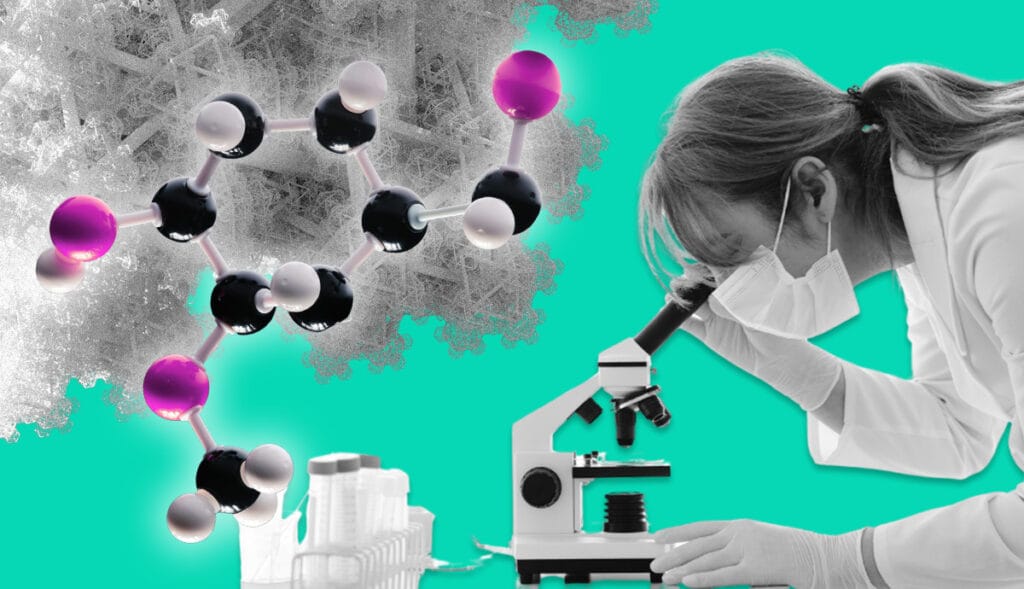
Cannabis is not traditionally regarded as a psychedelic, although it can be a potent psychedelic when certain variables align. Factors like the individual’s set and setting, tolerance, and cannabis type can determine whether the experience is typical, or, indeed, psychedelic.
There are books, online courses, ceremonial practices, and legitimate research all dedicated to the psychedelic cannabis experience. I’ve had many psychedelic experiences with cannabis that range from subtle effects, to experiences comparable with DMT trips. I’ve also witnessed people experiencing cannabis as if it were ayahuasca. However, these psychedelic-like effects arising from cannabis use are rare, because cannabis in all its varieties (and the people who consume it) are wildly diverse.
However, extreme psychedelic experiences are not necessary to deem cannabis psychedelic. In fact, cannabis has more multifaceted psychedelic chemistry than one might think. Before diving into the chemistry, let’s evaluate how cannabis is classified right now.
Cannabis is one of the most complex, widely consumed drugs due to its differentiated psychoactive chemistry, and classifying it is complicated. Although a drug class typically defines the type of drug it is, both NIDA and the WHO recently removed their authoritative online resources regarding the drug class cannabis falls within. Others, such as The Discovery Institute and IACP classify cannabis in its own drug class, which makes sense given its diversity.
All at once, cannabis bears depressant and sedative properties, along with stimulating attributes, and psychedelic or hallucinatory potential. Depending on the strain (of which there are thousands) and the tolerance and the unique biochemistry of the individual consuming it, the effects of the plant can vary wildly.
Cannabis is currently undergoing federal rescheduling, and deserves its own official drug class, too.
To determine if cannabis is a psychedelic, it is essential to understand what a psychedelic is and how it may differ from a purely hallucinogenic experience.
Psychedelics are a class of psychoactive substances that primarily influence the brain by altering perception, mood, and cognitive processes. While they are known for inducing hallucinations, not all hallucinogens are classified as psychedelics. The specific characteristics that define a psychedelic drug include:
Other natural plant-based hallucinogens that are not psychedelic include dissociatives and deliriants. Substances like Salvia Divinorum, Datura, Brugmansia, and Mandrake produce hallucinations, but primarily, cause a sense of detachment from reality and one’s body rather than the profound sensory and emotional alterations typical of psychedelics. Experiences from these plants are often characterized by confusion, a lack of insight, and a greater risk of dangerous behaviors. They can also be so toxic that they can become lethal, unlike plant-based psychedelics, which are generally non-toxic.
Simply, cannabis can be both (though it is typically neither). I’ve experienced both minor and major hallucinations from cannabis that were not inherently psychedelic, including hearing and feeling my phone ringing when it’s silent, seeing plants come alive, and movement from inanimate objects. Sounds and colors may be enhanced, and some visual distortions may occur, all of which are forms of hallucinations, but not necessarily psychedelic experiences.
As a researcher, educator, expert witness, and daily cannabis consumer for over 25 years, I’ve concluded that cannabis is also a psychedelic, not just a hallucinogen.
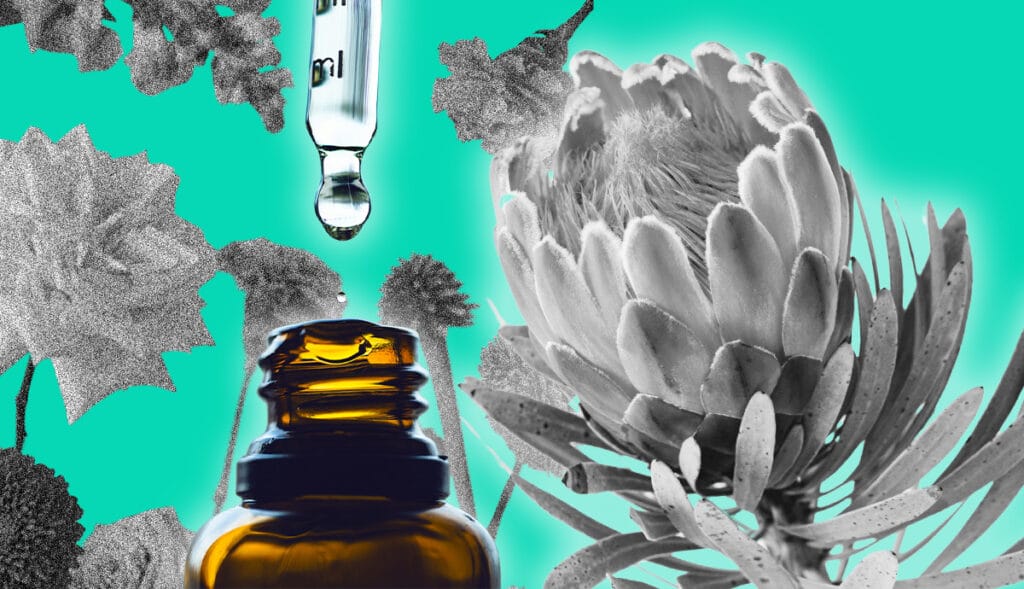
Achieving a true psychedelic state with cannabis depends on both experiential and scientific factors. Key elements include tolerance, the user’s intention, the specific strain of cannabis, its chemical composition, and how we categorize what makes a substance psychedelic. Each of these factors works together to shape the depth and nature of the experience, highlighting the complex interplay between personal mindset, biological response, and the characteristics of the cannabis used.
Tolerance: Cannabis tends to be more intense and psychedelic when you have a low tolerance to it. Many people report experiencing stronger, more hallucinatory effects when they first used cannabis. Taking a tolerance break can help recreate these experiences.
Intention: Structured intention plays a key role in enhancing cannabis’ psychedelic effects. Even with high tolerance, combining cannabis with meditation and ceremony can lead to intense experiences similar to other psychedelics. Mindfulness and a proper set and setting are crucial.
Strain: Choosing the right strain is important. Sativa or “narrow-leaf type” varieties with citrus and gas-like aromas are typically more psychedelic. Using tools like Interpening can help identify cannabis strains that will deliver the desired effects. The aroma type of narrow-leaf cannabis is typically hallmarked by citrus terpenes and ‘sulfuric thiols’ which smell like gas; Tropicanna Sulfur Compounds “TCSCs” (citrus-funk), and heterocyclics like indole with sharp chemical smells.
Indole is the core structural group of psychedelic tryptamines such as DMT, LSD, and psilocybin-bearing mushrooms, and surprise: it’s commonly found in cannabis, too.
Since indole is found in many cannabis strains, some might speculate whether it contributes to cannabis being psychedelic. Indole itself doesn’t cause psychedelic effects. It’s a foundational structure that forms part of many important compounds. It serves as a core structure for many biologically active compounds, including neurotransmitters like serotonin and several psychedelics.
However, indole serves as a scaffold that, when modified with specific functional groups, can interact with brain receptors to produce psychedelic effects. This is important because these receptors are linked to mood, perception, and classic psychedelic experiences.
This is where the complex chemistry of cannabis plays a role in defining what, indeed, constitutes a substance as psychedelic.
Indole is found in many naturally occurring psychedelics, such as 5-MeO-DMT and 5-HO-DMT, present in various plants and toad venoms. Ibogaine, which contains indole, is found in the root bark of the African plant Tabernanthe iboga. The psychedelic compounds harmine and harmaline, also containing indole, are found in the Banisteriopsis caapi vine, known as ayahuasca. With four psychedelic compounds containing indole within the brew of ayahuasca, it is evident that ayahuasca deserves to be listed among psychedelic indole-containing substances. Humans (including you) produce N,N-DMT, cannabinoids, and indole simultaneously.
Previous research has focused on indole, primarily, as an aromatic compound. However, further research is needed to fully understand the importance of indole beyond the aroma of cannabis alone.
“Indole is interesting for reasons far beyond the aroma. The indole structure is the core structure of many biologically important compounds within plants, humans, and animals alike. It is the key component of both tryptophan and melatonin, two important compounds found in the human body. It is also the main structural group of psychedelic tryptamines such as psilocybin, DMT, and LSD,” reports Abstrax Tech.
Research suggests the psychotropic potential of indoles is significant. Although phenethylamines primarily exert their effects through the activation of 5-HT2A receptors, indoleamines can have a significant behavioral component mediated by activation of similar 5-HT1A receptors.
While indole itself is not responsible for directly inducing psychedelic effects, its presence as a core chemical structure in both cannabis and traditional psychedelics hints at the deeper biochemical connections between these substances. The indole structure serves as a foundation for compounds that can influence serotonin receptors and other pathways linked to altered states of consciousness. As we continue to unravel the complex chemistry of cannabis, it’s possible that the full psychedelic potential of indole-containing compounds within the plant may reveal itself, bridging the gap between cannabis and classical psychedelics in ways we are only beginning to understand.
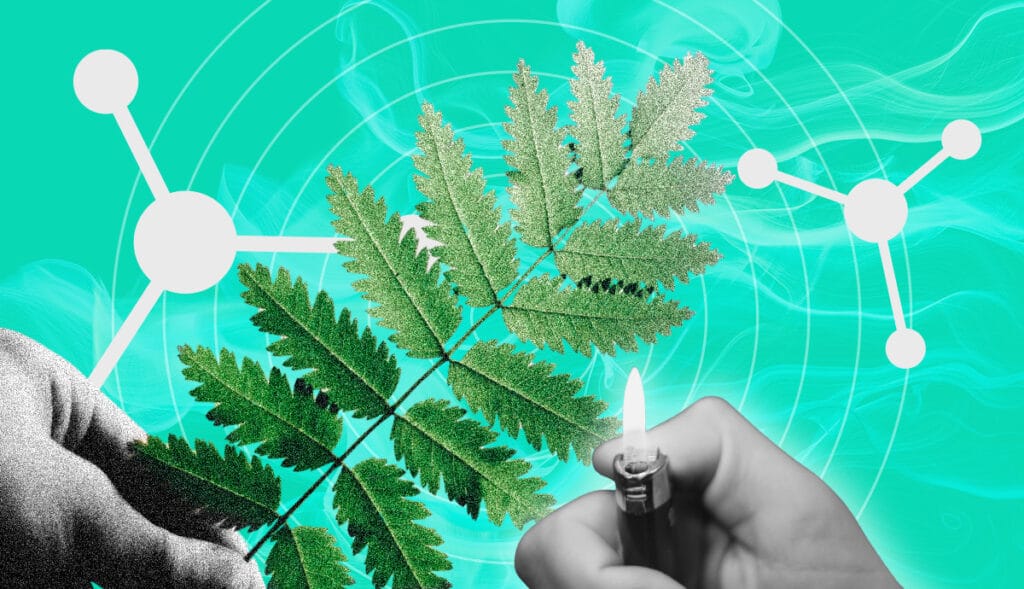
Recent studies suggest that THC, a non-selective cannabinoid receptor agonist, can upregulate 5-HT2A receptors, similar to classic psychedelics. High doses of THC, like those in concentrates like shatter or diamonds, can produce LSD-like effects, including hallucinations. Dr. Ethan Russo supports the idea that THC is hallucinogenic, while CBD counters these effects.
CBD, unlike THC, binds to the 5-HT2A serotonin receptor, which mediates psychedelic experiences like those from LSD or mescaline. Though THC does not bind directly to 5-HT2A, it activates CB1 receptors, which form complexes with 5-HT2A. This interplay may contribute to cannabis’s psychedelic effects.
Terpenes like β-Caryophyllene, linalool, and limonene also interact with 5-HT2A and CB1 receptors, potentially amplifying THC’s effects. These compounds contribute to cannabis’s overall psychotropic profile, indicating that cannabis’s full psychedelic potential may still be unfolding through continued research.
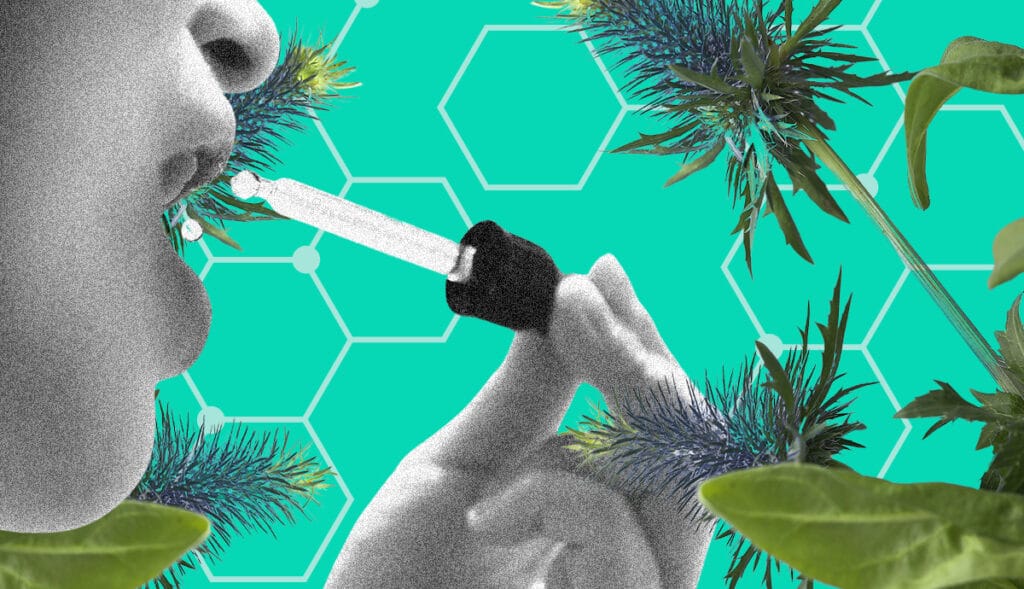
Cannabis is not currently regarded as a psychedelic in the mainstream or scientific sense – at least not yet. With substantial scientific and anecdotal evidence already present and more emerging, it wouldn’t be surprising to see cannabis officially classified as a psychedelic.
Barbra Bauer from Psychedelic Science Review states, “Although the psychedelic experience can be highly variable, cannabis and psychedelics, in general, have many effects in common. It’s important to remember that both cannabis and naturally occurring psychedelics like psilocybin mushrooms contain a cocktail of compounds, many of which have not been characterized.”
Natural psychedelics like ayahuasca, mescaline cacti, ibogaine, and magic mushrooms contain multiple compounds working together to produce dynamic effects. Similarly, cannabinoids and terpenes in cannabis interact with serotonin receptors, suggesting it has the potential to be classified as a psychedelic. With the right strain selection and a focused intention, cannabis can create profound sensory, cognitive, and emotional changes, making it potentially indistinguishable from a classic psychedelic experience.
Though Western science may not fully recognize humans as inherently psychedelic, practices like meditation and yoga often result in vivid, altered states without substances. Whether you agree or not, cannabis’s chemical profile and the psychedelic experiences it can induce hint that it may be more psychedelic than previously thought – and perhaps, so are we.
As the spectrum of interest in psychedelics broadens more every day, interdisciplinary connections become more important than ever. What is the Penn Psychedelics Collaborative?
In this episode, Joe interviews 4 members of the team: Co-Founder, Taylor Andrews Flatt, PMHNP; Associate Director, Victor Pablo Acero, Ph.D.; Professor in Fine Arts and Co-Director of the Weitzman School of Design, Jackie Tileston; and Executive Director and Director of the Penn Program for Mindfulness, Michael Baime, MD.
Recorded earlier this month at the PhilaDelic conference – one of the primary initiatives of the PPC – they discuss their paths to psychedelics and why this transdisciplinary collection of faculty, researchers, and clinicians at the University of Pennsylvania was so necessary. Viewing psychedelics from different perspectives (Flatt from nursing, Acero from bioengineering, Tileston from the art and mysticism side of things, and Baime from a more mindfulness point of view), their group is a case study in collaboration – a place where connections can be catalyzed and shared goals can be addressed from different angles. How far can we go when different groups start working together?
They discuss:
and more!
Pennpsychedelicscollaborative.org
Upenn.edu: Mystics and visionaries: A fine arts seminar
Glow-wacky.com (David Glowacki)
Nih.gov: Therapeutic Potential of Salvinorin A and Its Analogues in Various Neurological Disorders
The U.S. Drug Enforcement Administration (DEA) is poised to ban two psychedelic compounds, DOI and DOC, which could deliver a disastrous blow to psychedelic science and research if successful.
The United States is one of the most advanced societies because our visionaries have the freedom to innovate. That is, unless, we’re talking about drugs. The U.S. government has sweeping blinders on when it comes to researching and developing psychoactive compounds, especially hallucinogenic ones that target the 5-HT2A serotonin receptor.
Nearly every one of these classic psychedelics exists as a Schedule 1 illicit substance. And if the DEA has its way, the last remaining unregulated, DOI and DOC, will suffer the same fate.
A hearing this November, led by attorney Robert Rush Esq., will elucidate what comes next.
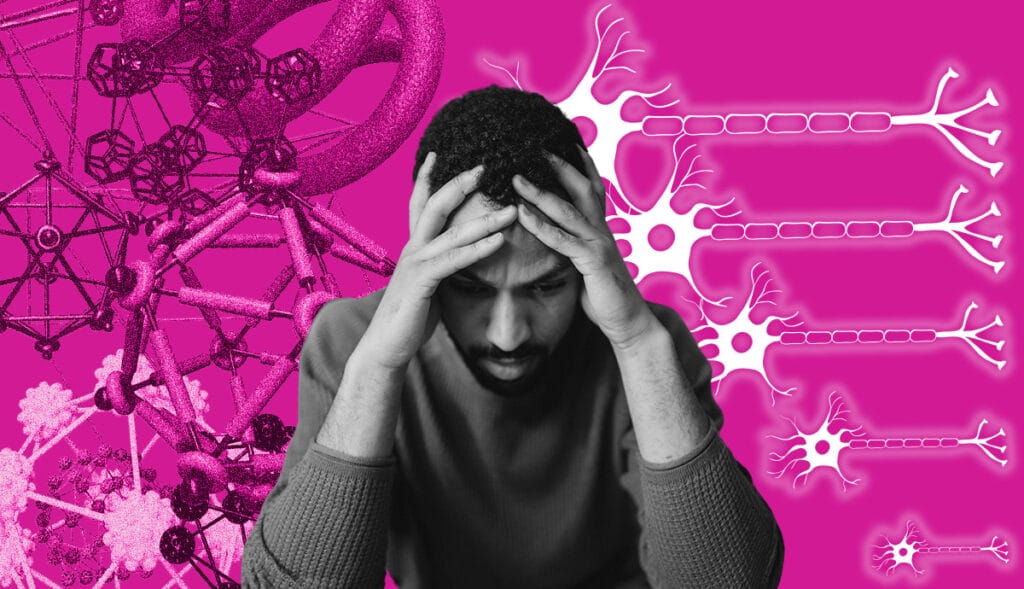
DOI (2,5-dimethoxy-4-iodoamphetamine) and DOC (2,5-dimethoxy-4-chloroamphetamine) are relatively obscure synthetic psychedelic compounds in the amphetamine class. They bind to and activate 5-HT2A receptors, just like psilocybin, LSD, and DMT, influencing everything from decision-making and pain-processing to gut function.
One property that makes DOI and DOC unique is their strength – only small dosages are reported to produce 20 to 36-hour trips.
Scientists are so fascinated by DOI and DOC’s mechanism of action that they’ve published nearly 1,000 papers on the substances. DOI, in particular, has been used to map 5-HT2A distribution in the brain and understand the receptor’s functions, including memory, learning, and sensory perception.
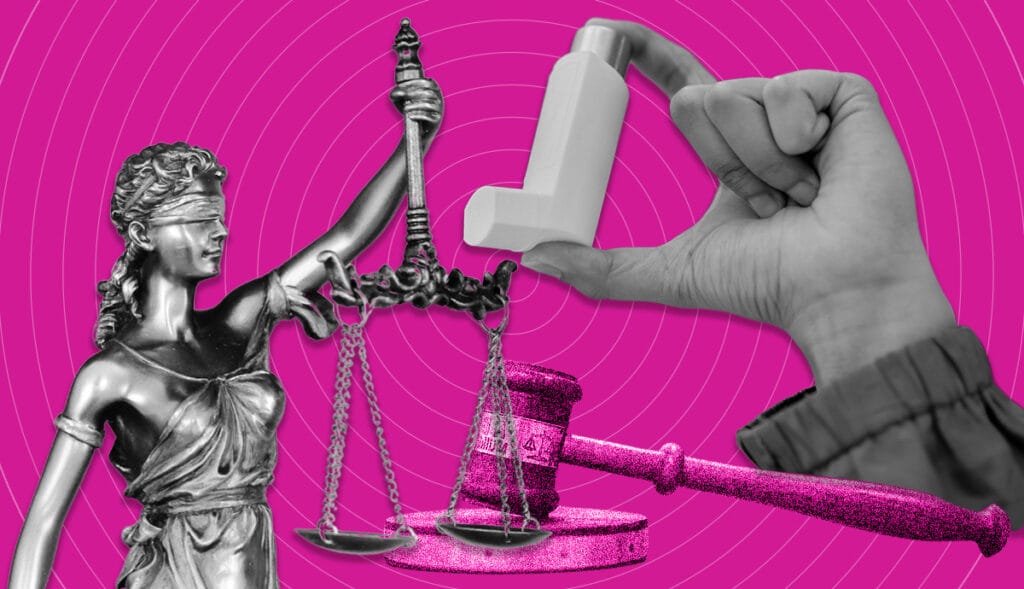
UC Berkeley neuroscientist Dr. Raul Ramos is one of many researchers actively studying DOI to uncover its value. The therapeutic research areas for DOI are vast and promising. They include its potential to reduce inflammation and improve cognitive function and flexibility – both critical for overcoming depression. Other possibilities include treating asthma and combatting fentanyl and alcohol addiction.
“It’s not a stretch to say that the results of my research could inform future therapies in humans,” Ramos told Psychedelics Today.
Ramos explained that scientists today can freely explore these substances for planned experiments or to test spontaneous ideas. However, a Schedule 1 Controlled Substances Act (CSA) designation will strip them of that liberty.
“It will stifle spontaneity and creativity. It will stifle progress,” said Ramos.
The DEA, however, takes a wildly different stance. In December 2023, the notoriously conservative organization initiated its second attempt to brand DOI and DOC as illegal, lacking any medical value and high abuse potential.
If the DEA’s legal effort succeeds, these compounds will be criminalized, and Dr. Ramos and other non-DEA registered scientists must immediately cease research. To restart, they’ll need to undergo a lengthy, cost-prohibitive process seeking institutional, federal, and state approvals, according to Ramos. Unfortunately, most unpublished work will never be see the light of day.
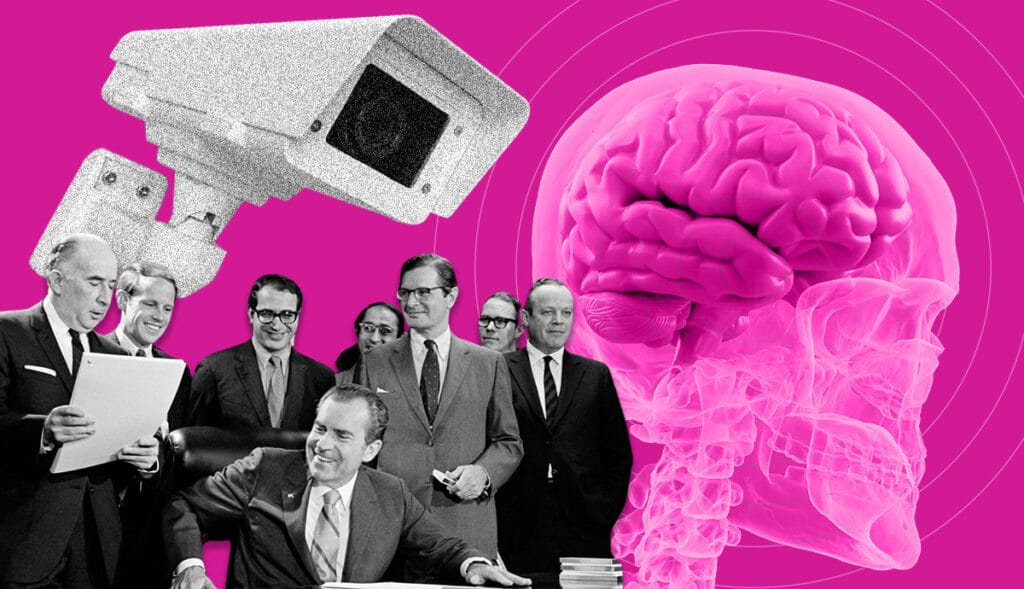
Fortunately, Ramos’ lawyer, Robert Rush, refused to let the DEA proceed without resistance.
“I was nervous that the scheduling would go through, so I connected with people who might be interested parties [in challenging the decision]. I filed the request for a hearing 30 minutes before the post office closed on the deadline. It came together at the last minute,” said Rush.
Rush filed a request on behalf of Ramos and two other academic researchers. Elijah Ullman, a molecular neuropharmacologist, filed a separate request for Students for Sensible Drug Policy (SSDP). David Heldreth, CEO of Panacea Plant Sciences (PPS), also filed a hearing request.
In a recent development, Administrative Law Judge Paul Soeffing denied the DEA’s request to block a number of witnesses, including experts from SSDP and Panacea Plant Sciences (PPS), from testifying at the upcoming hearing. While the judge granted some of the DEA’s motions to exclude specific evidence, this ruling represents a partial victory for the researchers and organizations challenging the ban. However, the judge noted that the relevance of the witnesses’ testimony would still be determined later during the hearing.
The hearing, which starts November 12, will draw prominent witnesses, including psychedelic researchers Dr. David Nutt and Dr. David Nichols, to present the case for DOI and DOC’s utility for developing new therapeutic drugs.
“I have many colleagues who work with these compounds who will testify in the upcoming hearing, and that is only a subset of the research community,” said Ullman, who has been interested in science policy since he was a teen.
Ullman added, “The DEA alleges that DOI and DOC should be placed in Schedule 1 because of their high potential for abuse, but this does not align with over 40 years of data.”
To his point, not one DOI or DOC use report existed before 2005. After 2005, the DEA registered only 45 DOI seizures across local, state, and federal registries throughout a 13-year period. DOC confiscations were more common but mounted to a mere average of 60 annually nationwide. Most reports involved small-scale seizures in forms like blotter paper or powder that do not even register a mention in the DEA’s 2024 National Drug Threat Assessment.
Adverse events linked to DOI and DOC are also scarce. The DEA referenced just three case reports of serious reactions in its Schedule 1 recommendation, including one death related to DOC and caffeine in a 37-year-old with a history of methamphetamine abuse. DOI was not included in any of these reports.
The DEA’s push to classify these substances as Schedule I, despite the small number of incidents, limited evidence of recreational use, and their admission that physical dependence is not an issue, suggests an overreaction rooted in dogma rather than legitimate concern.
“I believe data integrity matters in policy decisions, and since the data does not align with the DEA’s viewpoint that it should be scheduled, it should not be,” said Ullman.
Rush adds that DOI and DOC’s day-long trips make the compounds highly undesirable for personal use.
“No one is seeking a 36-hour psychedelic experience,” said Rush. “There is no illicit drug trade. No one really wants [DOI and DOC], quite frankly.”
No one, except researchers, who assert that the compounds have transformed their understanding of brain function and disease. They’ve helped us learn that serotonin receptors are “much more than a ‘feel-good’ chemical,” according to Ullman.
“There’s incredibly cool data from Charles Nichols’ lab at Louisiana State University showing a reduction in airway inflammation in rodent asthma models with doses significantly less than that one that causes intoxication… A whole new class of anti-asthma medicines could arise because of DOI research, improving millions of lives worldwide.”
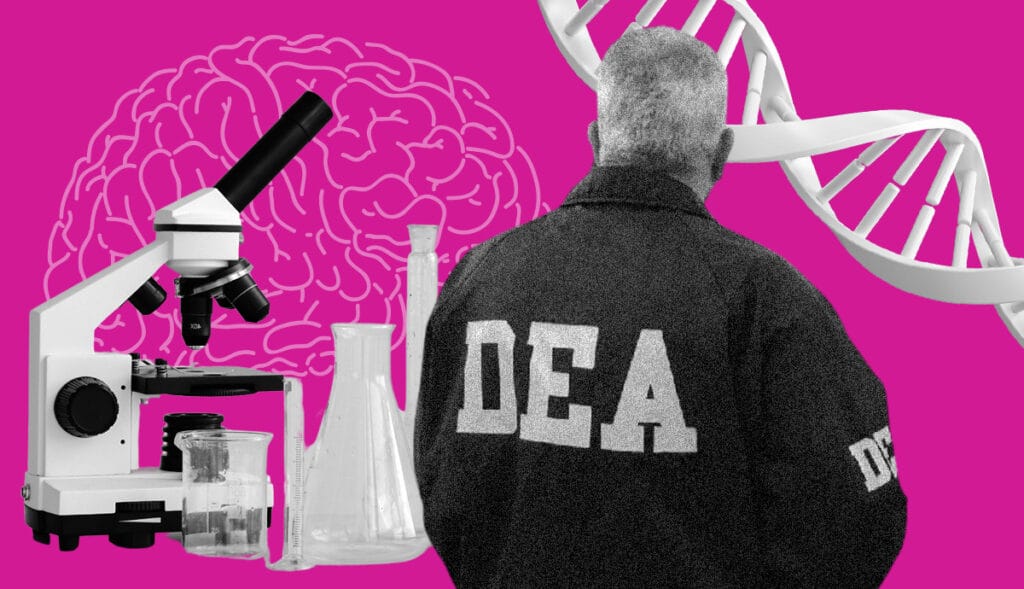
Rush and Phelps will present significant evidence during the 10-day hearing next month to counteract the DEA’s claims. Afterward, the judge will make his non-binding recommendation and send it to the administrator. Then, it’s up to the DEA to decide.
The recent ruling denying the DEA’s attempt to block key witnesses further bolsters the opposition’s case, adding momentum as they prepare to present evidence and testimony.
If the judge finds in the petitioners’ favor, the administrator could adopt the judge’s ruling
“There’s always a chance the DEA could do the right thing,” said Rush.
However, it could also ignore a favorable ruling and proceed with scheduling. If that happens, Rush said he will not give up. The next step will be to move forward with litigation, where he will challenge the organization’s rule-making authority in court.
“We have to check the DEA’s excessive power,” said Rush.
The DEA has been extraordinarily aggressive in scheduling psychoactive drugs since establishing the Controlled Substances Act of 1970, and if history repeats, DOI and DOC will not be spared. We’ve seen that their attempts to control chemicals have exacerbated cartel violence, spurred countless unjust arrests, and stifled scientific progress, especially regarding psychedelics and mental health interventions. Let’s hope sensibility and freedom win this time.
Want to show your support for the cause? Consider donating to SSDP to help them raise funds to bring the case’s witnesses, all university researchers, to the 10-day hearing.
The psychedelic space was dealt a huge blow when the FDA decided not to approve MDMA-assisted therapy for PTSD under Lykos’ proposal. Was the FDA fair to Lykos? And what are the next steps for Lykos and MAPS?
In this episode, Joe interviews Rick Doblin, Ph.D.: founder and president of the Multidisciplinary Association for Psychedelic Studies (MAPS), and former board member at Lykos Therapeutics, MAPS’ public benefit subsidiary.
Doblin tells his side of the story: that the FDA’s concerns with double blinding not working had been fully addressed ahead of time, that they had negotiated agreements that were no longer agreed to when new FDA employees came on board, that there was a lot of confusion from going back and forth with the FDA on how Phase 3 studies should be designed, and more. He believes that Lykos made a massive mistake in assuming that provable science was more important than public opinion, and that ignoring critics who were saying whatever they wanted caused them to lose control of the narrative – which clearly influenced the advisory committee. While Lykos figures out their next steps with the FDA, MAPS is focusing their attention on what they feel is most important in light of this ruling: better public education and drug policy.
He talks about:
and more!
MAPS has announced that 2025’s Psychedelic Science conference will be in Denver, June 16-20, and will have experiential opportunities before and after. If you’d like to donate to MAPS, please do so here.
MAPS Podcast- Episode 33: Matthew Baggott – Beyond Fear – MDMA and Emotion
Psychedelicalpha.com: Exclusive: David Hough on Lykos’ Path to Resubmission
Imdb.com: Of Night and Light: The Story of Iboga and Ibogaine
Have you ever hit a creative roadblock on a project or a problem you need to solve? Chances are, there might be a psychedelic for that.
Despite their recent focus on medical and mental health benefits, psychedelics have long been linked to creativity and insight. And in light of the FDA’s recent decision to withhold approval for MDMA-assisted psychotherapy, it’s become more important than ever to cultivate a wider view around psychedelics and their potential to shape and influence our lives.
The exploration of psychedelics as tools for creative breakthroughs offers profound potential to expand our understanding of how these substances influence the human mind beyond their medical and therapeutic applications. In the Vital psychedelic training program, we incorporate these ideas, especially for those pursuing careers as coaches and wellness practitioners.
Throughout this article, we’ll examine how these substances have been used to help people boost creativity, gain insights, and enhance problem-solving abilities – and the science behind it.
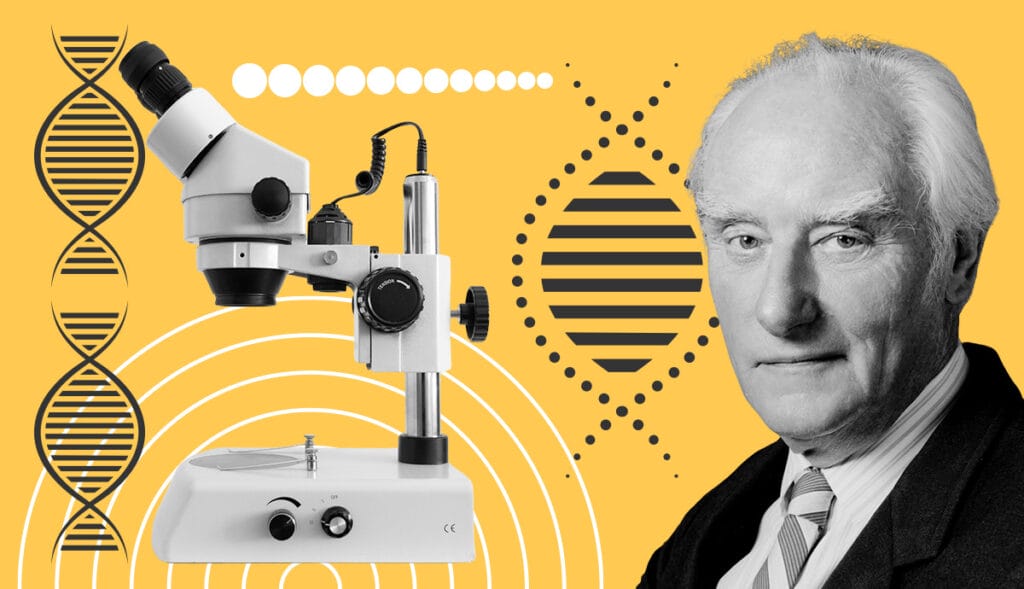
Whether encountered through a sudden flash of insight in “Eureka!” moments, or through a lengthy process of deep ideation, creativity is a mysterious force that allows us to connect information in new and unexpected ways. Often, it can lead to new understandings that help us adapt to an ever-changing world.
Historically, psychedelics have long played a role in inspiring creative genius and fostering insight. From Beat poet Allen Ginsberg, whose iconic poem “Howl” was inspired by his psychedelic experiences, to Nobel laureate Francis Crick, who credited LSD with helping him discover the structure of DNA, these substances have shaped some of the most influential minds in history. Even Steve Jobs described LSD as “one of the most important things” he did in his life, underscoring the transformative role psychedelics have played in sparking innovation and artistic expression.
Biochemist Kary Mullis credits his use of LSD in playing a vital role in his discovery of how to automate the polymerase chain reaction (PCR), a pioneering breakthrough which earned him the Nobel Prize in Chemistry in 1993.
Although the discovery did not come about while directly under the influence of LSD, it helped him to “inhabit” DNA molecules from a new perspective.
“PCR’s another place where I was down there with the molecules when I discovered it and I wasn’t stoned on LSD, but my mind by then had learned how to get down there. I could sit on a DNA molecule and watch the polymerase go by,” Mullis said.
More recently, astrobiologist Bruce Damer came out of the psychedelic closet, sharing how psychedelics, in combination with other consciousness-expanding practices, helped him arrive at what is now a widely cited hypothesis on the origins of life.
“My own story is that an interweaving of endogenous preparation and meditation combined with a low dose of ayahuasca led to a breakthrough to the scientific question of how life could have begun on the Earth, four billion years ago. The telling of this story led to the formation of the Center for MINDS,” he explained.
A newly formed nonprofit, MINDS is dedicated to exploring how psychedelics and other consciousness-expanding practices can play a role in creative problem solving to help our species find innovative solutions to the polycrises of our time.
Unlike other psychedelic organizations, MINDS is focused on what they refer to as “psychedelic-assisted innovation” as an emergent practice that could serve to revitalize the public perception of the value of psychedelics and a yet to be explored path to regulatory approval.
Damer outlines what he perceives as the current pathways to psychedelic access and regulation, including Indigenous and cultural use; personal growth and expression; and therapeutic applications, calling for a so-called “fourth path” in psychedelic research and discourse, utilizing them as tools for creative breakthroughs in science and technology.
“We believe that a next step beyond the therapeutic applications of psychedelic practices is their use as elixirs of creativity. MINDS hopes to validate their effects through science and valorize their practice in our society through established protocols,” Damer told Psychedelics Today.
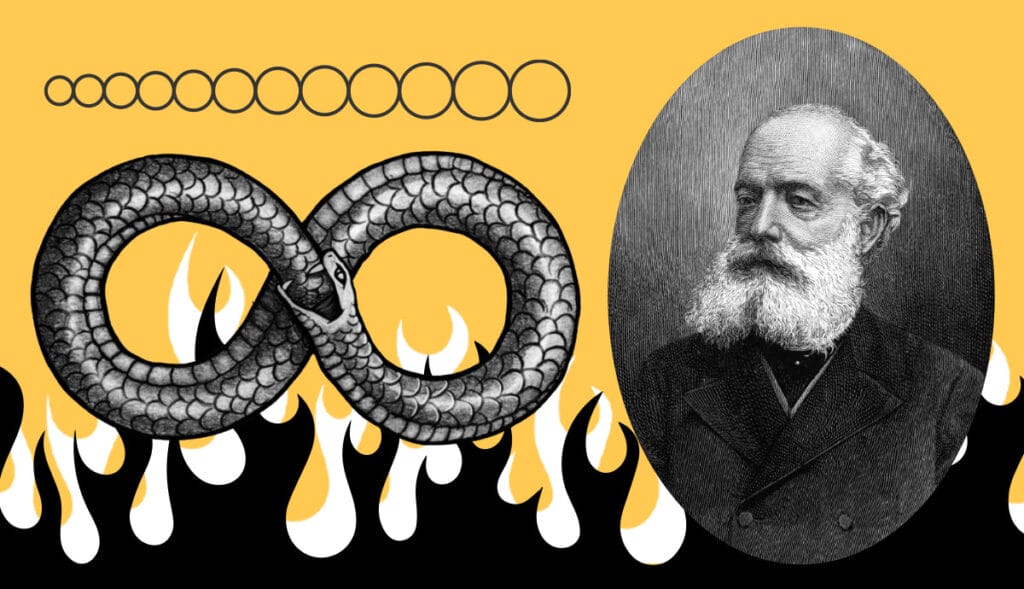
Throughout the ages, mystical, non-ordinary states of consciousness such as dreaming and hypnagogia (the liminal state between wakefulness and sleep) have been linked to creative insight across cultures and disciplines. These states have played a major role in scientific breakthroughs, artistic expression, and technological innovation.
Chemist Friedrich August Kekulé was famously dozing off by his fireplace when he had a vivid vision of molecules transforming into snakes. In this vision, one of the snakes twisted into a circle, forming an ouroboros, a serpent devouring its own tail. This image inspired him to understand that the chemical structure of benzene was, in fact, a closed ring.
Such naturally occurring non-ordinary states of consciousness are similar to psychedelic states in that they allow for a heightened capacity for mental imagery and visualization, sharing more fluid, free-flowing, imagistic, and highly associative patterns of consciousness.
Referring to how individuals like Nikola Tesla envisioned the electric generator and Albert Einstein uncovered the basic principles of his special theory of relativity in non-ordinary states of consciousness, psychiatrist and founding father of transpersonal psychology Stanislav Grof explains, “It is a well-known fact that many important ideas and solutions to problems did not originate in the context of logical reasoning, but in various unusual states of mind – in dreams, while falling asleep or awakening, at times of extreme physical and mental fatigue, or during an illness with high fever.”
A 2022 paper on psychedelics as tools for creative insight examined the way in which dreaming and hypnagogic states overlap with the psychedelic experience, shedding light on shared neurophenomenological and cognitive processes. They suggest that one key feature of creativity is our capacity to have fluid and flexible cognitive processes, shifting between modes of thought such as divergent and convergent thinking. That is, our ability to come up with as many different solutions as possible to a loosely defined problem, versus coming up with a single solution to a well-defined problem.
The authors conclude that, “The psychedelic state may have its own characteristic features making it amenable to creativity enhancement, such as brain hyperconnectivity, meta-cognitive awareness, access to a more dependable and sustained altered state experience, and potential for eliciting sustained shifts in trait openness.”
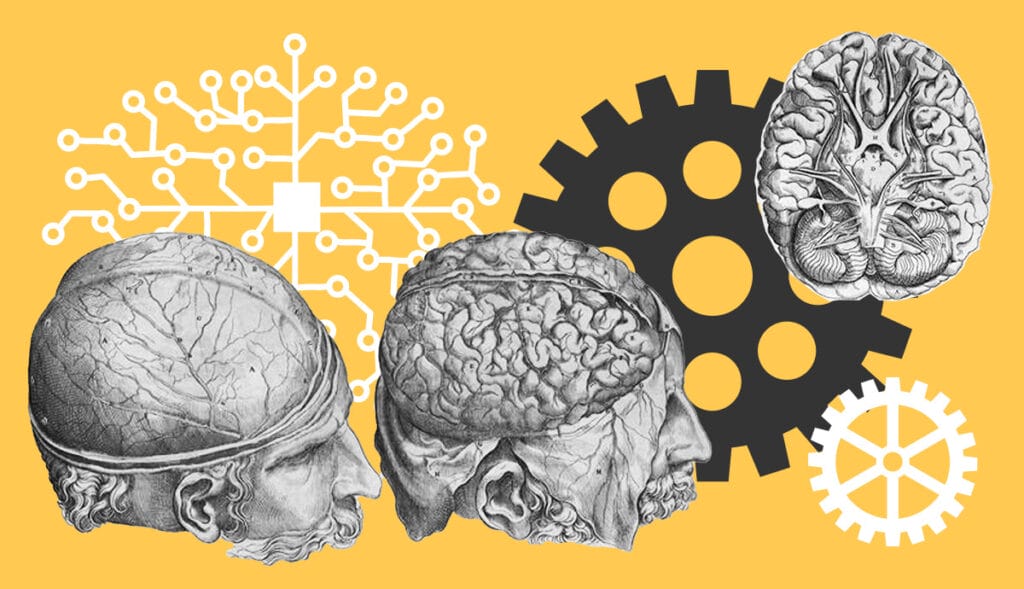
In 1966, shortly after LSD was criminalized in the state of California, researchers Willis Harman and James Fadiman published a groundbreaking study examining the role of psychedelics in creative problem-solving, finding that psychedelics were able to enhance creativity.
A group of 27 professionals, including engineers, architects, and mathematicians, were dosed with LSD or mescaline, then put into small, carefully curated working groups. In preparation for the experiment, each participant was instructed to choose one (or more) problems related to their work that required a creative solution.
Participants were able to find solutions to certain problems they had been working on for weeks – and in some cases months – reporting decreased feelings of inhibition, a greater ability to conceptualize the problem in a broader context, enhanced ideation, and heightened capacity for visual imagery.
“I worked at a pace I would not have thought I was capable of. My mind seemed much freer to roam around the problems, and it was these periods of roaming around which produced solutions… I dismissed the original idea entirely, and started to approach the graphic problem in a radically different way. That was when things began to happen. All kinds of different possibilities came to mind,” said one participant.
The first study of its kind, it is not considered as scientifically rigorous as today’s double-blind, placebo-controlled standards – participants were positively primed for the experience by being instructed that the substances would help enhance their creativity. Even so, it suggests that psychedelics do have the ability to enhance creative problem-solving (set, setting, and intentionality permitting).
A 2016 study explored ayahuasca’s effects on creativity, finding that the brew enhanced performance on tasks related to divergent thinking, while convergent thinking decreased. This impaired ability for convergent thinking is thought to be related to the large dosage of substance given and the strong, sometimes disorienting experiences it can produce.
Compared with practices like microdosing, it has been suggested that higher doses might limit cognitive processing abilities, being potentially too distracting to focus on specific problem-solving activities.
Another study measured psilocybin’s effect of convergent and divergent thinking, finding that even though participants reported feeling more creative, they performed worse on tasks measuring both types of creativity during the experience. However, a week later, when compared to the placebo group, those who ingested psilocybin scored higher on convergent creativity.
It is thought that this could be linked to the way in which psychedelics dampen the activity of the default mode network (DMN), an interconnected group of brain regions associated with introspective functions and internally directed thought, such as self-reflection, and self-criticism during the experience itself. After the acute phase of a psychedelic experience, the DMN connectivity is reconsolidated in a new way, producing neuroplastic changes in the brain, possibly leading to increases in creativity.
The practice of microdosing has also been celebrated for its perceived ability to enhance creativity, being widely used among Silicon Valley tech workers. However, up until recently, the link between microdosing and creativity remained anecdotal. A 2018 study by researchers at Leiden University, gave psilocybin-containing truffles to attendees at a microdosing event hosted by the Dutch Psychedelic Society, inviting participants to take part in two creative problem-solving tasks to measure their divergent and convergent thinking skills. Findings showed that participants scored significantly higher on both convergent and divergent thinking tests after ingesting a microdose.

On the level of personality, psychedelics have been shown to produce enduring openness to new experience. A 2018 study conducted by researchers at Imperial College London, examined the effects of psilocybin on personality structures in patients suffering from treatment-resistant depression. Researchers gave patients two doses of psilocybin a week apart from one another in supportive settings, assessing personality at baseline and then again at a three-month follow-up.
Although the study didn’t directly set out to understand the connection between psychedelics and creativity, it found that psilocybin produced increases in trait “openness” which is linked to “new ideas and values, imagination, aesthetic appreciation, novelty-seeking, non-conformity, and creativity.” However, researchers suggested that such increases in openness might also be linked to psychedelic-assisted therapy specifically.
Another key feature of the psychedelic brain state is increased global connectivity – enhanced communication between brain regions and networks. This shift may underlie the fluid and unconstrained thinking associated with psychedelics, promoting novel perspectives and creative insights.
Psychedelics are also known to induce a state of higher brain entropy, marked by more dynamic and less predictable brain activity, which opens up a greater range of brain states. This “anarchic” state, described in the REBUS model (Relaxed Beliefs Under Psychedelics), reduces reliance on prior beliefs and expectations, fostering a richer conscious experience that can enhance creative thinking. By loosening preconceptions – often barriers to creativity – psychedelics may help the mind break free from conventional thought patterns, although this can also diminish the ability to critically evaluate ideas.
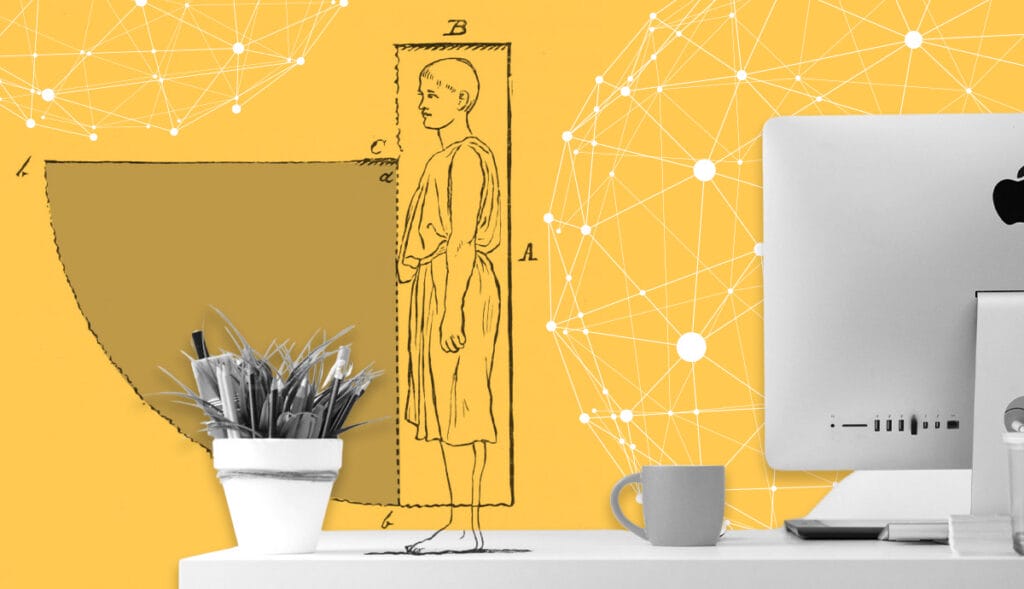
One important question to factor when considering creative insights and solutions born from psychedelic reveries is: whether such downloads hold true and find congruence within larger bodies of knowledge, or not.
In a recent scientific review paper, researchers suggest that in the psychedelic state the subjective experience of creative enhancement may not “match the actual ‘quality’ of insights or realizations under the drug – as judged by others.”
As with dreams, psychedelic experiences are often replete with symbols, imagery, and impressions that do not necessarily have a fixed or simple meaning. As with any other type of psychedelic journey, it is important to emphasize the period of integration in which mystical, ineffable insights are carefully distilled into real-world understanding and enduring change. In the case of using psychedelics for creative problem-solving, this process of integration would have to coalesce with larger scientific and industry protocols, continually revisiting, testing, and refining insights through processes of peer review.
In Vital, we stress the importance of discernment and integration when working with these substances. Our program trains participants to support clients in not only navigating the psychedelic experience itself but also in applying their newfound perspectives in a grounded, practical way.
In the past, psychedelics have been heralded as a “magic bullet” or “cure all” for mental health diagnoses as well as looked to as a way to resolve the climate crisis through their ability to shift our relationship with the natural world. In looking to psychedelics as tools for creative problem-solving to help us meet the multiple existential crises that we are facing as a species, it is critical that we tread with caution, not becoming overly zealous in our desire to exalt psychedelics as a simple solution to our collective problems. No doubt, when used with care, they can serve to help us along the path, but only represent one tool in a cadre of others.
Cluster headaches are considered to be the most severe pain a person can experience. With scarce research and no funding, citizen-led science has taken over, and sufferers may have discovered the answer: psychedelics.
In this episode, Joe interviews Joanna Kempner, Ph.D.: associate professor in the Department of Sociology at Rutgers University and author of the recently released, Psychedelic Outlaws: The Movement Revolutionizing Modern Medicine.
The book profiles the history and groundbreaking work of ClusterBusters, a nonprofit researching and spreading awareness about what someone named Flash discovered decades ago: that for some people, psilocybin and LSD could stop cluster headaches from coming on. Through early internet message board posts and email exchanges between Bob Wold, Rick Doblin, and others, Kempner pieced together their story. And through attending ClusterBusters meetings, she discovered that a lot of the true healing lies in the bonds formed and the hope people find when seeing something new work for a pain for which science has no answer.
She discusses:
and more!
Psychedelic Outlaws: The Movement Revolutionizing Modern Medicine, by Joanna Kempner, PhD
Not Tonight: Migraine and the Politics of Gender and Health, by Johanna Kempner
Nih.gov: Response of cluster headache to psilocybin and LSD
Allianceforheadacheadvocacy.org: Headache on the Hill
PT336 – Sisi Li, Ph.D. – Porta Sophia: Psychedelic Prior Art
ClusterBusters Inc. YouTube: Psychedelic Outlaws Book Club – Week 1
*Amazon links are affiliate links, meaning that Psychedelics Today will receive a percentage of the sale
Rumination, or repetitive self-focused thought that’s typically critical and/or negative, is at the heart of many psychiatric disorders. Could psychedelics and psychedelic-assisted therapy help?
In this episode, Chris Koddermann interviews two members of the Center for the Neuroscience of Psychedelics at Mass General Hospital: founding director, author, and co-founder of three drug development companies, Dr. Jerry Rosenbaum; and psychiatrist and associate director and director of cognitive neuroscience, Sharmin Ghaznavi, MD, Ph.D.
Rosenbaum and Ghaznavi bonded over an interest in rumination, and wondered: How could the plasticity-inducing effects of psychedelics change these negative loops people find themselves in? How important is the ability to break out of those loops – and learn new patterns – when our concept of self is so central to who we are? Ghaznavi is studying the effects of psilocybin on rumination and scanning patients at multiple times throughout the process to track data we still don’t really have: how psychedelic-induced neuroplasticity changes over time, and why.
They discuss:
and more!
The Center for the Neuroscience of Psychedelics
Psypost.org: Therapeutic alliance plays a key role in MDMA-assisted psychotherapy for PTSD
*Amazon links are affiliate links, meaning that Psychedelics Today will receive a percentage of the sale
The path of the psychedelic renaissance has largely touched on the aspects of therapy, personal growth, and initiation rites, but now, the relationship between psychedelics and creativity is being studied more and more. Can psychedelics really increase intellect, novelty, and problem solving?
In this episode, Joe interviews Dr. Bruce Damer: astrobiologist with a long history of work at NASA, and now the president and co-founder of the Center for MINDS, a new nonprofit researching the best ways to improve creativity and problem solving.
He talks about how we’re losing our best creative minds to hyper-specialization, and while there is lots of research pointing to psychedelics as creativity-enhancers, we need to develop frameworks and protocols to be able to measure exactly how that works, and the best ways to encourage better results. The Center for MINDS is sponsoring research while running its own three year project studying creativity in a naturalistic setting, and aims to answer: How do we unlock more genius? What’s the main driver for novel thinking?
He discusses:
and more!
The steps the Center for MINDS will take in studying psychedelics and creativity will largely be steered by people’s personal stories, so please share yours with them by filling out their survey. What has worked for you? What is your personal protocol?
Lucid.news: Downloads from the Modern Dawn of Psychedelics
Psychedelicsalon.com: Bruce Damer
The Doors of Perception and Heaven and Hell, by Aldous Huxley
Healthline.com: What Is Hypnagogia, the State Between Wakefulness and Sleep?
Sagepub.com: Psychedelic Agents in Creative Problem-Solving: A Pilot Study
Lucid.news: A Psychedelic Journey to the Origin of Life
YouTube: ESPD ’55 Dr. Bruce Damer presents It’s High Time For Science (5/25/2022)
Nature.com: Papers and patents are becoming less disruptive over time
PT256 – Matthew D. Segall, Ph.D. – Consciousness, Capitalism, and Philosophy
*Amazon links are affiliate links, meaning that Psychedelics Today will receive a percentage of the sale
In this episode, Joe and REMAP Therapeutics Founder, Court Wing, host Lynn Watkins: medically retired USAF JAG & Ops Resource Mgmt Specialist; and C.J. Spotswood, PMHNP: principle psychiatric clinician at REMAP Therapeutics, and author of The Microdosing Guidebook: A Step-by-Step Manual to Improve Your Physical and Mental Health through Psychedelic Medicine.
Watkins tells her story of 20+ years of chronic pain: from Complex Regional Pain Syndrome brought on by a severed nerve to multiple foot surgeries, chest pains, cognitive issues, the inability to move her toes, burning mouth syndrome, and more, which unsurprisingly resulted in depression, anxiety, and being unable to work. Wing and Spotswood talk about their initial assessment, how they figured out how to work with her and her multitude of medications, and the incredible success they saw when combining practiced techniques, neuromodulation, and regular assessments with neuroplastic windows brought on by psilocybin.
They discuss:
and more!
Mayoclinic.org: Complex regional pain syndrome
Mayoclinic.org: Burning mouth syndrome
Nih.gov: Chronic pain and psychedelics: a review and proposed mechanism of action
PT322 – Kimberly Juroviesky, Capt., USAF, Retired – Ketamine and Complex Regional Pain Syndrome
*Amazon links are affiliate links, meaning that Psychedelics Today will receive a percentage of the sale
Following the multi-decade regulatory pursuit, legal MDMA-assisted therapy (MDMA-AT) seemed imminent to many people. In February 2024, the FDA accepted Lykos Therapeutics’ New Drug Application (NDA), and all markers indicated a likely approval.
However, on June 4, the Psychopharmacologic Drugs Advisory Committee (PDAC) shattered optimism when nearly all members advised the FDA to reject Lykos’ application.
In a 9-2 and 10-1 vote, the committee asserted its belief that MDMA therapy, as it stands, is neither effective nor safe for Americans with PTSD.
So, what is MDMA’s FDA approval status following the hearing?
The outlook seems grim, given that the FDA aligns with the advisory panel 88% of the time. Still, Lykos (formerly MAPS Public Benefit Corporation) remains hopeful.
“We believe there is a path forward and are focused on collaborating with the FDA as they continue to review our NDA over the months,” said Lykos in an email interview.
A final decision on MDMA for PTSD is expected on or around August 11th.

Starry-eyed psychedelic proponents didn’t see the dissent coming. The FDA had just granted Lykos’ NDA priority review, and everything seemed to be going smoothly.
However, the contention became clear on March 26, when the Institute of Clinical and Economic Review (ICER) published draft evidence on MDMA-assisted therapy for PTSD. In the report, ICER acknowledged MDMA’s potential to help people heal from trauma. However, it raised significant concerns about weaving this novel treatment into traditional medicine.
The TLDR of the report’s criticism was that Lykos’ clinical evidence did not sufficiently support MDMA therapy for PTSD. The report cited alleged data validity issues, potential biases from therapists and participants, and a reported incident of sexual misconduct. It also highlighted MDMA’s cardiovascular risks, unexamined adverse events, and lack of long-term data proving the therapy’s enduring effects.
A month later, five people submitted a citizen petition to the FDA commissioner requesting the organization convene an advisory committee meeting on MDMA-AT to discuss the application’s “shortcomings and risks.” The letter also called for an extended public comment period prioritizing concerned speakers, and a live webcast.
The letter’s primary claim against the NDA was that MAPS/Lykos allegedly “manipulated clinical trial data to hide adverse events from regulatory agencies, motivated in part by a belief that these agencies would not understand that these adverse events are a necessary part of their MDMA-AT.”
The FDA responded to the petition by granting the advisory committee meeting with an extended comment period. However, it denied the request to prioritize input from concerned stakeholders.
June 4th’s meeting was a nine-hour saga, inviting FDA members, public participants, Lykos representatives, and eleven PDAC panelists to debate the risks and benefits of MDMA-assisted therapy.
PDAC boasted various roles in the psychopharmacologic field, including consumer representatives, pharmacists, patient representatives, scholars, and physicians. It did not include experts from the field of psychedelic research. Nevertheless, by 5:30 p.m., the board confidently dismissed MDMA-AT’s ability to do more good than harm for PTSD.
Lykos told Psychedelics Today that they didn’t see the rejection coming.
“Going into the meeting, we knew this was a unique assignment for the panel to review a drug-plus therapy combination. We did, however, believe that the fact that studies showed MDMA-assisted therapy offers statistically significant and clinically meaningful improvement in PTSD symptoms and functional impairment compared to placebo across two phase 3 trials with evidence of durability over time would compel the panel to support approval.”
MAPS / Lykos’ second Phase III Trial (MAPP2) found:
Despite the clinically impressive results, PDAC emphasized significant doubts about the data’s validity and MDMA-AT’s overall safety.
Functional unblinding occurs when participants or researchers accurately predict the treatment they receive or administer. Expectation bias occurs when someone anticipates a particular result. Prior experience, previously held beliefs, and functional unblinding can cause such biases, potentially impacting patient experiences and reporting.
Dr. Paul Holtzheimer from the National Center for PTSD said, “Expectation bias can work in two ways. It can exaggerate the effect of the active treatment and blunt the effect of the placebo treatment.”
It’s true that 40% of the trial participants used MDMA in the past and may have assumed the drug worked based on prior positive experiences.
However, as Lykos points out in a recent statement, “The data indicates that prior illicit MDMA use had no impact on the results, as there was no meaningful difference in primary outcome measure or adverse events reported between the subgroup of Phase 3 participants who reported prior illicit MDMA use and the subgroup of participants who did not.”
Functional unblinding impacts, however, are far more debatable.
Renowned psychedelic drug researcher Matthew Johnson, PhD, explained Lykos’ unblinding problem in a recent X post.
Johnson said, “For those [in the study] thinking they got MDMA, the therapeutic effect was nearly identical between MDMA and placebo [groups]. Yikes.”
In other words, people who guessed they were on MDMA achieved similar therapeutic responses, whether or not they really took the drug.
Still, Johnson points out in The Illusion of Consensus podcast that functional unblinding is not a new issue for psychedelics, nor is it unique.
“There are a whole host of drugs that have been [FDA] approved. All of the sleep drugs… all of the anti-anxiety benzodiazepines, all the ADHD drugs… all of the opioid pain relievers. The practice of psychiatry is filled with psychoactive drugs that have very clear signatures… I want to know to what degree in FDA advisory panels this [functional unblinding issue] has come up… Because cutting through the blind is an issue for all these [compounds]… I don’t think psychedelics should be held to a higher standard than the normal process.”

Potential misconduct during the MAPS / Lykos trials added to PDAC’s concerns about the integrity of the results.
Allegations included reports that principal investigators:
PDAC also lamented the trials’ insufficient data on patients with severe trauma as well as an overall lack of diversity, citing low Black and Asian representation.
Dr. Melissa Barone, a psychologist from the Maryland Healthcare System, said, “There are so many problems with the data that each one alone might [be okay]… But when you pile them up on top of each other… I think there are still a lot of questions about how effective the treatment is and how durable it is.”
At least some of the mistrust centered on the perception that Lykos and MAPS founder Rick Doblin, PhD, are determined to push MDMA approval at any cost.
Lykos says, “Like all research sponsors, Lykos and its clinical sites are subject to regular FDA inspections. We have full confidence that the FDA will continue to assess the integrity of Lykos’ research through its inspection process.”
Lykos’ clinical trials show that MDMA-assisted therapy exhibited durable therapeutic effects for at least six months. However, PDAC questioned the claim for several reasons.
One was that patients utilized other integrative treatments in between MDMA therapy and the follow-up analysis, including:
The committee expressed that these therapies introduced “confounding factors,” which made it challenging to isolate MDMA-AT’s specific impact.
Meeting chair, Dr. Rajesh Narendran, added more skepticism. He said, “I’m not convinced that this drug is effective in the short term… PTSD is a disorder where symptoms can fluctuate quite a bit. We all know that. And I feel like there should have been more repeated assessments over time to gauge where these people are heading.”
Lykos’ unique psychotherapeutic approach was another confounding factor impacting the data, according to PDAC.
The FDA does not regulate psychotherapy, so this sticking point was beyond the meeting’s scope. However, several participants expressed distrust over what they perceived as an unstandardized and unproven modality.
In reality, Lykos utilized an approved framework described in its MDMA-Assisted Psychotherapy for PTSD manual. The approach is a non-directive, inner healer method that facilitates patient-led trauma processing.
It employs standard protocols like Exposure Therapy, Cognitive Processing Therapy (CPT), EMDR, and psychodynamic therapy. It also invites less conventional techniques, like Internal Family systems (IFS), Voice Dialogue, Hakomi, virtual reality, and Buddhist psychology.
Dr. Holtzheimer said, “I think the challenge here is that the psychotherapy in this case is not evidence-based yet.”
Dr. Barone added, “MDMA is not administered without the psychotherapy. And the psychotherapy is really vague. It is not well-determined. It seems like it was not standardized. And that makes it really hard to determine how effective it is…”
PDAC argued that the lack of standardization raises questions about the trials’ reproducibility and reliability. They also questioned the necessity of the therapy itself, wondering whether MDMA alone could elicit similar benefits.
Dr. Amanda Holley, a pharmacologist who previously worked at the FDA, explained this challenge in a recent Psychedelics Today Podcast.
“[The FDA] is having a hard time disentangling the contribution of therapy vs just MDMA. With this trial, they would’ve liked to see a factorial design that [tested] the therapy with the drug, an arm with the drug alone, and an arm with therapy alone. That would’ve given them a more holistic view of the data.”
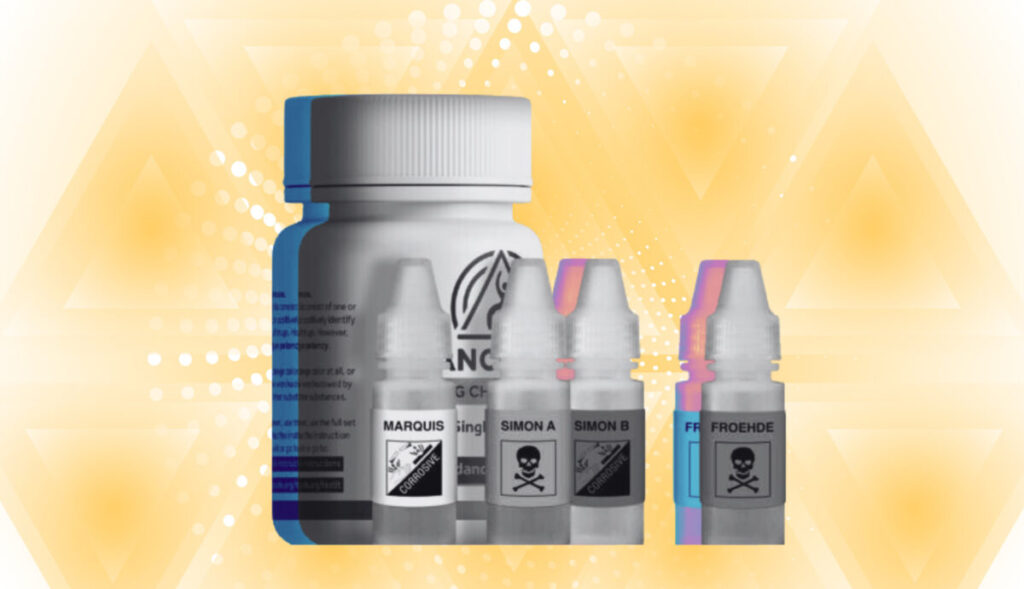
Another data gap involved cardiovascular health risks, which panelists said were not fully assessed throughout the studies. They raised concerns that MDMA could cause heart attacks and strokes.
In The Illusion of Consensus podcast, Dr. Johnson explained that this argument was somewhat “absurd” due to MDMA’s known effects. Sure, it raises blood pressure and heart rate. But it’s a reasonable risk-benefit ratio. Johnson compared MDMA’s cardiovascular impact to Adderall, which doctors give to children every day.
“Even with a minor abnormality at the end of a session, it doesn’t mean it will lead to a clinical event like a stroke, which is extremely rare,” said Dr. Johnson.
The FDA said it should have required Lykos to take EKGs and blood samples after MDMA sessions. However, the agency admittedly approved Lykos’ study design without these measures.
The FDA’s admission did not shift the panelists’ perspective.
Sexual misconduct was another significant concern sparked by an incident in 2015.
A harrowing public comment on the matter came from Speaker 26, Sarah Grosh, who spoke as a proxy for Phase 2 participant Meaghan Buisson. In Buisson’s words, Grosh described the abuse that took place. Buisson’s descriptions of the assaults she suffered in session were recorded and are now publicly available.
Buisson also reported becoming suicidal during the trial and said that Lykos did not document this adverse event. She claimed MDMA therapy left her overwhelmingly vulnerable and led to further exploitation by her therapist, who she said trafficked her while still in the trial.
Grosh asserted that Lykos’ leadership did nothing to intervene after she filed the ethics complaint in 2018 and that they continue to deny any ethical violations.
Lykos responded in its statement, saying, “This was a terrible and harmful instance of malpractice that caused profound suffering to a participant. Lykos reported this violation to Health Canada, the FDA, and the relevant Institutional Review Board and banned the therapist pair associated with this case from all future work. Since then, we carefully developed and implemented new policies and practices aimed to prevent, detect, investigate, encourage reporting of, and thoroughly respond to potential instances of misconduct or unethical behavior.”
Amid the shadow of alleged misconduct, data misalignment, and safety concerns, PDAC voted an overwhelming no to MDMA treatment for PTSD. The FDA is not required to follow PDAC’s guidance. However, the overwhelming pushback casts serious doubt over whether 2024 will be Lykos’ year.
“It doesn’t look good at all. I imagine at some point MDMA will be approved for PTSD, but I wouldn’t put bets on it to be approved in August,” said Dr. Johnson.
Many people have read the statistic that the FDA aligns with advisory committees 88% of the time. However, a lesser-known fact is that in cases when the committee did not recommend approval, the FDA only agreed 67% of the time. This disparity leaves the door open for hope.
Another hopeful sign, according to Dr. Holley, is that the FDA prioritizes public health when making NDA decisions. The fact that current PTSD therapies are highly deficient and no new drugs have been approved in decades represents a significant healthcare failure.
Lykos maintains that MDMA-assisted therapy can meet the nation’s critical mental health needs, and it has not given up on approval.
“While we understand that the FDA considers advisory committee recommendations, most of the conversation at the meeting centered on known issues that have already been discussed and investigated. In addition, the panel was focused on the regulation of therapy outside the FDA’s purview.”
Lykos added that the organization is discussing a potential post-approval REMS (Risk Evaluation and Mitigation Strategy) program with the FDA. REMS would seek to ensure patient safety and regulatory compliance through measures to monitor and manage risks.
“If FDA-approved, prescription MDMA-assisted therapy will be launched with careful consideration of its potential benefits and risks, following established medical guidelines, protocols, and quality standards,” said Lykos.
If the FDA approves Lykos’ application in August, the decision will spark a timeline that requires several bureaucratic steps before patients can access MDMA treatment for PTSD.
“Our plan is to make MDMA-assisted therapy available, if approved, in 2025,” said Lykos, who clarified that they would initially roll out the program to a limited number of sites.
Lykos declined to speculate on what they might do if the new drug application for MDMA-AT fails.
However, in similar circumstances, trial sponsors must thoroughly rectify the issues through additional studies, further data collection, or modifications to the drug’s formulation, labeling, or manufacturing process. Once finished, sponsors must resubmit a package with all the information proving the issuers were resolved. The FDA then re-evaluates the application to determine if it meets the safety and regulatory requirements.
The process can delay FDA approval by a median of 435 days, requiring companies to spend significantly more time and money to get to the finish line.
PDAC does not think the current data proves MDMA therapy is effective for PTSD, nor does it believe the potential harms outweigh the risks. Lykos asserts that the clinical trial results speak for themselves and that treatment could significantly improve countless lives. Now, 13 million Americans with PTSD await MDMA’s FDA approval status in August.
Imagine a world where psychedelic-assisted therapy helps alleviate the mental health inequities faced by LGBTQ+ communities. This breakthrough could be closer than we think.
In recent years, psychedelic-assisted therapy has re-emerged as a promising frontier in mental health treatment. With substances like psilocybin and MDMA showing efficacy in recent clinical trials in treating major depressive disorder and post-traumatic stress disorder (PTSD), respectively, the prospect of psychedelic medicine is becoming more distinct, though uncertainties clearly remain.
However, as this field progresses, it is crucial to ensure that the benefits of these innovative treatments are accessible to all, particularly to those in marginalized communities. This includes sexually and gender-diverse people (or LGBTQ+ communities), who remain underrepresented in clinical research despite facing disproportionately high, inequitable rates of mental health challenges.
What are the current mental health disparities among LGBTQ+ communities, the limitations of the current psychedelic research landscape, and how we may move forward to improve clinical science and promote health equity? And further, how could psychedelic-assisted therapy alleviate minority stress-related mental health challenges among LGBTQ+ communities?
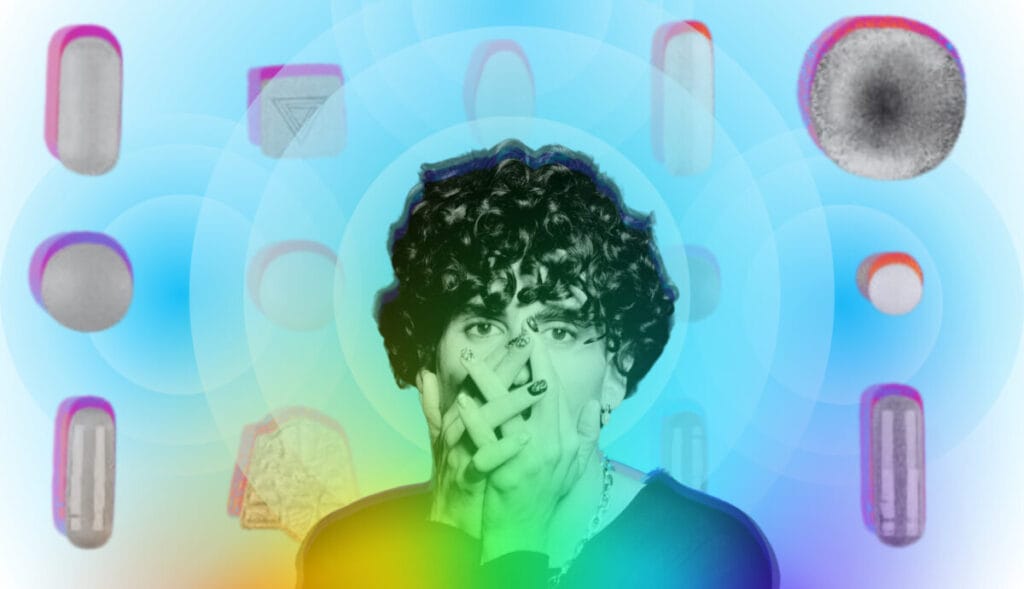
LGBTQ+ individuals, encompassing a diverse spectrum of sexual and gender identities, experience unique stressors related to their minority status, or, more specifically, minoritization and oppression. These stigma-related stressors include chronic and persistent experiences of identity-related discrimination, interpersonal and internalized stigma, and expectations of rejection, all of which contribute significantly to mental health disparities, including higher rates of depression and anxiety beginning in childhood and adolescence.
The Centers for Disease Control and Prevention (CDC) found in their Youth Risk Behavior Survey that over 20% of sexually diverse youth attempted suicide in 2021, compared to 6% of their heterosexual peers. Of note, the mental health climate varies among the sub-groups within the LGBTQ+ communities, with the CDC finding that over 30% of trans and gender-diverse youth attempted suicide in 2019 (compared to 7.3% of their cisgender peers). These alarming statistics underscore the urgent need for targeted mental health interventions for LGBTQ+ patient populations.
The minority stress theory, as initially developed by Ilan Meyer, provides a framework for understanding these disparities. This theory has been routinely supported by empirical data and posits that the chronic stress experienced by LGBTQ+ individuals due to societal stigma and discrimination – or minority stress – has profound negative effects on their mental health.
Meyer describes a ‘distal-proximal continuum,’ where distal minority stressors include stressors independent of individual psychological processes, like identity-related violence or family and peer rejection, while proximal minority stressors include stressors dependent on individual appraisals, such as internalized homo- and transphobia, or chronic threat vigilance.
Given these mental health considerations unique to LGBTQ+ communities, there is a pressing demand to investigate and potentially tailor psychedelic-assisted therapy within the contexts of these specific minority stressors to improve LGBTQ+ mental health outcomes.
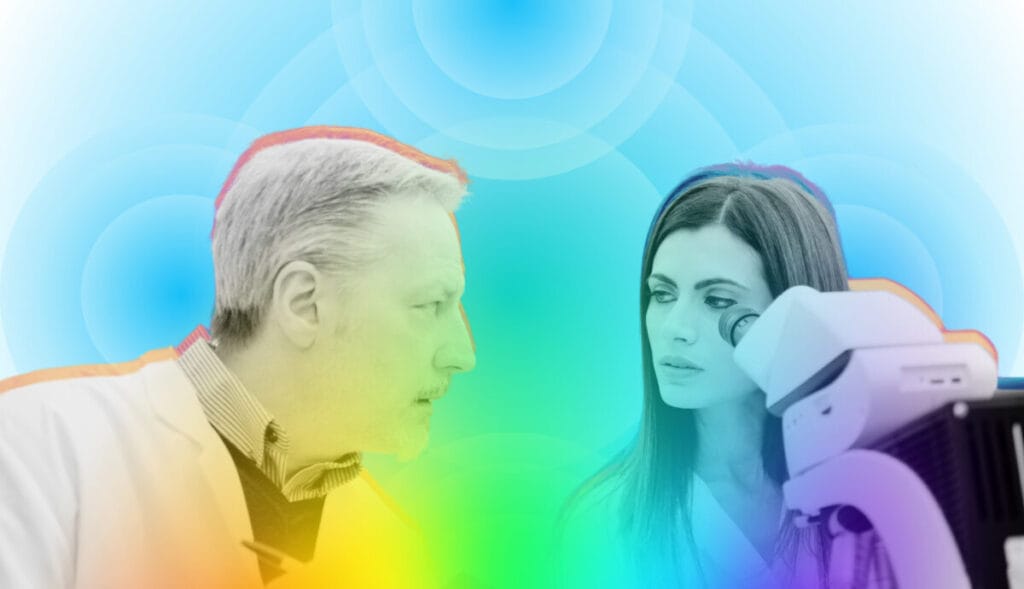
Current clinical trials on psychedelic-assisted therapy have been criticized for their lack of diversity, particularly the underrepresentation of racially minoritized communities and LGBTQ+ communities. Indeed, the vast majority of recent clinical trials have not collected data on the trial participants’ sexual orientation and gender identity, leaving outstanding treatment questions for the LGBTQ+ communities.
The inclusion of LGBTQ+ participants in these clinical trials is not just a matter of equity but also scientific rigor and generalizability, as detailed by the National Academies of Sciences, Engineering, and Medicine. Additionally, understanding how psychedelic-assisted therapy interacts with the unique minority stressors faced by LGBTQ+ individuals may lead to more effective and inclusive treatment protocols.
A recent perspective published in Nature Mental Health by our team emphasizes the necessity of inclusive research, noting that systematic collection of sexual orientation and gender identity (SOGI) data is crucial for assessing the impact, if any, of psychedelic-assisted therapy on minority stress processes.
Additionally, the article describes how the integration of minority stress theory with existing models of psychedelic action, such as the relaxed beliefs under psychedelics (REBUS) model, offers a promising avenue for future research. The REBUS model theorizes that psychedelics are therapeutic as they make entrenched, maladaptive cognitive and behavioral patterns more malleable, ripe for establishing newer patterns of behavior and facilitating examination of old patterns.
For LGBTQ+ individuals, whose mental health may be compromised by deeply ingrained negative beliefs and expectations due to chronic minority stress, such as internalized homo- and transphobia, this psychological flexibility may be particularly therapeutic. In theory, by alleviating the rigid, maladaptive cognitive and behavioral patterns associated with minority stress, psychedelic-assisted therapy may facilitate profound psychological healing and resilience among LGBTQ+ communities. However, until research becomes more equitable, much will remain unknown for the LGBTQ+ communities–and these theories will remain hypotheses.
To advance this research, several steps are essential.
First, there must be focused recruitment efforts, with study and site-specific strategies, to ensure the inclusion of diverse sexual and gender identities in psychedelic clinical trials.
Second, researchers need to systematically collect and analyze SOGI data to understand specific impacts of psychedelic-assisted therapy on sexually and gender-diverse populations, who make up over 20% of Generation Z, according to a recent Gallup Poll.
Third, clinical trials should incorporate outcomes designed to assess minority stress processes explicitly.
And finally, developing and testing SGM-affirmative adaptations of psychedelic-assisted therapy protocols will be crucial in making these therapies potentially more effective and accessible to LGBTQ+ individuals. Importantly, such efforts must be complemented by comprehensive initiatives to establish an inclusive, affirming, and empowering environment for LGBTQ+ trial participants across each phase of the clinical trial.
These efforts, however, must be mentioned in conjunction with addressing the historical distrust between the LGBTQ+ communities and the medical establishment. LGBTQ+ individuals have experienced discrimination and stigmatization in health care settings and research, which can deter them from seeking care or participating in clinical trials.
Rebuilding trust requires the inclusion of LGBTQ+ researchers, clinicians, and community members in the design and implementation of psychedelic-assisted therapy clinical trials, with explicit acknowledgment and redress of this harmful past. This approach better ensures that future research is conducted in a culturally competent, trauma-informed manner, fostering a safer and more welcoming environment for LGBTQ+ trial participants.
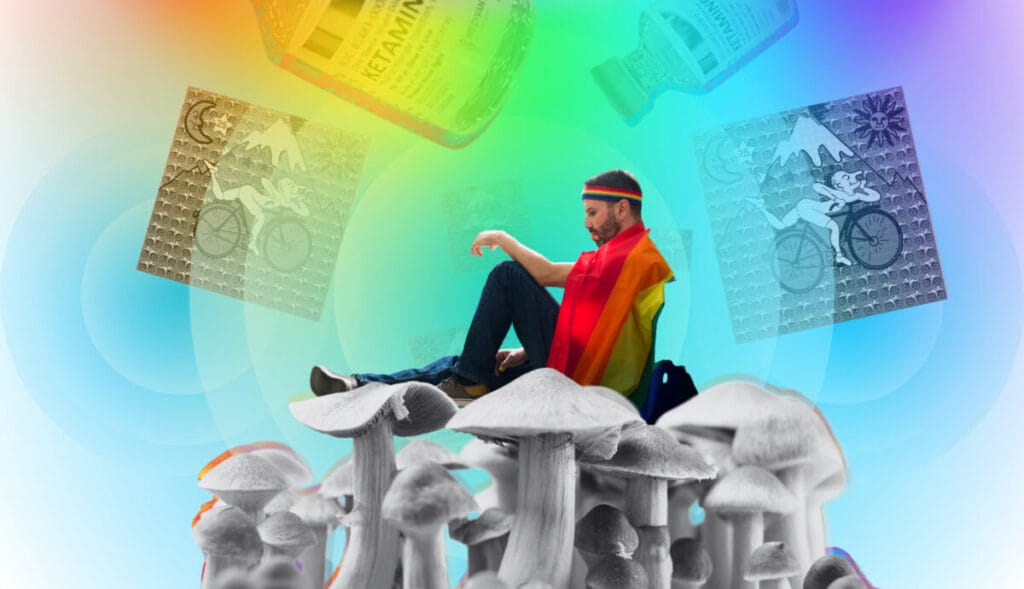
The potential for psychedelic-assisted therapy to address the mental health disparities faced by LGBTQ+ communities deserves our attention. Realizing the potential of psychedelic-assisted therapy requires a concerted effort to include these populations in inclusive, affirmative research and to investigate treatments tailored to their unique health needs.
As the field of psychedelic research moves forward, it must do so with a commitment to inclusivity and equity, ensuring that the benefits of these groundbreaking therapies are available to all who need them. By expanding the scope of psychedelic clinical trials to include LGBTQ+ populations, while exploring LGBTQ-affirmative treatment models, we can move towards a more inclusive, effective, and compassionate approach to psychedelic research and mental health care. It is also imperative to rectify the historical underrepresentation and to advance mental health equity in meaningful ways.
As we continue to explore the therapeutic potential of psychedelics, let us do so with a vision of health care that embraces and uplifts every individual, importantly recognizing sexual and gender diversity. In doing so, we will not only enhance the validity and applicability of research findings but also ensure that the transformative potential of psychedelic-assisted therapy reaches those who need it most.
The journey towards mental health equity is long, but with deliberate and inclusive efforts, we can make significant strides in creating a world where every individual, regardless of their sexual or gender identity, can access and benefit from cutting-edge mental health treatments.
In this episode, Joe interviews Dr. Amanda Holley: pharmacologist and regulatory consultant in nonclinical drug development, and previously a nonclinical pharmacology/toxicology reviewer at the FDA.
With Lykos Therapeutics working towards FDA approval of MDMA-assisted psychotherapy for PTSD, ICER (Institute for Clinical and Economic Review) recently published its draft evidence report, concluding that they couldn’t endorse this modality. While disappointing to the psychedelic space, this report doesn’t determine the FDA’s official stance, and also really highlights a lot about how the FDA works, the knowledge gap between consumers and regulators, and how clinical studies should be designed in the future. Holley talks about the FDA’s dedication to safety and data, and how, essentially, drug development comes down to a risk/benefit analysis.
She discusses:
and more!
Lykospbc.com: Lykos Therapeutics Statement on FDA Advisory Committee Meeting
Marijuanaindex.com: Delta 8 vs Delta 9 THC: Understanding the Differences and Effects
In this episode, special guest host Court Wing interviews Monica Verduzco-Gutierrez, MD: professor and chair of rehabilitation medicine at UT Health San Antonio; Joel Castellanos, MD: co-founder and associate medical director of the Center for Psychedelic Research at UC San Diego; and MaryAnn Welke Lesage: a long COVID survivor who reports experiencing drastic improvement in symptoms after MDMA and psilocybin therapy.
As the world slowly recovers from COVID, many people are seeing continued or new symptoms, and while much is still not understood, these symptoms are being categorized as long COVID: essentially a persistent viral inflammation causing brain fog, headaches, depression, and other hard-to-diagnose symptoms. With estimations of as many as 18% of people in the U.S. experiencing this at one point and 6.8% currently dealing with it, could psychedelics – which can decrease inflammation and reset neural networks – help alleviate these symptoms?
They discuss:
and more!
For more info, read Lesage’s article, “How Psychedelics Became Key to My Long COVID Recovery,” as well as the official paper: “Long-COVID symptoms improved after MDMA and psilocybin therapy: A case report.”
Long-COVID symptoms improved after MDMA and psilocybin therapy: A case report
Time.com: The Latest Promising Long COVID Treatment? Psychedelic Drugs
BMJ Journals: Chronic pain and psychedelics: a review and proposed mechanism of action
Uthscsa.edu: Long COVID: A syndrome wrapped in a riddle inside an enigma
Uthscsa.edu: Dr. Monica Verduzco-Gutierrez discusses long-COVID disability before House subcommittee
Psychologytoday.com: Is Serotonin a Cause of Long COVID Brain Fog?
In this episode, David interviews Sami Awad: Palestinian peace and nonviolent activist and founder of Holy Land Trust in Bethlehem; and Leor Roseman, Ph.D.: Israeli neuroscientist, researcher, and senior lecturer at the University of Exeter.
They talk about Roseman’s 2021 paper, “Relational Processes in Ayahuasca Groups of Palestinians and Israelis,” which looked at what happened when people with fiercely different opinions moved beyond fear, anger, and othering, and sat together in a safe container and drank ayahuasca with the purpose of healing collective trauma. When the focus of the participants moved toward understanding each other, Roseman and Awad saw a unity that gave them a lot of hope, leading to the creation of their nonprofit, RIPPLES, which is focused on using psychedelics for peacebuilding – first in the Middle East, and hopefully soon, everywhere. As Awad says, “If it can happen here, it can happen almost anywhere.”
They discuss:
University of Exeter: Dr. Leor Roseman
Frontiersin.org: Relational Processes in Ayahuasca Groups of Palestinians and Israelis
It’s no secret that psychedelics and creativity are intrinsically linked. If you look around, you won’t have to go very far to find psychedelic-inspired byproducts from visionary figures whose work has changed the world, from Yoko Ono, to Aldous Huxley, to Steve Jobs.
While psychedelics’ impact on art is well-documented, the psychedelic influence on design remains largely unexplored, despite luminaries like Jobs attributing psychedelic experiences to shaping their design ethos.
How do people working in the design world work with psychedelics in 2024? Spoiler: psychedelics are being used to foster unconventional problem-solving, inspire new empathic design systems, and lead to designs that reconnect people with each other and the planet.
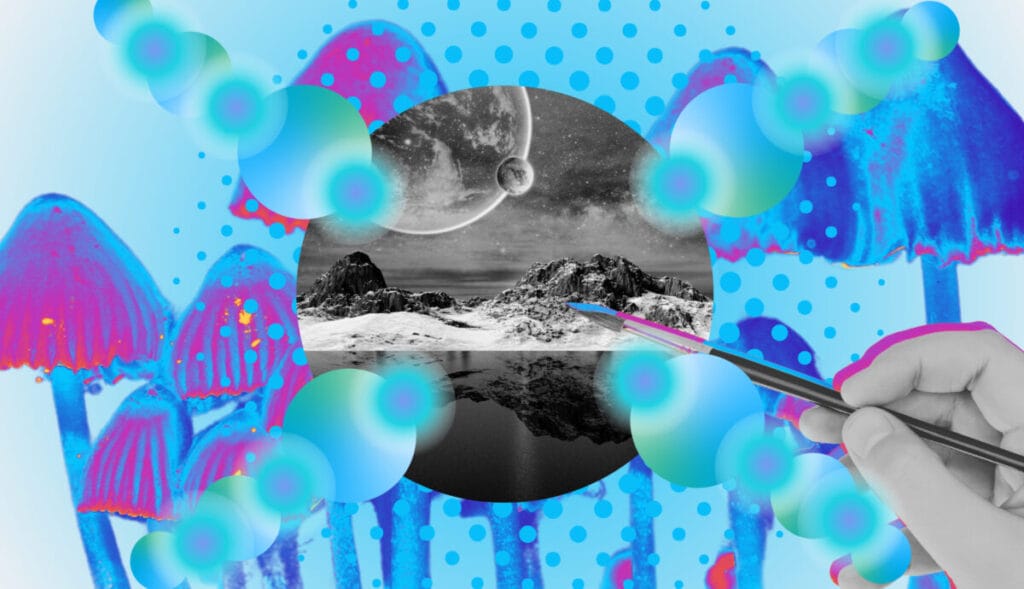
Psychedelic experiences influence creative processes in various ways. Research and anecdotal evidence suggest that psychedelics such as LSD and psilocybin can enhance creative thinking by inducing a hyper-associative state of cognition, increasing global entropy in the brain, and reducing conventional, logical thinking while giving rise to novel thoughts and insights. A 2022 Beckley Foundation study revealed that psychedelics can lead to a shift of cognitive resources towards originality, convergence, and symbolic thinking, which are fundamental phenomena for creativity. The altered state induced by psychedelics can unlock creativity by allowing individuals to imagine things that don’t exist, experience profound visual and sensory hallucinations, and increase connectivity in brain networks associated with idea generation and evaluation.
“My current creative process is intrinsically connected to psychedelics,” said Jannyl Molina, Psychedelics Today graphic designer. As part of her role, she reads unpublished articles (including this one), to distill and visually articulate the main themes and conceptual complexities such as ‘integration,’ the ‘default mode network,’ and the ‘War on Drugs.’
“In a way, my process for design is really informed by past psychedelic experience and current research,” Molina said. A 2019 Maastricht University study found that psilocybin has several notable effects on creative thinking. It led to a differentiation of effects over time and across constructs; it resulted in higher ratings of spontaneous creative insights; it decreased deliberate, task-based creativity; and seven days after psilocybin use, the number of novel ideas continued to be elevated.
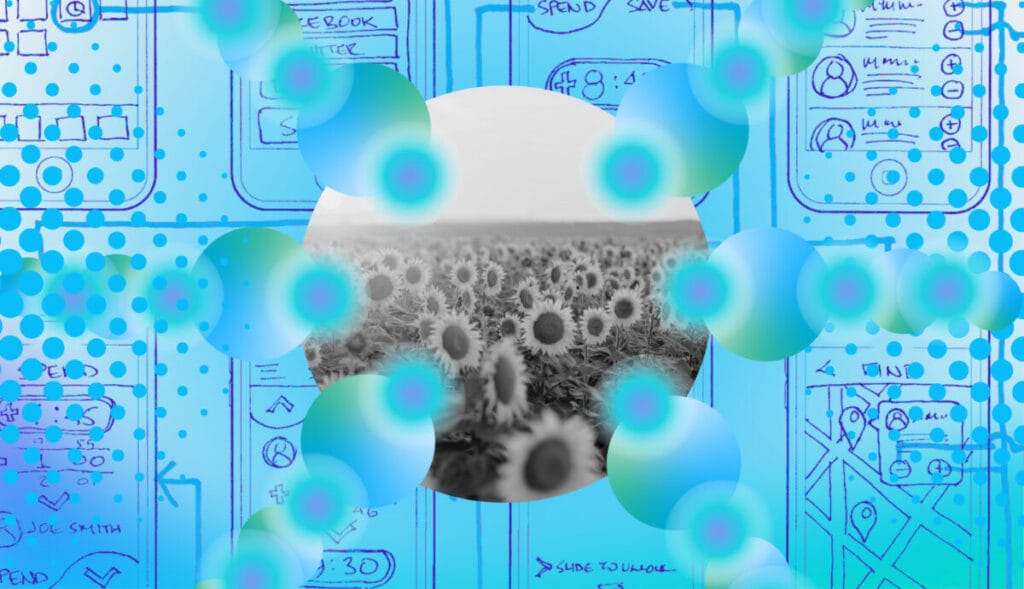
Beyond just design, there’s a bigger idea at play. Based on our work at Psychedelics Design, a platform exploring how psychedelics and design overlap, we think the benefits of psychedelics could deeply change how designers create.
By helping us understand what people need and making us appreciate nature more, psychedelics may inspire products and systems that are innovative, beautiful, profitable, and also good for the planet.
In design, it can’t be overstated the degree to which psychedelic experiences change an individual’s view of how humans and nature are connected. These profound experiences frequently evoke a profound sense of unity and interconnectedness among all life forms.
For designers, these new perspectives can become their inspiration to use more earth-friendly methods in their work. It may inspire switching to green materials and putting nature first in the assembly of their work. Psychedelic experiences also fill the design process with more caring and respect for nature, possibly guiding designers to solutions that keep ecosystems in balance.
“You likely can’t get too far into psychedelic exploration without feeling a deeper connection to nature. As we like to remind people in our work, everything is designed – by humans or by nature. And spoiler alert: humans are, in fact, just another expression of nature,” say Tracy DeLuca, founder of the How Might We Design LLC., and Elysa Fenenbock, founder of The School of Psychedelic Design. Both are instructors of Stanford’s Psychedelic Medicine x Design course.
“More specifically, psychedelic experiences have profoundly reshaped our view and reconnected us with nature’s own creative problem-solving abilities, honed over billions of years of evolution. Psychedelics have expanded our understanding of what’s possible in problem-solving and encouraged us to consider the needs of all living beings, not just humans,” the pair wrote.
A long-term follow-up study by MAPS founder Rick Doblin of the Good Friday experiment found that participants’ appreciation for life and nature was enhanced 24 years after their psilocybin experience, suggesting long-lasting impacts on nature-relatedness. The findings from these studies align with the biophilia hypothesis, which argues that humans naturally prefer nature because we evolved in it.
Molina says she found “greater urgency to care for nature and take care of others” when under the influence of psychedelics.
“It’s as if that inner wisdom says to me, ‘you are healing and need to aid others in their healing, so that Earth can also heal.’ That becomes louder each time I journey,” she said.
This natural connection may be why many people choose outdoorsy settings for psychedelic experiences and report a deep appreciation of the world around them. Together, this research suggests psychedelics could help fix our modern disconnect from nature by making us feel more connected to and appreciative of the environment.

The idea of changing how we design things after having mind-opening experiences with psychedelics is exciting. Instead of only thinking about what’s best for humans, we can think about what’s best for all living things. This could help us work together better and fix big problems in the world.
This shift from human-centered to life-centered design holds promise for addressing complex issues and presents an opportunity for designers to elevate their collaborative efforts with clients and stakeholders. Rather than isolating themselves within traditional structures, designers can integrate more deeply into organizations, becoming integral parts of the growth ecosystem.
“In the realm of healthcare, psychedelic medicine shows promise not only in providing relief for individual mental health challenges but also in catalyzing a broader transformation of our broken healthcare systems,” DeLuca adds.
By embracing principles of expanded consciousness, conscious connectedness, collaboration, regeneration, and reciprocity, the Psychedelics Design Philosophy offers the potential to revolutionize the very essence of how we approach design, moving beyond mere problem-solving to co-creating harmonious and sustainable solutions that resonate with the interconnectedness of all things.
While there is plenty of room and indeed a need for the design process to evolve and benefit from an expanded state of knowing and doing, Jeff Salazar, partner at McKinsey Design, sees potential to more dramatically shift design structures.
“After 30 years of consulting experience, I’ve seen many teams have less impact than they are truly capable of by isolating themselves as the keepers of the process and/or are hampered by living within a corporate structure that puts them a Grand Canyon away from where strategy gets shaped. To this point, I’m inspired to see us open the aperture on how we might reimagine ‘design’ becoming even more a part of (not apart from) the organizations and institutions that can gain greater benefit from the practice,” Salazar said.
The chance to create new ways of designing naturally with psychedelics is a hopeful idea for the future of creativity. It lets us go past the limits of how we design things now and imagine a new way forward. This way of designing is about being open, aware, working together, helping things grow back, and being good to each other. It could change not just how we make new things but also help make bigger changes in the world.
“It is from being in an expanded-state, that designers can gain new perspectives on their role – not only in creating highly desirable, harmonious and sustainable solutions – but also to help broaden and challenge how they engage within the overall ecosystem of growth,” Salazar said.
By using what we’ve learned from psychedelic experiences, we can start to take apart old ways of doing things that don’t work anymore. We can make a system that includes everyone and lasts a long time. Ultimately, this can lead to a world where all living things live together in a fair and peaceful way.

Making new things can seem impressive, but it’s a lot of hard work and can be tiring for both the body and the mind. Just like in psychedelics, having the right attitude and a good environment – a.k.a. ‘set and setting’ – is essential.
Similarly for creators, who often possess heightened sensitivity, factors like sound, scent, and others’ emotions can profoundly impact their work. Creative agencies and some tech giants have known for a long time that it’s important to give their workers a place where they can flourish. A great workplace for creatives might offer different rooms to work, a variety of refreshments, places to sit quietly, opportunities to practice yoga, and special headphones to block noise in busy work spaces.
Henry Winslow, founder of Tricycleday, says psychedelics have shifted in his perspective on the creative process.
“I don’t force ideas anymore; I create space for ideas now. It might sound like a semantic shift, but it’s not. In my days working at giant agencies, we’d schedule 30 or 60-minute structured brainstorming sessions. They didn’t reliably generate anything remarkable. Now, I understand that the answers are within me. It may sound corny, but I just have to create the conditions for them to reveal themselves spontaneously,” he said.
Many creatives also experience a sense of detachment or otherness, creative blocks, and feelings of impostor syndrome driven by the pursuit of perfection, all of which can significantly elevate stress levels.
“I have noticed that if I have a ‘creative block,’ microdosing or even doing a larger dose will help me return to my usual creative self. The process of ideation has to be generative, by definition, and psychedelics are primordial for linking up parts of my brain and allowing new ideas to burst out,” Molina says.
According to UCSF researcher Robin Carhart-Harris, whose pioneering fMRI study captured images of a healthy brain under the influence of a dose of LSD capable of inducing a trip, the psychedelic experience involves a breakdown of the conventional sense of self, replaced by a profound sense of connection with oneself, others, and the natural world. Commenting on the study, Carhart-Harris notes that “[i]n many ways, the brain in the LSD state resembles the state our brains were in when we were infants: free and unconstrained. This also makes sense when we consider the hyper-emotional and imaginative nature of an infant’s mind.”
Hector Pottie, creative director of Moving Brands, believes that “maybe psychedelics are something that would help create the right conditions for us to think wider, to think differently.”
Psychedelics have the potential to alleviate tension, silence our inner critics, foster receptivity, enhance our sense of connection, and ultimately unlock intricate visions. This could help us develop new ways to design things that are just right for the complexities of our world.
Amanda Feilding, Founder and Director of the Beckley Foundation, supports this view.
“The practice of mind-expanding activities such as the taking of psychoactive substances was, I think, fundamentally interwoven with the early development of man, helping to expand the boundaries of consciousness. The mind was opened to new visions by maximizing hyperconnectivity, and spreading further the network of simultaneous associations, inspiring higher levels of creativity and spirituality.”
A placebo-controlled study by Isabel Wießner and colleagues at the University of Campinas, Brazil, found that compared to placebo, LSD changed several creativity measurements pointing to three overall LSD-induced phenomena: a ‘pattern break’ reflected by increased novelty, surprise, originality, and semantic distances; decreased ‘organization,’ reflected by decreased utility, convergent thinking and, marginally, elaboration; and ‘meaning,’ reflected by increased symbolic thinking and ambiguity in the data-driven results.
Carly Dutch-Greene, founder of Studiodelic, says: “My psychedelic experiences have given me the ability to deeply attune to my intuition and because of that, I am able to transmute thoughts and ideas into visual designs in a really meaningful way.”
For designers, psychedelics open up a new realm of creative possibility, offering a unique tool for problem-solving and innovation. By altering perception and expanding consciousness, psychedelics may unlock creative insights that were previously inaccessible, paving the way for design solutions that contribute to regenerative futures.
It is essential to acknowledge the complexities and risks associated with psychedelics – they are not a panacea for creative problem-solving, and may not be the best choice for all creative thinkers. The ongoing dialogue within the design and psychedelic communities must carefully balance the potential creative insights with potential risks. While psychedelics may offer profound experiences and new avenues for exploration, we can’t overlook that they also carry legal, ethical, and health considerations, too.
Ultimately, the intersection of psychedelics and design carries both profound opportunities and formidable challenges. By proceeding with open yet critical minds, this intersection has the potential to expand the frontiers of humanity. With wisdom and care, this resurgence could catalyze a new creative wave that redesigns our innovations and how we innovate.
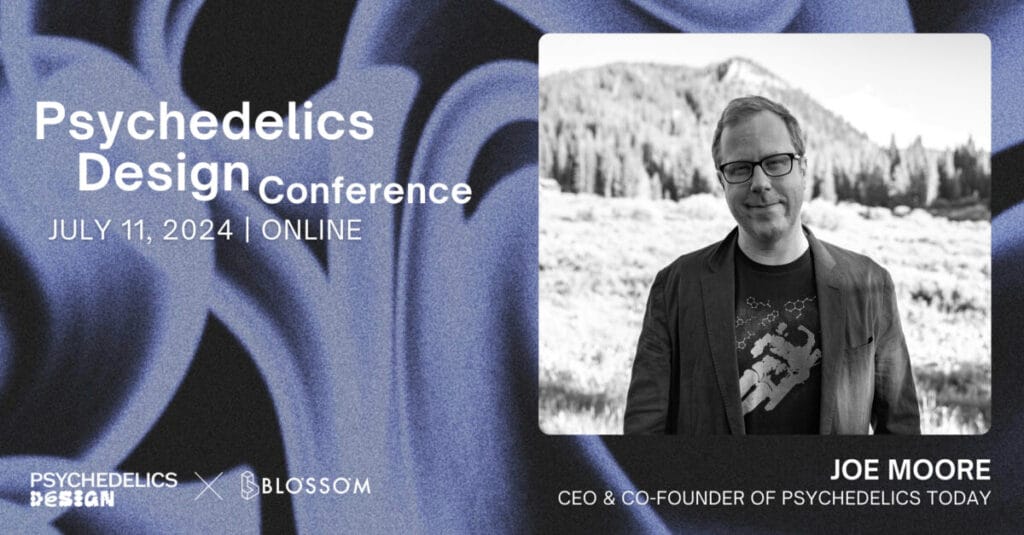
In this episode, Joe interviews two members of the Heroic Hearts Project team: Director of Donor Development and founder of The Hope Project, Allison Wilson; and Director of Research and founder of Hystelica, Dr. Grace Blest-Hopley.
They discuss how The Hope Project – a nonprofit that supports spouses of veterans, Gold Star Wives, and female veterans with scholarships to psychedelic healing retreats, integration, community, etc. – merged with Heroic Hearts Project, and why this is such a necessary part of the veteran healing story: How does a family hold space for a vet returning to a suddenly alien civilian life (especially after a psychedelic journey)? How does a spouse deal with their own trauma from constant worry and isolation? Wilson and Blest-Hopley are learning that, for many spouses, having their own experience (and with other spouses) has been incredibly beneficial.
They talk about:
and more!
Lucid.news: Vets Group Moves Psychedelic Therapy Research Outside the Clinic
YouTube: PT Live: Joe Moore & Alex Horton Discuss the Heroic Hearts Project
In this episode, Joe and Kyle interview William Richards, STM, Ph.D.: senior advisor at Sunstone Therapies, psychologist at the Center for Psychedelic and Consciousness Research at the Johns Hopkins School of Medicine, contributor to Vital, and author of Sacred Knowledge: Psychedelics & Religious Experiences.
He talks about the first time he experienced psilocybin in a research study in 1963, his early studies on the psychology of religion, working with Abraham Maslow, how he became one of the early psychedelic therapists, and what it was like for all of that to disappear when Nixon came into office and shut everything down. He discusses his move into psychedelics and end-of-life care after seeing patients’ fear of death completely disappear, and contemplates whether psychedelics could help people prepare for death – how would we live if we no longer feared death?
He also discusses:
and more!
Sacred Knowledge: Psychedelics and Religious Experiences, by William A. Richards
The Psychology of Science: A Reconnaissance, by Abraham H. Maslow
Clinicaltrials.gov: Psilocybin
Amazon links are affiliate links, meaning that Psychedelics Today will receive a percentage of the sale.
Psychedelics and pregnancy is a highly controversial and often unspoken topic. But beyond the stigma, what does the research, law and culture say about mothers-to-be consuming psychedelics?
As she had done many times before, Leticia Pizano sat in ceremony with her medicine sisters waiting to feel the effects of the four grams of magic mushrooms that she had ingested. An experienced journeyer, Pizano found it strange that 45 minutes later she began vomiting, an effect she was unaccustomed to so early in the trip.
“The medicine just showed me that I needed to get that out of my body because I was with baby,” she told Psychedelics Today.

Still, the mushrooms took effect and led her on a trip she described as beautiful and empowering. The experience enabled her to form a deeper bond with her unborn child. “There’s just a different connection with her; almost non-human,” Pizano says of her daughter, six months old and the youngest of her twelve children at the time of this writing. After her daughter’s birth, Pizano brought her “medicine baby” to every plant medicine ceremony she attended.
For Pizano, participation in community-based ceremony was a motivating factor for her use of psychedelics, and her use during pregnancy was consistent with cultural norms — she is a member of the Sac and Fox and Kickapoo Tribal Nations, where partaking in ceremonies that include plant medicine sacraments occurs all through a person’s life. For most non-Indigenous people, such participation would be unusual and likely stigmatized, perhaps viewed as dangerous or irresponsible.
Yet, as psychedelics enter a more mainstream era, non-Indigenous birthing parents are relying on them as tools for wellness and even lifesaving measures to address treatment-resistant depression, anxiety, PTSD and addiction. Our current paradigms for substance use during pregnancy do not look at psychedelics with a thoughtful, critical lens. A new approach may be required to accommodate the myriad ways our culture has shifted towards turning to psychedelics over conventional treatments and medications for well-being.

Just as with other psychotropics like antidepressants or anti-anxiety medications, birthing parents and their healthcare providers need to evaluate existing information on psychedelics and pregnancy to make informed decisions about whether to continue using them during pregnancy. But seeking information on the web yields few results. And what little information does exist on the topic is often confusing, incomplete and misleadingly shaped by the War on Drugs. One study on pregnancy and LSD – the study most commonly cited online in reference to psychedelics and pregnancy – was published in 1970.
The American College of Obstetricians and Gynecologists offers a blanket statement recommending the cessation of all marijuana use. Other psychedelics are similarly classified into a category of “substances that are commonly misused or abused,” a classification that bears the markings of bias and misinformation. According to the Global Drug Survey, we know that many psychedelic users ingest these substances in a safe, prepared and informed way, and according to longtime drug researcher David Nutt’s book, Drugs Without the Hot Air, psychedelics like mushrooms and LSD are not inherently addictive.
The March of Dimes, a research and advocacy group for mothers and babies, offers an unsourced page last edited in 2016 on their website that reads: “Street drugs are bad for you, and they’re bad for your baby.” The psychedelics included in this category are “ecstasy” and “other club drugs.” This broad categorization fails to account for the therapeutic applications of psychedelics. It also excludes critical factors like set, setting and dosage, all of which make a significant difference in a psychedelic user’s experience.
Mother to Baby provides more nuanced and specific information on psychedelics, but offer inconsistent guidance on the site. One article advises “Other street drugs, like cocaine, heroin, LSD, MDMA (ecstasy or Molly), and methamphetamine, also are harmful during pregnancy.” While the site’s Fact Sheets for both LSD and MDMA state that it is unknown whether the substances cause pregnancy-related problems.
These blanket prohibitions are largely based on the absence of—rather than the presence of—information about how a substance will impact a growing fetus. The medical research canon contains very little information about the effects of these substances during pregnancy, and substantial obstacles exist for this research to take place at all.
Due to ethical and safety concerns, “The research we do have on pregnancy in general—let alone pregnancy with psychedelics or plant medicine—is minimal because we don’t do research in pregnancy for the most part,” says Jessilyn Dolan, a registered nurse, herbalist, hemp farmer and former member of the Board of Directors for the American Cannabis Nurse Association.
Aside from ethical considerations, says Dolan, another challenge is measuring the long-term health impacts to the child of just one substance due to the enormity of confounding factors. For example, is a person who consumes cannabis edibles during pregnancy also consuming caffeine, alcohol, or prescription medication? How might these substances along with the birthing parent’s diet and lifestyle impact the long term health outcomes for the child? And how might the child’s environment, including exposure to toxins, food insecurity, poverty or traumatic life events, play a role in their health as well?
“When we look at pregnancy, breastfeeding and chest feeding and then doing longitudinal studies around kids, we have so many factors working against us to make that research really legitimized and standardized,” says Dolan.
Of the existing research on this topic, most is either outdated or based on small sample sizes. As legal restrictions on these substances shift, this may change. But information about the safety of ingesting substances during pregnancy is still scant, inconclusive and conflicting.
A study from 1968 on nine children exposed to LSD-25 in utero found elevated levels of chromosomal damage compared to a control group. However, none of these babies exhibited any birth defects. This study, with its very small sample size, has never been replicated. It also did not look at long-term outcomes for these children, rendering the results limited in value.
Similarly, an often cited and widely circulated study from 1994 compared 24 newborns exposed to cannabis to 20 who were not; results at 30 days showed that the cannabis-exposed babies actually scored higher on measures of alertness, were less irritable and had better reflexes. But this study, again with a small sample size and never replicated, did not take into consideration the many confounding factors that could have contributed to the results. For example, the study took place in Jamaica where cannabis use during pregnancy is a common practice and is not stigmatized. In addition, the heavier cannabis-using birthing parents were also more educated, more financially stable and had fewer other children to care for, all of which could have impacted outcomes for their babies.
More broadly, research on prenatal drug exposure is often mired in biases. In his book Drug Use for Grownups, Dr. Carl Hart details several problems associated with brain imaging research on people exposed prenatally to drugs. It is easier to get findings published, he says, when they are consistent with the widespread notion that drug use is bad for the developing fetus. In addition, Hart writes the findings are almost never replicated and researchers often ignore their own data in order to draw conclusions that reflect their own biases.
Still, experts in the field like Amanda Feilding, executive director of the Beckley Foundation, a UK-based NGO that funds psychedelic research and supports policy change, remain hopeful about the prospect for more research on the topic
“Scientific exploration could be carried out using animal models, or using naturalistic surveys to get answers from people who are already using or have already used psychedelics during their pregnancy,” Feilding says.

Weighing risks of physical harm to the fetus against physical or mental health outcomes for the birthing parent is one framework for decision-making of this kind. But these calculations are not the only ones a birthing parent will have to assess. Most people who have experienced pregnancy will be familiar with an increase in monitoring by friends, family and even strangers who may feel entitled to comment on body changes, touch the pregnant person’s body without permission, or offer unsolicited advice or opinions on what the pregnant person ingests. Using psychedelics openly may create social stigma and isolation; the anxiety and stress that those conditions create may pose an additional risk for pregnant people.
Pregnant people are also monitored more closely by state and healthcare agencies. The American Academy of Pediatrics and American College of Obstetricians and Gynecologists recommends screening a pregnant person for drugs when they enter prenatal care. Twenty-five states and the District of Columbia require healthcare professionals to report even suspected drug use, and eight states require them to test for prenatal drug exposure if they suspect drug use. In 2014, Tennessee became the first state to pass a “fetal assault” law specifically allowing prosecution of pregnant women who use drugs, imposing penalties of up to 15 years in prison. The legislation was so controversial it was discontinued in 2016, but has been introduced several times since.
Monitoring for drug use, however, happens disproportionately along racial lines. While white and Black birthing parents have similar rates of any drug use during the prenatal period (though the substances used and patterns of use may differ slightly), an often-cited study from 1990 found that Black birthing parents were 10 times more likely than their white counterparts to be reported to health authorities for their drug use.
Some states are actively working to correct these disparities, with mixed results. A 2015 study of California hospitals that adopted a protocol to monitor all birthing parents for prenatal substance use found that it did not impact child protective services reporting disparities.
New York has taken a different approach. In a testimony to the New York City Council from 2020, David Hansell, Commissioner of the New York City Administration for Children’s Services, stated that the agency had actively discouraged health professionals from making reports to them about a child or parent who tests positive for a substance if there is no negative impact on their well-being and instead make a referral to a service agency. While this could theoretically help level out racial differences, the question remains whether the service agencies would be equipped and trained to adequately address the physical and mental health and other needs of a birthing parent using substances.
Vermont has also taken steps to eliminate the reporting requirement for healthcare practitioners treating birthing parents using substances. If a birthing parent tests positive only for marijuana, they are exempt from hospitals’ and healthcare professionals’ reporting requirements to the Department of Children and Families (although if the marijuana use is thought to endanger a child, it must be reported). The marijuana-only exemption in Vermont is informed by the lack of sufficient evidence suggesting that marijuana use during pregnancy is harmful. But similarly, there is a lack of sufficient evidence demonstrating that other psychedelics are harmful.
For birthing parents who do test positive for substances, their risk of losing custody is also informed by structural racism within the child welfare system. According to Dr. Kelly Sykes, a psychedelic integration therapist and child forensic psychologist, disparities exist between legal systems that govern custody and child protection systems. Allegations of abuse, neglect and drug abuse requiring court intervention exist in both systems. However, only parents within the child protection system—which disproportionately impacts poor single parents of color—can have their parental rights terminated and be permanently banned from having contact with their child. Further, all aspects of their parental judgement are subject to scrutiny; they may be randomly tested for substances, regardless of whether substance abuse was a part of their child protection case.
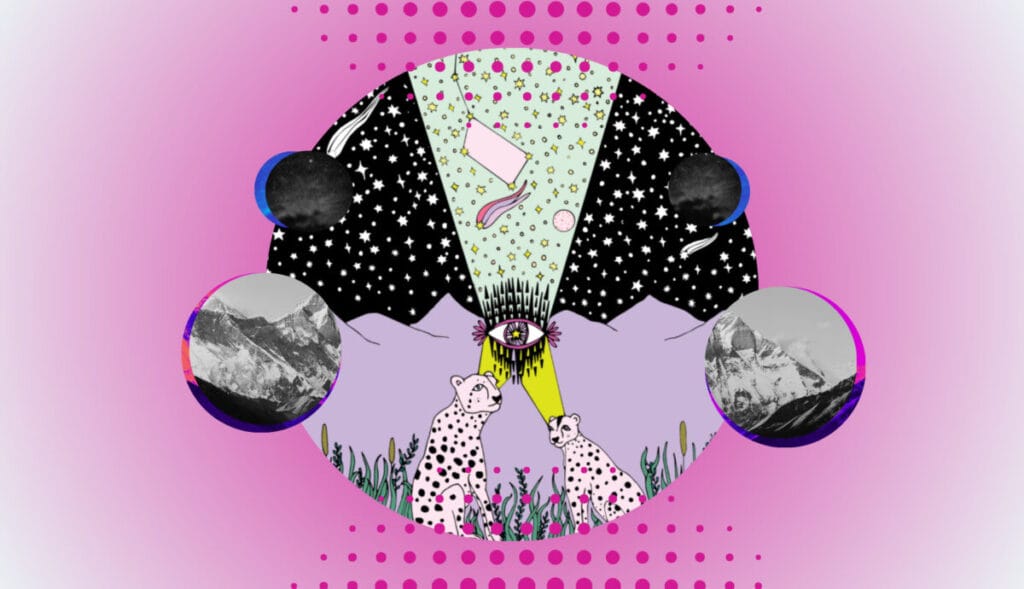
In this landscape of inconclusive, biased, and misleading information, how can birthing parents make informed decisions on this topic? And without information from peer-reviewed, evidence based research, what might drive someone to elect to use psychedelics all the same during their pregnancy?
For some birthing parents, the mental health benefits outweigh the potential risks.
“Psychedelics can reduce anxiety and depression, and can help people cope with dramatic changes in their lives,” said Feilding. “For those reasons, it’s certainly possible that psychedelics could be beneficial for expectant mothers struggling with prenatal depression or anxiety.”
Dolan, who has worked with pregnant people using cannabis to address treatment-resistant hyperemesis, a condition in pregnancy that creates severe and persistent nausea, frames the issue similarly. If anxiety and stress impede on the connection between parent and baby, research shows that “the relationship and connection is just as, if not more important than the little bit of pharmaceutical that’s going to pass through your breastmilk or pass through in utero to the child,” she says.
Being in a safe, supportive community to help weigh those decisions and process experiences in a nonjudgmental way can be very helpful. For someone like Pizano, this community is built into her everyday life. She grew up attending peyote ceremonies for occasions like baby namings, funerals or healing, and the wisdom she relies on comes from a long lineage of oral tradition, passed down by elders.
For those without such a cultural container, more options are emerging for pregnant people in need of support. A recent Psychedelics Today webinar explored the subject of psychedelics and parenthood with Dr. Glauber Loures de Assis, Associate Director of Chacruna Latinoamérica in Brazil. Groups like Plant Parenthood (which this writer founded) and Moms on Mushrooms also bring together parents to speak about topics that are so stigmatized, they’re rarely spoken about with others.
“Obviously safety is still a primary concern when it comes to kids and psychedelics, let alone issues like pregnancy,” says Andrew Rose, who co-facilitates Plant Parenthood. “But the riskiest thing is not talking about it at all. You can’t have good healthy community education without open, non-judgmental communication.”
Without a clear path for more research on the horizon, and with a landscape of confusing information to draw from, birthing parents will likely struggle to find simple answers. Individuals will still need to factor in their own level of vulnerability, which varies greatly based on race and other socioeconomic and cultural factors. Perhaps the answers we seek do not exist within a search engine, but in a patchwork of wisdom from Western medical research, ancestral knowledge and most importantly, our own inner healing intelligence.
In 2024, the discourse around the effects of microdosing psychedelics is deeply polarized.
Positioned at opposite ends of the conversation are microdosing evangelists who swear by its benefits and skeptical scientists demanding more empirical evidence.
Ask whether it ‘works,’ and you’ll receive an emphatic ‘yes’ from believers or an all-but-certain ‘no’ from doubters, highlighting a divide that hinges largely on perspective.
Despite plenty of anecdotal reports attesting to the positive effect of microdosing – the practice of taking sub-perceptual or slightly sensory enhancing doses of psilocybin or LSD on a regular basis for wellbeing, to improve focus or diminish depression – the lack of faith is traditionally rooted in an absence of robust science proving its efficacy. But that could all soon change.

Preliminary clinical data recently released by MindBio Therapeutics, which conducted a minor trial using LSD, suggests that a small dose of the psychedelic could have an boosting effect on energy and mood while reducing depression symptoms.
“We are delighted to share that MB22001 showed rapid and statistically significant improvements with 60% reduction in depressive symptoms and 53% of patients experiencing complete remission from depression,” said Justin Hanka, Chief Executive Officer of MindBio Therapeutics. “These Phase 2 trial results are transformative for the company as it takes its next steps into late-stage pharma.”
This should all be taken with a grain of salt. The sensationalist manner Mindbio announced the latest microdosing results – which have not yet been released in a scientific paper – provoked the ire of some commentators.
But for the many who have benefitted from the effects of microdosing, it’s only a matter of time before the data corroborates their experiences. I decided to ask my Instagram friends about their experiences.
“I was going through a really hard period at home,” one microdoser said. “I felt almost like the mushrooms held me: Everything softened and I felt safe and held. And, after a while, I felt fine without microdosing and didn’t need it anymore.”
Other microdosers say the practice boosts concentration and productivity, echoing LSD-inventor Albert Hofmann, who suggested that low doses could serve as an alternative to pharmaceutical study drugs like Ritalin.
Decades later, that’s pretty much what is happening. Another microdoser said she uses mushrooms instead of Adderall for focus effects, lending weight to a study released last year which reported that microdosing psychedelics boosted mindfulness among adults with ADHD.
“For me it’s a clean, sustained focus with elevated mood,” she said.
Another microdoser said sub-perceptual psychedelics helped her taper off of SSRI medications.
“I was coming off antidepressants and had a horrendous time,” she said. “The mushrooms were my savior. They took away feelings of negativity and made me feel lighter and more at peace.”
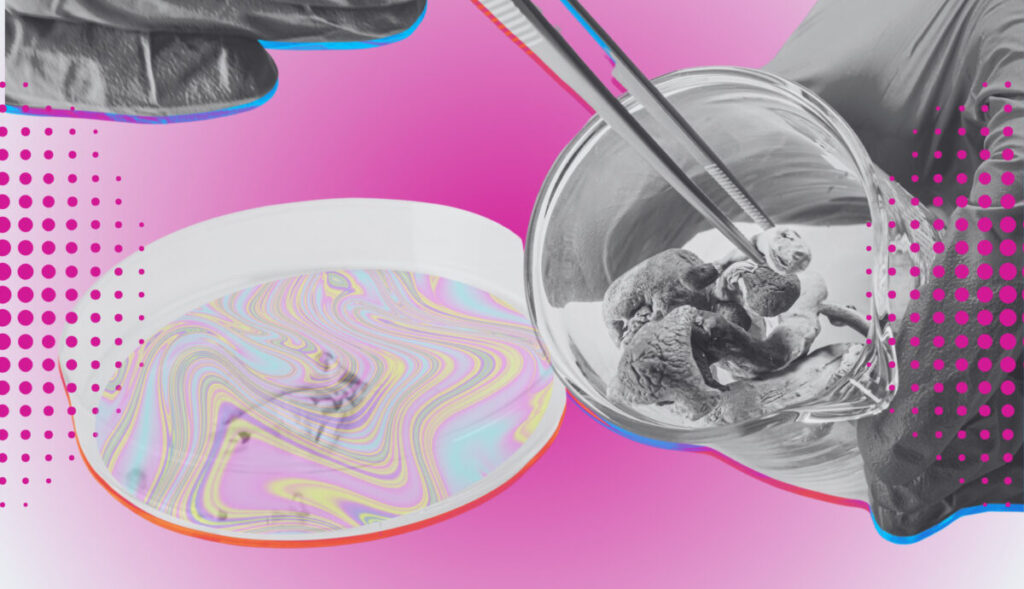
Such reports, however, will do little to convince the doubters. This skepticism is compounded by the trend of bots marauding social media conversations about psychedelics, relentlessly regurgitating pro-microdosing talking points and incessantly hawking magic mushroom capsules. The volume of posts, especially on X, has contributed to claims from psychedelics researchers that microdosing is “ridiculously overhyped and predatory.”
Already, there is survey data indicating that microdosing – popularized in Silicon Valley, but not so mainstream that CEOs can’t be fired for taking LSD before meetings – could be a salve. A 2019 paper containing more than 1,000 user reports from people in dozens of countries notes that spaced but repeated microdoses increases positive moods, alleviates migraines and eases premenstrual symptoms.
Other research – and numerous press reports, which began in 2015 when microdosing first entered cultural consciousness – presents the microdose as a versatile tool for increasing contentment effect and improving cognition.
“As of right now, there are still no published clinical trials investigating microdosing on people diagnosed with mental health issues, so their efficacy as a clinical treatment is unknown,” said Manesh Grin, a postdoctoral psychedelic neuroscientist, University of California, San Francisco.
The survey-based papers “generally don’t measure placebo or expectation effects and aren’t the most reliable,” he added, while “in laboratory studies, where they compare against a control group, people do often experience improvements in mood, anxiety, and other measures but so do the people who get an inert placebo and thought they got a microdose.”
The main challenge of the clinical microdosing studies undertaken so far is that most did not observe patients for any significant period – in which time a microdosing protocol might take effect. Perhaps the most robust microdosing study to date, conducted with LSD in New Zealand by University of Auckland associate professor Dr. Suresh Muthukumaraswamy on 14 patients over six weeks, suggests some benefits that are greater than placebo.
“My sense is that, if there are real effects, they are likely particularly for people who are struggling,” added Girn. “Whether they help people who are already healthy and high functioning is more of an open question, but the data so far suggests the effects might only be modest and largely placebo in most cases.”
Some are less enthusiastic about microdosing’s possible efficacy as they believe larger macrodoses, taken less often, are more effective and that there are emerging business interests behind the dubious bots – and others – who seem to want to sell folks a lifetime of pills.
“High-dose psychotherapy (is) about having this transformative experience that one learns from, whereas microdosing psychedelics would be … a traditional psychiatric medicine model,” psychedelic scientist Dr Matthew Johnson tweeted.
“Common for microdosing fans to say: any skeptic hasn’t tried it. Not true,” he said in another tweet last year. “I’ve know [sic] many people (including a number of scientists) who have taken plenty of psychedelics & are believers in high dose therapeutics, who have tried microdosing a bunch and say, meh, not convinced.”
But microdose advocates still maintain that smaller, more regular doses will be more practical, and cheaper, for most people than the hair-raising visionary trips scientists propel themselves into.
Hanka says his company’s data – from a new study led by Muthukumaraswamy – is promising, but that ultimately the jury is still out.
“I’d really like to know for sure that these drugs work better than antidepressants with lower side effects and that is exactly what we are trying to find out,” he said. “I am open minded and will be completely led by the data as we step through clinical trials.”
Studying the effects of a sub-perceptual medicine while calculating the impact of brain power may always be tricky, and the success of any microdose, self-help regime comes down to the intentions and discipline of the microdoser. But I don’t think my Instagram friends are tripping. They didn’t take large doses after all.
Interested in doing your own self-exploration? Consider our Microdosing Masterclass, your complete guide to understanding and integrating the best practices for effective microdosing.
In this episode, Joe interviews Paul F. Daley, Ph.D., who worked with Sasha Shulgin in his lab for the last seven years of his life, helping him finish (and co-authoring) The Shulgin Index, Volume One: Psychedelic Phenethylamines and Related Compounds.
He is now the co-founder, Chief Science Officer, and Director of Analytical Science at the Alexander Shulgin Research Institute (ASRI), focusing on the discovery and development of novel psychedelic compounds. While Sasha was passionate about self-experimentation, the Institute is aiming for the next step for these drugs: FDA approval.
He discusses:
and more!
The Pesticide Conspiracy, by Robert van den Bosch
*Book links are affiliate links, meaning that Psychedelics Today will receive a percentage of the sale
In this episode, Joe interviews Dr. Robin Carhart-Harris: founder and head of the Centre for Psychedelic Research at Imperial College London, founding director of the Neuroscape Psychedelics Division at University of California, San Francisco (UCSF), and founder of the Carhart-Harris Lab.
A legendary researcher, he talks about his psychedelic origins: studying Freud, Jung, and eventually Stan Grof and depth psychology to try and better understand the unconscious. He discusses the growth of psychedelics and the cultural shifts he’s noticed (especially in the U.S.), as well as what he’s working on today: researching the influence of psychedelics on set and setting by studying experiences in both enriched and unenriched environments.
He also talks about:
and more!
UCSF is seeking survey volunteers, so if you’ve had more than three experiences with ketamine, MDMA, and psilocybin (must have experiences with all three) and want to contribute, do so here.
“In my school of thought, that’s not the problem, that’s the opportunity. When something makes sense but it’s abstract, I’m more led by the fact that it makes sense. The abstraction is an opportunity. It’s a richness, a fertility, and we can really dig into that.”
“You notice when people really put mindfulness to the aesthetic, and they lower the lights and with the music: it doesn’t take long and that much effort, really, before it starts to feel like really caring – like actively caring. And it is an intriguing thing to think that that’s absent in the default, you know? That’s a thing that a colleague said to me once; that she loved the fact that psychedelic therapy brought back care. As someone who went into the mental health care profession, she felt like she could care again, for the first time in a long time. And that was not just ok, that was really promoted and made easier in a sense by the paradigm.”
“There’s different hierarchical levels to these assumptions, but the assumptions are often the problem. They guide our experience of the world, but they can entrench us in certain ways, and that entrenchment can be really at the heart of a lot of psychopathology, a lot of mental illness.”
“I guess one thing I’ve discovered, which is fantastic, is just seeing how broad the community is here around psychedelics, and generationally as well. In London, it was really just a young generation, but here, it really transcends generations, and I really appreciate that. There’s something very normalized about psychedelics here that I started noticing very early on; that it was a topic of polite conversation. …That felt like a glimpse of how it will be, not just here, but elsewhere in the future.”
Fill out UCSF’s survey (must have 3+ experiences with ketamine, MDMA, and psilocybin)
PT245 – Robin Carhart-Harris – Psychedelics, Entropy, and Plasticity
The Dream Drugstore: Chemically Altered States of Consciousness, by J. Allan Hobson
Pnas.org: Neural correlates of the psychedelic state as determined by fMRI studies with psilocybin
PT389 – The Art of Ecstasy: The 90’s British Club Scene and MDMA, featuring Rupert Alexander Scriven
In this episode, Joe interviews Dr. Kate Pate: Ph.D. neurophysiologist; Founder and CEO of Coruna Medical; founding board member of the Psychedelic Medicine Association; and Founder of The Way Back, a company that will provide education and coaching services related to military, veteran, and first responder health – often in wilderness settings.
She talks about her introduction to psychedelics through the Heroic Hearts Project, where she later served as an integration coach and director of research, looking at psilocybin for traumatic brain injury symptoms, and how the gut microbiome changes after ingesting ayahuasca. She points out that gut health hasn’t been a focus of research, but it’s now emerging as a key indicator of physical and mental health. So, how do psychedelics, particularly plant-based ones, come into play? Are the long term shifts after an experience related to a change in the bacteria inside of us?
She breaks down what a microbiome is and how it changes based on diet; how inflammation is created and the inflammatory cascade that happens after a head injury; how toxins create a stress response similar to an allergic reaction; the frustrations of vets and the limited resources of the VA; the commonality of substance and alcohol use disorders in people coming home from service; the many nonprofits she’s worked with; and how important it is to increase science funding from the government.
“There’s a very clear shift in the microbiome population in the individuals who consumed ayahuasca, and it seems to be correlated with the improvements seen afterwards. …I do think that, especially with the psychedelics that are ingested and that come from plants, really, there’s a direct impact on the gut, and I think that can be really beneficial. …There’s an experience that lasts a certain period of time, but there are these long-term changes that persist. And what’s mediating that? Is it just the psychological experience, the spiritual experience? Is it physiology? Are we talking about shifts in the gut or other things controlling inflammation? My suspicion is that it’s all of the above, but we can’t negate the physiological component.”
“Gut health and the GI system used to be sort of like this thing that nobody really cared about. It was not the sexy, fun topic. It was sort of an afterthought of like, ‘It digests your food, that’s all it does.’ And now, it’s the star of the show. I mean, there’s so much to understand and learn there that regulates everything about our physical and mental health, that I think it’s really the target of research in the future.”
“If you eat a Western diet and you drink a lot of alcohol, you’re likely going to have the type of bacteria that colonize the gut that thrive in those kind of conditions, which are more pro-inflammatory. So not only can the bacteria themselves signal the immune system directly, but the metabolites that they’re producing can be very inflammatory and toxic. And that can cause leaky gut, it can influence our nervous system, it can influence our immune system. And all of that can affect, ultimately, mental health, because mental health; all these anxiety and depression-like symptoms and disorders are very highly correlated with inflammatory conditions.”
Sciencedirect.com: Psychedelics as potent anti-inflammatory therapeutics
Psychedelicmedicinecoalition.org
Confessions of a Hope Fiend, by Timothy Leary
Here Comes Everybody: The Power of Organizing Without Organizations, by Clay Shirky
Psychedeliceducationcenter.com: Introduction to Psychedelics for Chronic Pain
Do women respond differently to psychedelics than men? And, if so, how are their needs different when approaching these powerful substances?
While crucial research is still limited to help us understand how and why the psychedelic experience might vary vastly among genders, the rise of female-only retreats, clinical settings, and thoughtfully designed psychedelic products and services, are helping provide women safer, more inclusive, and empowering psychedelic experiences.
In an article in MIT Technology Review focusing on women and psychedelics, Juan Pablo Cappello, co-founder and CEO of the ketamine therapy platform Nue Life said, “We started our company knowing that women over 40 are prescribed antidepressants at more than three to four times the rate of men, which has led to one in every five women taking an antidepressant to get through the day.”
Gender differences in the effects of psychedelics remain a topic of mixed evidence, necessitating further investigation. Nevertheless, gender-specific challenges persist. Safety concerns, childcare responsibilities, and the stigma linked to drug use are among women’s hurdles within the psychedelic landscape.
The redesign of healthcare services should prioritize women’s needs. Women frequently experience misdiagnosis and dismissive treatment from healthcare providers, emphasizing the urgency for a more attentive and responsive approach.
One aspect that merits attention is the potential impact of hormonal fluctuations on women’s psychedelic experiences. The menstrual cycle, pregnancy, and menopause can influence the subjective effects and therapeutic outcomes of psychedelics, underscoring the need for tailored research that considers these hormonal factors. Moreover, societal expectations and gender norms place pressure on women, shaping their experiences and interpretations of psychedelic encounters. The struggle to balance femininity, career, and family life can affect a woman’s sense of self and her ability to fully engage in the transformative potential of psychedelics.
With psychedelics being non-specific amplifiers, the external setting, the internal set — the mindset and psychological preparedness of the individual — plays a pivotal role. Women may face self-doubt, fear of losing control, or concern about exposure to vulnerable emotions during psychedelic experiences. Carhart-Harris et al. have emphasized the importance of context, including internal barriers that could potentially hinder the therapeutic benefits of the journey.
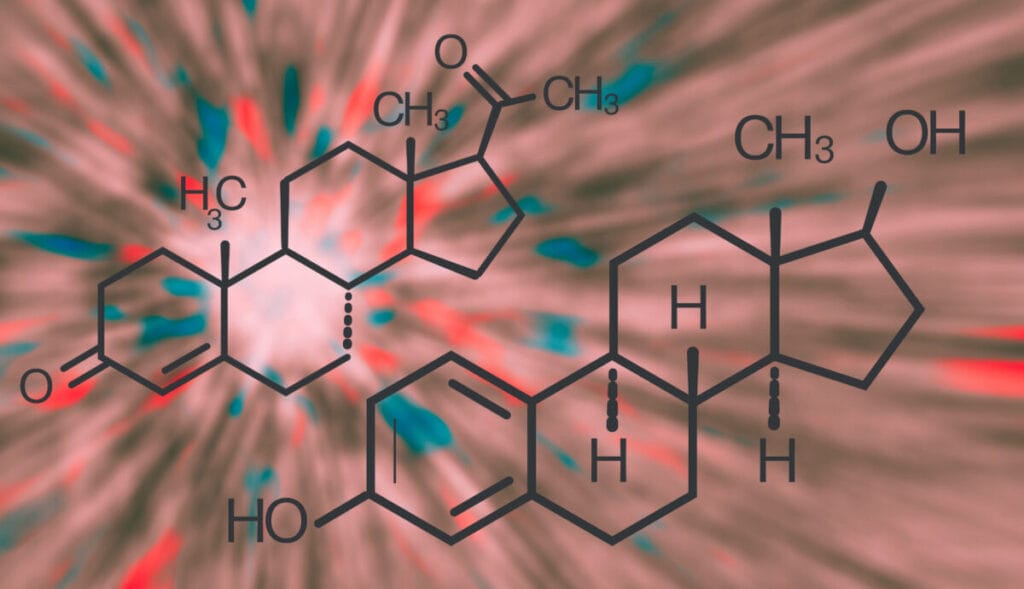
Historically, women have been underrepresented in clinical trials across various therapeutic areas, and psychedelics are no exception. For example, the term “inclusion of women” refers to the legal mandate outlined in the National Institutes of Health Revitalization Act of 1993, which requires the involvement of women as subjects in clinical research. This mandate applies to all clinical research funded by NIH unless it is deemed “inappropriate with respect to the health of the subjects,” “inappropriate with respect to the purpose of the research,” or “inappropriate under such other circumstances as the Director of NIH may designate.”
This gender bias limits our understanding of the specific effects, safety profiles, and therapeutic outcomes of psychedelics for women. The limited diversity among research participants has considerable implications for the generalizability and dissemination of treatments. Research suggests that women may exhibit different responses to psychedelics compared to men.
For example, a recent article examined the adverse effects of drugs targeting serotonin GPCRs in the CNS and PNS. These drugs interact with serotonin GPCRs in the brain and various peripheral areas, potentially causing side effects. Estrogen, which is more prevalent in women, influences serotonin synthesis and receptor densities, and drugs targeting serotonin GPCRs disrupt this process. The periodic increase in estrogen levels and the interference with the serotonin system mediated by estrogen could explain why women experience more adverse effects. Women also have lower serotonin concentrations and faster serotonin metabolism than men, which may contribute to the observed differences.
Biological factors, such as hormonal fluctuations, make research on women more complex and, therefore, more expensive. This highlights the necessity of considering gender as a factor in understanding the impact of psychedelics on mental health and well-being. Menstrual cycles, pregnancy, and menopause can influence the subjective effects and therapeutic outcomes of psychedelics. It is also worth consideration that many women experience disruptions in their menstrual cycles. According to the Kaiser Family Foundation in 2022, “most females ages 18-64 (90%) have used contraceptives at some point in their reproductive years, and most have used more than one contraceptive method throughout their lifetime (76%).”
Gender disparity extends beyond research and permeates psychedelic communities, retreat centers, and therapeutic settings. Women may experience subtle or overt forms of discrimination, objectification, or microaggressions, negatively impacting their sense of safety, trust, and overall well-being. Addressing these systemic issues requires a concerted effort to challenge and dismantle patriarchal structures, promote inclusivity, and amplify women’s voices within the psychedelic landscape.
The pharmaceutical industry’s growing interest in psychedelic therapy necessitates a deliberate focus on gender equality and inclusion. As psychedelics become more accepted by the mainstream, it’s essential to ensure that the creation, promotion, and delivery of psychedelic therapies take into account the specific needs of different genders. This entails promoting gender-balanced research teams, conducting gender-sensitive clinical trials, and tailoring interventions to address the diversity of the human species.
While exploring women’s experiences in the psychedelic space, it is also essential to recognize and acknowledge the intersectionality of gender. The experiences of non-binary individuals, as well as those who do not conform to traditional gender norms, deserve attention and inclusion in research and discourse. Non-binary individuals may face unique challenges in navigating psychedelic experiences as they navigate intersecting identities and societal expectations. Let’s foster an inclusive and respectful psychedelic community.
Today, there is limited psychedelic research on factors like drug metabolism, hormonal contraceptives, and womens’ unique physiological traits, hindering the development of tailored psychedelic guidelines and creating unique safety concerns for women who take psychedelics.
Variations in drug metabolism, potential interactions with hormonal contraceptives or reproductive health conditions, and other physiological factors may influence the safety and efficacy of psychedelic experiences for women. Though complex and expensive, funding research focused on women’s bodies and tailoring medicine accordingly will be a game changer.
Certain psychedelics have been associated with increased blood pressure and heart rate, potentially posing distinct implications for women compared to men due to physiological differences. The absence of adequate data raises obstacles in providing accurate information, guidelines, and risk assessments to support women in making informed decisions about psychedelic use.
Studies highlight the relationship between estrogen and serotonin 5-HT2A receptors. Classic psychedelics work by activating serotonin, and research indicates that estrogen enhances receptor density in brain areas governing mood, emotion, cognition, and behavior. This connection may offer insights into gender-based variations in conditions like schizophrenia and depression, more prevalent in women. Additionally, disruptions in estrogen during menopause could affect the 5-HT2A and brain-derived neurotrophic factor (BDNF) signalling pathway, potentially predisposing the brain to depression.
The scarcity of research on women’s experiences using psychedelics to support the process of motherhood and postpartum care poses additional challenges. The limited research perpetuates the perception that psychedelics may pose additional risks to pregnant women or those breastfeeding. Without concrete evidence, caution is often prioritized, leading to a blanket discouragement of psychedelic use during these periods. While caution is essential, the absence of research leaves the potential benefits or risks associated with psychedelic use during pregnancy or breastfeeding unclear, further perpetuating uncertainty and fear.
To address these concerns, there is a need for studies that examine the physiological, psychological, and experiential aspects of psychedelic use in women. Such studies should take into consideration menstrual cycles (including those influenced by birth control), hormonal fluctuations, and reproductive health.

The societal expectations tied to femininity and motherhood can significantly influence women engaging with psychedelics, similar to how men navigate their own situations and societal pressures. These norms shape our human experiences, create additional burdens, and contribute to safety concerns and stigma surrounding psychedelic use. Women may sense societal pressure to conform to traditional gender roles, limiting their willingness to explore psychedelic experiences. Fear of judgment and stigmatization, along with challenges reconciling maternal responsibilities, can constrain their ability to fully embrace the therapeutic potential of psychedelics.
Moreover, internalized notions of femininity can lead to self-doubt, fear of losing control, or concerns about expressing vulnerable emotions during psychedelic experiences. Women may grapple with the balance between societal expectations and personal growth, inhibiting their ability to surrender to the psychedelic experience.
The issue of sexual assault in psychedelic spaces has garnered significant attention in recent years, with instances of misconduct and exploitation reported within the community. Such incidents harm individuals and contribute to the stigmatization and fear surrounding psychedelic compounds. These concerns further emphasize the importance of providing safe and supportive settings, prioritizing consent and boundaries, and promoting gender equality.
While psychedelics hold tremendous therapeutic potential, the occurrence of sexual assault within psychedelic spaces remains a disturbing reality. Addressing conscious consent, creating safe environments, and implementing policies to prevent and respond to assault are crucial steps in fostering a culture of safety and respect.
After movements like #MeToo, female-only spaces have become safe havens for women to explore psychedelic experiences without fearing male dominance and sexual assault. These spaces provide a supportive and empowering environment, allowing women to navigate their journeys free from the constraints of societal expectations and potential gender-based harm. Such spaces recognize the importance of reclaiming agency, voice, and autonomy for women within the psychedelic realm.
Women-only retreats create a unique and transformative space for women to explore their inner worlds, cultivate deep connections with one another, and embark on journeys of self-discovery and healing. Such retreats provide a safe space where participants can fully embrace vulnerability. The absence of men often fosters an environment where women feel more comfortable sharing their deepest fears, hopes, and emotions. This sense of safety encourages authentic exploration and expression during psychedelic experiences, helping women ‘take up space’.
Women-only retreats tend to nurture a profound sense of sisterhood and community. The shared experiences, both during and between psychedelic sessions, can forge lasting bonds and connections. These connections often lead to a deep sense of belonging and support, facilitating sustained relationships beyond the retreat experience.
Women-only retreats also provide participants with the opportunity to explore and reclaim their narratives and identities. Many women join these retreats with experiences of societal and cultural expectations, traumas, and limitations. Psychedelic experiences within this supportive environment can pave the way for self-liberation, empowering women to redefine themselves and their place in the world on their own terms.
Many of these retreats often focus on the exploration and celebration of feminine energy and aspects of the self. This journey can be deeply healing, helping women reestablish a connection with their inner wisdom, intuition, and creativity. Additionally, it can foster a deeper appreciation for the unique strengths and qualities that women bring to the world.
Held frequently in natural settings, many women-only retreats incorporate rituals and ceremonies. Reconnecting with nature and participating in rituals can deepen the psychedelic experience, helping participants feel more in tune with the cycles of life and the natural world. This reconnection can be both spiritually and emotionally enriching, assisting many women in reconnecting with the cycles of their bodies.
In her role as a psychedelic facilitator, Jessika has witnessed women emerging from these retreats with a newfound sense of purpose, self-love, and empowerment. This unique quality of women-only retreats lies in their ability to provide a nurturing and transformative space where women can explore the depths of their psyche, connect profoundly with others, and emerge as stronger, more authentic versions of themselves.
Innovating with women-centered design in mind calls for products and services to be designed for, with, and by women, based on their specific needs. It also requires clearly conveying and enforcing guidelines for respectful communication, boundaries, and consent throughout the process.
The world we live in has been shaped by designers, and it is noteworthy that the creative industry, responsible for much of this design, tends to be male-dominated.
The seatbelt serves as the most cited example of a product designed for men but commonly used by women for safety. Using crash test dummies based on average male sizes and weights has resulted in significant safety disparities for women, making them 73% more likely to be injured in a car accident. Beyond physical safety concerns, women face ongoing challenges related to everyday comfort and practicality. Consider the dilemma faced by pregnant women when deciding whether to position the seatbelt above or below their bellies. Another everyday example is the smartphone, tailored for the average male hand, and transforming into a cumbersome object in the grasp of the average woman.
Taking into account the significant impact of these design hurdles on women’s lives, it warrants a thoughtful approach to designing specifically for women in the context of mind-altering substances. Jemma Campbell, head of U.S. creative of Moving Brands, notes “It is very easy to think that design is aesthetics and aesthetics alone. Design is about much more than aesthetics – it’s about solving real-world problems and improving lives. When done right, it gives brands the ability to build connections with people much like human relationships.”
Focusing solely on aesthetics and neglecting research, strategy, and the overall product experience means you might project your own perspective, adopt codes rooted in learned behaviors and societal norms, and follow cues that may not lead to the best solutions.
“So, when it comes to creating women-only spaces for psychedelic treatment, when patients may feel vulnerable and exposed, we need to fully understand and reflect their unique needs and experiences. And that means women designers must not only be involved – they must be leading the vision,” Campbell says.
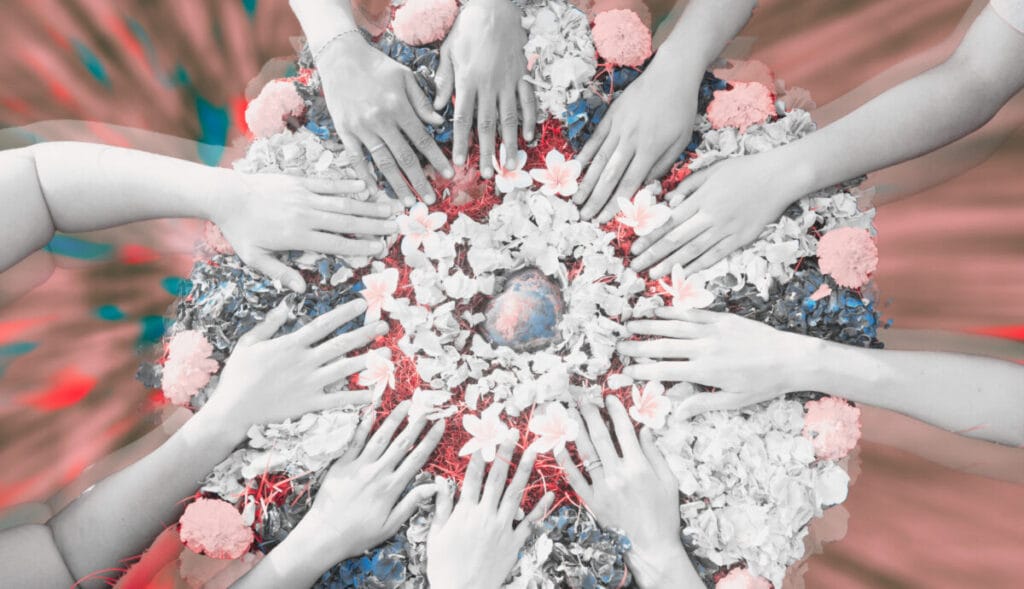
Include More Female Designers, Scientists, Researchers, and Engineers
Women buy or influence 85% of all consumer purchases, control 73% of household spending, and make 69% of household health decisions. However, research consistently demonstrates that women are not satisfied with the product and service innovations offered to them. One possible reason: 85% of product designers and engineers are men. In areas like healthcare, where setting and environment are critical, designing with empathy is vital. It’s what makes having diverse design teams so important. Therefore, actively seek the involvement of more female designers, scientists, researchers, and engineers. Diverse teams bring a broader range of perspectives and insights, essential for understanding and meeting the unique needs and preferences of women consumers.
Listen and Learn
Cultivate a culture of inclusivity and diversity within design teams, fostering an environment where women from diverse backgrounds feel comfortable sharing their perspectives and experiences. Actively listen to their feedback, concerns, and ideas, and use this input to drive innovation and product development. Establish a safe and confidential space where women can share without judgment or fear of repercussions. Start small and build it organically.
Increase the representation of women in leadership positions and decision-making roles within design and engineering teams. When women have a seat at the table, they can advocate for designs and innovations that better resonate with female consumers.
User-Centered Design
Prioritize user-centered design principles, ensuring that products and experiences are designed with women in mind. Conduct thorough research to understand their needs, preferences, and pain points, involving women from diverse backgrounds and age groups. The experience doesn’t commence solely upon entering a clinic, retreat space, or product use; it begins with communication. For instance, inviting individuals to observe a retreat to ease them in or incorporating controlled microdosing to facilitate their entry could be part of designing the overall experience.
Collaboration
Collaborate with women’s organizations, advocacy groups, and female-focused communities to gain insights and build strong connections with potential users. These collaborations can lead to valuable co-creation opportunities.
In an ideal healthcare scenario, we envision truly bespoke care tailored to individual needs, irrespective of gender, becoming the norm. While acknowledging the historical challenges and potential future obstacles, we, as professionals, understand the complexities. Yet, as women, we recognize the oversight of subtle but crucial distinctions in female bodies and systems. The lingering patriarchal influence in Western research, product, and system development is a fact. We are now on the journey toward equal opportunities. Undertaking specialized research, embracing user-centered design, and holding space to heal past trauma, we hope to see a more inclusive and supportive psychedelic landscape, where everyone’s distinct needs and perspectives receive the recognition and respect they deserve.
In this episode, Joe and Kyle are honored to welcome back Stanislav and Brigitte Grof: Stan being the person who kickstarted their interest in non-ordinary states of consciousness, breathwork, and this podcast; and Brigitte: his other half, co-creator of Grof® Legacy Training, and support system (and often, voice) since his stroke a few years back.
They discuss the recently released Stanislav Grof, LSD Pioneer: From Pharmacology to Archetypes, which Brigitte assembled in honor of Stan’s 90th birthday. It celebrates his life’s work in pioneering research into non-ordinary states of consciousness and transpersonal psychology, and features an extended interview with Stan; testimonials from a number of legends in the psychedelic and psychological fields like Jack Kornfield, Rupert Sheldrake, Richard Tarnas, and Fritjof Capra; and a large photo album of rarely seen pictures, including Stan doing his first experiments with LSD.
And they talk about so much more: The evolution of LSD psychotherapy as Stan realized people’s experiences were coming from the psyche rather than any pharmacology; why he started practicing and teaching breathwork; Stan’s love of treasure hunts; how the perinatal matrices were born and how each corresponds to astrology and religious archetypes; why experience in breathwork can be so beneficial to better psychedelic experiences and facilitation; why integration is equally as important as the experience; and an argument to take archetypal astrology more seriously – that there is often a synchronicity that can’t be denied between these archetypes, events, and experiences.
“I was surprised that people were having very, very different experiences. And then when [they] had these substances repeatedly; then again, it was completely different. …So I realized that this had nothing to do with chemistry, this had nothing to do with pharmacology, and that it’s basically about the psyche.” -Stan
“I have to say I’m extremely grateful for the map that he found and he gave to all of us, especially in The Way of the Psychonaut, his life’s work, encyclopedia. All the knowledge is there. And when I go to these places myself and I get into the pits, I can, in the back of my head, remember, ‘Oh, this is what Stan was writing about, so it should be okay. I’m going to get out of this.’ So I think everybody who is doing these journeys should know about Stan’s findings. It’s just so mega helpful.” -Brigitte
“When you hear what people say later or you see the creativity and the power of energy that gets released, then the liberation, it’s so amazing, and so healing and very exciting. And the people sometimes say, ‘How do you live with all that screaming?’ And I said, ‘Well, it’s music in my ears, because so much of the suffering is silent. So when these things come out and they get expressed, they’re leaving the system and people get liberated. So once you understand that, then you’re good.’” -Brigitte
“When we do breathwork, then you add to it breathing, and actually, the intelligence; it brings its own thought. And then of course, bringing in LSD, psychedelics: it’s even further. But the idea is to always work with the psyche. You don’t need any specific tricks.” -Stan
The Way of the Psychonaut: Encyclopedia for Inner Journeys (Volume One), by Stanislav Grof, M.D., Ph.D. (Volume Two)
Stanislav Grof, LSD Pioneer: From Pharmacology to Archetypes, by Brigitte Grof
Psychedelics Today: Renn Butler – Holotropic Breathwork and Archetypal Astrology
The Tim Ferriss Show Transcripts: Stan Grof (#347)
Cosmos and Psyche: Intimations of a New World View, by Richard Tarnas
In this episode, Kyle interviews Bessel van der Kolk, MD: pioneer clinician, researcher, and educator on traumatic stress; Founder of the Trauma Research Foundation; Professor of Psychiatry at Boston University Medical School; Principal Investigator of the Boston site of MAPS’ MDMA-assisted psychotherapy study; and author of the #1 New York Times Science best seller, The Body Keeps the Score: Brain, Mind, and Body in the Treatment of Trauma.
As of this recording, van der Kolk was publishing his last paper and closing down his laboratory, so he looks back on his past: being part of the group who put together the first PTSD diagnosis in the 80s; the early days of psychedelic research and how he discouraged Rick Doblin and Michael Mithoefer from pursuing MDMA research; how the DSM has no scientific validity and was never meant for the diagnosing it’s being used for; how science wasn’t seeing the whole picture and pushing us mindlessly from medication to medication; and how trauma research has evolved over the years as society learned more about how the mind actually works.
He discusses the struggle to validate “softer” sciences; the impracticality and price of the MAPS protocol and the need for more group and sitter/experiencer frameworks; the efficacy of psychodrama and how that plays out in group sessions; his interest in using the Rorschach test more; how rolfing helped him; the problem with diagnosis and people becoming their illnesses; bodywork, somatic literacy, and how disconnected most people are from their bodies; and how, in all the healing frameworks he’s explored, he has never seen anything work as profoundly as psychedelic-assisted therapy.
“I have quite a few friends who are sort of major scientists. And I asked my friends, ‘So, did you take acid also in college?’ All my friends said, ‘Yes, I did.’ And I say, ‘So, how do you think it affected you?’ And my friends generally say, ‘Well, I think it really accounts from my having become a good scientist, because I got to appreciate that the reality that I hold inside of myself is just a small fragment of the overall reality that is.’”
“It was really very gratifying for me to be part of a psychedelic team the past 10 years or so, where we got to see the astounding transformations that people go through on psychedelics – more than anything else that I’ve seen in my career, and I’ve studied many different methods. I’ve studied other things that also turned out to be quite helpful like EMDR and Internal Family Systems therapy and theater and yoga, but the transformations on psychedelics were really astonishing and made me really hopeful that we may enter a much more complex era of thinking about mental functioning.”
“It’s delicate, but we keep running away from it. But the reality is that if you really feel upset, getting a hug from somebody who loves you makes all the difference in the world, of course. That’s still our primary way in which we feel calm. And touch by other people may also scare the shit out of you and send you into a tailspin. So doing that right is very delicate and fraught with danger, but that doesn’t mean we can just keep running away from it.”
Neurosciencenews.com: Why Our Brains Prefer Symbols to Words
Mangu.tv: From Shock To Awe: A journey of hope and transformation
In this episode, Joe interviews neuroscientist, board-certified psychiatrist, health tech entrepreneur, inventor, and Co-Founder & Chief Medical Officer at Apollo Neuro: Dr. Dave Rabin, MD, Ph.D.
He talks about his path to psychiatry; his realization that trauma and chronic stress were primary themes at the root of most mental illness; and the creation, research and implementation of the Apollo wearable: the first scientifically-validated wearable technology designed to improve energy, focus, and relaxation based on touch therapy. The idea was born from Rabin asking himself: If we’re all starved for touch and constantly feeling unsafe, our bodies prefer a calm, soothed state, and MDMA seems to work by amplifying feelings of safety and essentially telling our brains, “you’re safe enough to heal now,” could a rhythmic vibration programmed to stimulate touch receptors and put our bodies into a meditative state fool our brains into the same perceived feeling of safety – especially if that stimulation is constant? Would our nervous systems be able to tell the difference? So far, the data seems to prove that this technology works.
He discusses what they learned from initial research about how people were using their Apollo wearables; heart rate variability and what changes it; MAPS’ Phase III MDMA-assisted psychotherapy results; the idea of the inner healer; using the Apollo in conjunction with ketamine and other psychedelics to ease pre-experience anxiety; and the concept of MDMA-assisted psychotherapy as reverse trauma, the reality that it could stop epigenetic memory, and the question of whether or not the Apollo can do this on its own.
Apollo Neuro is continuing their research by running 14 different trials right now, and if you ever participated in a MAPS trial, you’re eligible for a free wearable. If you’re just curious about trying the Apollo, you can receive $50 off using this link.
“What we’ve learned through the study of all the work that came before us was that the body actually likes to be in that state. It likes to be in this calm, soothed state, and it’s just overwhelmed and overstimulated a lot of the time and that’s why it’s not in that state. So then the research question was: If we deliver the rhythm that our bodies like to breathe at when they’re at rest (which is like five to seven breaths per minute when we’re normally breathing at 12 to 24 breaths per minute, which is stress breathing), then would the body start to automatically breathe at its ideal rhythm on its own simply by receiving the right rhythm? Is that enough? Like, if you play the right dance beat, will people start dancing on their own or will they just sit in the chair?”
“The word ‘hallucination’ implies that what you’re experiencing is not real, and I hesitate to use that word in the context of psychedelic work because ‘psychedelic’ means to reveal the mind. And so, if we put out the understanding that the revelation of what’s underneath the surface of our consciousness in our minds is not real or hallucinatory, then we might be missing a lot of the meaning of what’s actually underneath the surface.”
“If we are able to show that other safety-based treatments, whether it’s MDMA or traditional ceremonial ayahuasca or other things, or ketamine therapy, or Apollo, or soothing touch: If any of these things are inducing similar changes to cortisol receptors that we saw in that MDMA trial, then we know it’s not the drug that is inducing the healing state. It’s the safety that is amplified by the drug that produces the healing response. And that will be really, really helpful to us as a field to understand what we actually need to heal. I think the theory is [that] we need to feel safe enough to heal. This would actually prove that.”
Apolloneuro.com: studies roundup
The Psychedelic Report: Can MDMA-Assisted Therapy Repair our Epigenetics with Dr. Candace Lewis PhD
Your Brain Explained: Breaking Down Trauma w/ Dr. Gabor Maté & Dr. Rachel Yehuda
In this episode, Joe interviews Imran Khan: Executive Director of the UC Berkeley Center for the Science of Psychedelics.
Khan shares his journey into the world of science and policymaking, beginning with science journalism and inspired by David Nutt’s famous ‘Equasy’ paper and subsequent firing for telling the truth. Realizing how strong the disconnect was between political and science worlds, his goal became to represent science when it comes under attack; using campaigning, lobbying, advocacy work, etc., and essentially becoming a translator between science and society – bringing these overly complicated concepts down to a level every day culture can understand. At UC Berkeley, he’s focusing on research, training scientists to be better communicators, educating the public on the benefits of psychedelics, and trying to make research more trustworthy.
He discusses the word “science” and how it’s used to describe lots of things; the hard problem of consciousness; color constancy, perception, and the influence of priors; the risk of abuse in all therapies; trust and why people don’t always “trust the science”; the risks of putting too much faith in experience insights; the word “sacred”; and more. He concludes by discussing the findings of the first UC Berkeley psychedelic survey, which revealed public sentiments and attitudes towards psychedelics, and, while mostly positive, truly proved the need for people like Khan to be out there educating the public.
“They fired [David Nutt] from his role as Independent Advisor and Chair of this Advisory Council on Misuse of Drugs. So I’m sitting there as this 20 year-old that all I’m there to do is care about how science works, and how do we protect the voice of scientists in policy-making, and how do we ensure that policy is informed by the evidence rather than going in the face of it, and right in the middle of that, this very high profile scientist basically gets sacked by the government for basically just saying what the science says, which, as far as I can see, was all he was being asked to do.”
“It’s really hard to look at the experience of being human and this amazing, vivid, technicolor experience we have of walking around and doing everything from drinking coffee to walking a dog to looking at a sunrise, and not being totally bemused that that experience can be generated by this two pound lump of mostly water with a bit of fat and protein mixed in in our skulls. That just seems like an insane proposition to me. So I remember when I was learning about that in my undergraduate and kind of trying to figure out the basic principles of neuroscience, it just seemed like this amazing question of: How can this ever be possible? This doesn’t seem like it should compute.”
“Experiences with psychedelics later as well, I think lead you to a similar place in that if you disrupt ordinary waking consciousness, you can almost start to see the way in which your brain changes its production of consciousness. And the idea that that dramatic change can be induced by chemicals that we know the structure of and we can characterize and we can understand how they interact with the brain, again, just feels like an interesting kind of chink in that bigger question of: What is consciousness and who are we, and how do we relate to the rest of the world?”
I Feel Love: MDMA and the Quest for Connection in a Fractured World, by Rachel Nuwer
In this episode, David interviews Alexander Beiner: an Executive Director of Breaking Convention; writer of The Bigger Picture substack; and author of The Bigger Picture: How Psychedelics Can Help Us Make Sense of the World.
He tells his personal story and how his first psychedelic experience felt like a homecoming; discusses his Rebel Wisdom media platform, where, through interviews, he tried to make sense of social upheavals and conflicts through a more flexible, psychedelic way of thinking; and digs deep into the Greek concepts of Moloch and Kairos: how Moloch represents the winner-take-all, race to the bottom, sacrifice-your-values-to-appease-the-system game playing we all get stuck in, and Kairos represents the openness that comes from psychedelics – the transitional, seize-the-moment opportunities we need to take advantage of. And he discusses much more: the power of dialectic inquiry; the corporatization of psychedelics and how we’re really in a psychedelic enlightenment; how the medicalization of psychedelics is like a Trojan horse; and the concept of technology (and specifically the internet) mirroring the switching between realms that we think is so rare in psychedelics – aren’t we doing that every time we look at our phones?
Beiner was recently part of Imperial College London’s initial trials on intravenous, extended-state DMT, testing correct dosages and speeds for the pump. He describes the details of the study, how he thought they were messing with him at first, and what he saw in his experiences: an outer space-like world of gigantic planet-like entities, and how a massive Spider Queen entity taught him about intimacy and how our metaphysical and personal worlds aren’t separate at all.
“There’s a particularly psychedelic way of thinking in my view. …I would define it as a flexibility in how we think and a looseness and a creativity and a playfulness with how we approach the world that psychedelics can open up in us. And I think that’s so deeply needed right now. So my hope is to kind of combine that ethos together with a lot of very practically important, interesting, sociological, psychological, scientific, and metaphysical insights, and use all of that to write a book that hopefully gives people new lenses in which to make sense of the world and psychedelics.”
“The process of speaking to the truth of your lived experience in the moment is deeply transformative. And it’s also, in my experience and I think the experience of many people, it’s what psychedelics encourage us to do: They encourage us to be with the truth of our experience and go into what we’ve been hiding from and avoiding, and feel it – feel the truth of what’s actually going on. And that is so, so powerful culturally because so many of our cultural shadows and our polarization and our ‘at each other’s throats’ and our ideological fixations come from these unsaid things. So there’s so many practices, psychedelics included, that can open us up into the truth of what’s going on. And I think that is just the most transformative practice or approach that there is that I’m aware of.”
The Bigger Picture: How Psychedelics Can Help Us Make Sense of the World, by Alexander Beiner
Poetryfoundation.org: Howl, by Allen Ginsberg
Slatestarcodex.com: Meditations on Moloch, by Allen Ginsberg
YouTube: The Rise of Psychedelic Capitalism
Alieninsect.substack.com: DMTx: The First Results…
In this episode, David interviews psychiatrist, main researcher behind the first US Phase II trial of MDMA-assisted psychotherapy, and Senior Medical Director at MAPS Public Benefit Corporation: Dr. Michael Mithoefer; and Research Group Lead at the University of Zurich, and Principal Clinical Biomarker Lead at Boehringer Ingelheim, Katrin Preller, Ph.D.
Mithoefer, Preller (and David) are speakers at Psychedelic Medicine – Israel, which will now take place July 28 – 31, 2024, in Tel Aviv. They discuss the conference and their current research: Preller’s neuroimaging and work with psilocybin for alcohol use disorder, and Mithoefer (likely) being extremely close to seeing the FDA approve MDMA-assisted psychotherapy. He talks about how the therapeutic protocols for MDMA-assisted psychotherapy were created, what it’s like to be so close to legalization, and how the next challenges will be accessibility and not minimizing therapy in favor of faster turnover.
They discuss neuroplasticity and whether or not it actually translates into something in humans; the concept of performing brain scans before a psychedelic experience to look for trauma biomarkers (and how this could actually result in savings over time); the excitement of seeing clinical work and neuroscience progressing in parallel; why integration frameworks need to be individualized; and the importance of embracing different therapeutic approaches.
“We need to find ways to make it increase the cost effectiveness or the efficiency without losing the human connection and the inclusion of robust therapy in the process. So it’s a big challenge. But in the research, we’ve done everything we could think of to increase the chances of safety and success and efficacy. So we couldn’t individualize. So I think part of it will be figuring out: some people may need even more support than they had in the research, but some people may be able to do it in a more streamlined way, and also groups and things like that. So I think we need to be really creative about how to do it and also resist the pressures of minimizing the therapy and the human connection in favor of speed.” -Michael
“We’ve already shown in healthy participants that basically the way your brain is working without any substances on board is associated with the way your brain reacts to a psychedelic. And we’ve seen that across different brain metrics. That doesn’t tell us anything about clinical efficacy quite yet, but it tells us that there is something in your usual daily waking state that may have to do with how you react to a psychedelic. Now, the next step would then, of course be: well, can we close the gap on how you react to the psychedelic, whether that has something to do with whether or not you actually get better after psychedelic or MDMA-assisted therapy? So there are many gaps for sure at this point, but I think that doing this research, we may eventually be able to close these gaps and eventually maybe have an idea of who may benefit, who may not benefit, [or] whether MDMA is the correct or the most beneficial treatment versus psilocybin.” -Katrin
“One of the dangers I see if these drugs are approved is thinking you need more drug, you need higher doses, you need it more often or whatever, instead of: You need more integration.” -Michael
Pharmaco-Neuroimaging and Cognitive-Emotional Processing (PD Dr. K. Preller)
LSD Psychotherapy: The Healing Potential of Psychedelic Medicine, by Stanislav Grof
In this episode, Melanie Pincus, Ph.D. and Manesh Girn, Ph.D. once again take over hosting duties, this time interviewing Gül Dölen, MD, Ph.D.: Associate professor of Neuroscience and Neurology at the Johns Hopkins University, School of Medicine, and head of the Dölen lab.
Dölen largely researches the neuroscience behind social behaviors and is most known for her work in establishing how psychedelics reopen critical periods of learning, and that the true benefit of psychedelics could be in learning how best to reopen those critical periods, how long they’re open for, and which therapeutic frameworks and integration practices could best take advantage of them. Her most recent research was giving MDMA to otherwise very asocial (and violent) octopuses to prove that a drastically different species would exhibit typical MDMA-inspired prosocial behavior. And, after discovering that all the classic psychedelics worked to reopen critical periods – that psychedelics are apparently the master key to opening these periods – she’s now researching why, through the PHATHOM project (Psychedelic Healing: Adjunct Therapy Harnessing Opened Malleability).
You will likely learn a ton in this episode: why critical periods close as we get older and what may impede them from opening more often; how plasticity and metaplasticity relate to each other and why increased neuroplasticity isn’t always a good thing; how the length of different psychedelic experiences relates to efficacy; why the different results of MAPS’ and Compass Pathways’ studies show the importance of therapy; how autism could be related to critical periods; why repeated psychedelic use may make it harder for one’s brain to reset; and how important context is in the ability to reopen critical periods – especially around social learning.
“I was at Johns Hopkins and I remember my department chair was like, ‘Gul, we hired you to cure autism. What the hell is this octopus MDMA [stuff]?’ And I was like, ‘Just wait, it’s going to be awesome. You’ll see.’”
“We were really surprised that they all reopened this critical period. And what it suggested to us is that what it feels like to reopen a critical period is just what it feels like to be in that altered state of consciousness that’s shared across all of the psychedelics.”
“[Psychedelics] have this thing which all of the drug companies are seeing as a glitch, but I actually think is a feature, which is this context dependence. So, the fact that the drugs are context-dependent means that you’re only going to reorganize the extracellular matrix and the network of synaptic plasticity at these synapses within these circuits in the subset of circuits and synapses that are relevant to that particular context or that set of memories. And because you’re sort of fine-tuning it in that way, I think it somehow circumvents this problem of structural instability or amnesia. So we’re going to spend the next 10 years trying to figure out how the neurons know what context they’re in.”
“Really, the utility of psychedelics is pairing it with a therapy, and that the therapy is the principle and the psychedelic is just the adjunct therapy that makes that learning so much easier. And so, the way I would frame it is that right now, we’re at a kind of debate point between the biochemical model and the learning model of how not just depression, PTSD, but every disorder of the brain is, in some sense, a disruption in the learned pattern, and that if psychedelics are not just restoring a biochemical imbalance but enabling learning, then we can relearn. And that would really be a paradigm shift in our way of understanding why psychedelics are useful in so many different therapeutic contexts and what other diseases and non-diseases we might be able to use psychedelics to help treat.”
Pubmed: Oxytocin-dependent reopening of a social reward learning critical period with MDMA
Nature.com: Psychedelics reopen the social reward learning critical period
PHATHOM (Psychedelic Healing: Adjunct Therapy Harnessing Opened Malleability) – Stroke Project
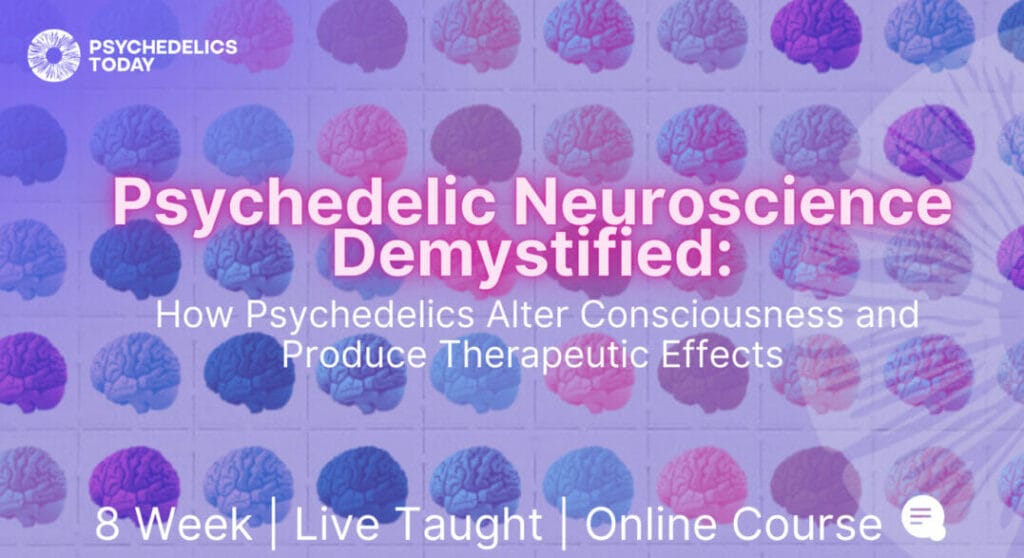
In this episode, Johanna interviews Jungian analyst-in-training, writer, researcher, 5Rhythms® teacher, and Vital graduate: Mackenzie Amara; and Vital instructor, clinical psychologist, and creator of our new course, “Illuminating the Hidden Self: Navigating the Jungian Shadow with Psychedelics“: Dr. Ido Cohen.
This sequel to their fascinating discussion about shadow work earlier this year focuses on dreams, as Amara, while dreaming that she was having an acid trip and coming to the realization that dreams and LSD may be sending her to the same place, is researching the similarities between the odd worlds of dreams and psychedelic experiences: Is it the same place? Do the dreams we have after psychedelic experiences continue those visions and ‘Aha!’ moments? Can they answer questions for us (the concept of “sleep on it”)? Does dream analysis result in a greater feeling of integration? Can we use the dreams we have before experiences to help guide the experience itself?
The conversation goes a lot of places: the many aspects of Jungian psychology; the fluidity of Indigenous perspectives around visible and invisible worlds; how Jung wrote “The Red Book”; the concept of eros and reclaiming our relationship with aliveness; how nature is in constant equilibrium (as are we); how to build a relationship with your dreams; how to work with symbols in dreams; and much more. Ultimately, this episode is about the clash between the conscious and unconscious, the willed and the incidental, and waking life and other realities, and dream analysis and integration work is really tracking vitality in the human psyche: what is alive in us and how does it want to live out in our beings? What makes us come alive? Can our dreams tell us?
“I was inside my dream, analyzing my dream, and having the phenomenological experience of being on LSD, and it was like, ‘Holy shit, is this the same place?’” -Mackenzie
“When you sit with a dream image that maybe scares you or that you avoid: When you sit with it long enough for its purpose to be revealed, it’s like, ‘Man, cool, thank you for sending me that image.’ And you can start to trust that there’s something larger inside of you that has your back. And that level of trust, that level of existential secure attachment (is what I’ve been calling it lately) is un-fuck-with-able. Nobody can take that from you. Once you have that, you’re good. All the chaos can happen around you, but you’ve got something inside of you that nobody can touch.” -Mackenzie
“These are all experiences with the numinous. The numinous wears all the shapes. It’s only our human hubris that searches for it in particular shapes. If we kind of quiet that hubris a little bit and let the self, let the numinous talk in its own language for a second, we can all be humbled to see how vast its language is and how it can find us even in the most ridiculous images.” -Ido
“When we have these experiences, when we’re given this content from our unconscious, it’s an invitation to join the family, to join the life that is living through all things. And that to me, is just really, really hopeful, and I think it’s why I’m so inspired and passionate about psychedelics, is the possibility of them to alleviate that nihilistic thought pattern that says ‘I’m alone in this world.’ When we really, really feel into what’s happening for us, it’s collective. We’re in a collective experience, constantly, all the time. And that’s really beautiful and healing.” -Mackenzie
PT390 – Vital Psychedelic Conversations, featuring: Mackenzie Amara & Dr. Ido Cohen
Illuminating the Hidden Self: Navigating the Jungian Shadow with Psychedelics
Kannaextract.com (Use code PT10 for 10% off!)
In this special episode, Melanie Pincus, Ph.D. and Manesh Girn, Ph.D., who joined David in episode 403 to discuss the launch of their new course, essentially interview each other.
As the 2nd edition of their popular course, Psychedelic Neuroscience Demystified, begins on November 1, we wanted to give them a chance to highlight some of the aspects of neuroscience students can expect to learn in the course, and what so many people who are interested in psychedelics don’t fully understand: What does neuroplasticity actually entail? Can one predict if a patient is more apt to have an experience with ego dissolution? How does the amygdala relate to mood disorders? When are critical periods of greater plasticity and socialization at their most beneficial? How does neuroplasticity relate to chronic stress?
They also discuss lessons they’ve received from their own journeys; why they created the course; serotonin; psychological flexibility; body-based versions of self vs. memory-based versions; psychedelics and re-encoding memories (and the potential for false memories); how psychedelic therapy is different from standard drug treatments; psychedelics and the default mode network (is the story oversimplified?), and much more.
For more information on their course, and to sign up, click here!
“A major insight from my psychedelic journeys is just how dense and heavy thoughts and mental content can be. And we often feel the need to overanalyze and think about things and get lost in our concepts and internal dialogue as opposed to experiencing things in the moment, as they are, in a more deeper kind of intimate way – having a greater intimate relationship with our senses, with the immediacy of what’s happening. And my psychedelic experiences, whether it’s with psilocybin or 5-MeO-DMT or what have you, have allowed me to glimpse into states where that stuff is just totally removed, and I’m just immersed in the rawness of experience and just how beautifully vibrant and alive and spontaneously intelligent that is, and how superfluous a lot of our thinking really is, and it just weighs us down. I think my journeys have just allowed me to live with greater ease and hold on to my identity and my narratives much more lightly. So I see them, I acknowledge them, but I’m not totally lost in them. I don’t identify strongly with them.” -Manesh
“Perhaps what’s happening is that MDMA induces a super positive mood where you feel really socially connected, really empathogenic with your therapist or whoever’s around you, you feel so safe and supported. And so if challenging traumatic memories come up, there’s this mismatch between the emotional trace of the traumatic memory and the unique state you’re in with the MDMA on board. And so this mismatch drives the memory reconsolidation process so that your traumatic memory is amended with less fear to be more in line with your current way you’re feeling of being so safe and supported.” -Melanie
Opening Critical Periods with Psychedelics, by Melanie Pincus, Ph.D. & Manesh Girn, Ph.D.(c)
PT258 – Manesh Girn – Psychedelics and the Brain: Neuroplasticity and Creativity
In this episode, David interviews Dr. JoQueta Handy, Ph.D., IMD: speaker, author, educator, Natural Integrative Health Practitioner, and CEO and Chief Visionary of Brilliant Learning, Handy Wellness Center, and Brilliant Blends.
She shares childhood memories of growing up on her Grandparents’ farm, where she developed a deep appreciation for nature, staring at the stars, and the beauty in stillness, and how coming back to that stillness has been key in her life and psychedelic journeys. The conversation then shifts to all that she’s learned through her work with children on the autism spectrum: the problems of putting people into boxes; how autism affects everyone; the different ways people learn; the connection between autism and the gut microbiome; and how she has learned more from some of these children than any book could teach her – culminating in a story of discovering that a very challenged child people were ready to give up on could actually read and comprehend everything he was hearing.
She discusses her favorite adaptogens; the art of stacking adaptogens and different modalities; her multi-day coaching sessions; Internal Family Systems; quantum biofeedback; the use of supplements in microdosing; and Brilliant Blends, which sells blends of supplements designed to provide benefits as close to what psilocybin can provide (but legally) – inspired by the unique needs of autistic individuals. PT listeners can receive 10% off all purchases with code: PT10.
“If we look at Western medicine, we are masters at saving lives. We’re not so great at quality of life. And looking more toward Eastern medicine, European medicine: where body, mind and soul [is] more brought into play – healing, working on the mind, the emotional, the mind and the body for a complete healing… So that was really why I chose the path of natural integrative medicine because I did see that everything has a place. Everybody brings a talent to the table. …We, many times, need a village for healing.”
“I’ve had some wonderful mentors along the way, but being on the ground, so to speak – not just in a laboratory, formulating things – being hands-on with those children on a day-to-day basis: that was the greatest teacher of: how is this herb working? How is this adaptogen working? So when I went to formulate Brilliant Blends, I just knew it had to honor them because I was using that knowledge base. I use it on a daily basis with everyone. …Autistic children have taught us what we know from autism, and what we know from autism applies to everyone.”
“That’s the end game. That’s the bottom line in all of this work that we’re doing. That’s where the transformation and freedom is: to realize that this medicine is in all of us. Maybe we’re just using psychedelics to open that door to reveal it and show us the path how to anchor it, but this medicine is in all of us and always was. So if we can use these different pathways, these different approaches to lead us back home, then bravo.”
Mybrilliantblends.com (use code PT10 to receive 10% off all purchases)
Hemplucid.com (use code PSYCHEDELICS10 for 10% off all purchases)
In this episode, Kyle interviews The Susan Hill Ward Endowed Professor of Psychedelics and Consciousness Research at Johns Hopkins, and renowned researcher of nearly 20 years: Matthew W. Johnson, Ph.D.
Recorded in-person at MAPS’ Psychedelic Science after running an 8-hour workshop on psychedelic therapy for addiction treatment, Johnson was still happy to sit down with PT to explore a wide range of topics: the under-researched concept of integration; how to best take advantage of optimal neuroplastic windows; why psycholytic therapy used to be more common; how our current protocols and research models are largely arbitrary; and his hopes for new, experimental, and flexible models of psychedelic therapy.
He also discusses his ongoing smoking cessation studies; the Oregon model (are we doing therapy or not?); misrepresentation in psychedelic therapy and knowing your lane; and the role of music in psychedelics: why shouldn’t people pick the music they know will give them goosebumps?
“How in the world could there be these beneficial effects that we can see in someone’s behavior (their substance use, their depression) 6 months, a year later from one, two, or three medication experiences that were time-limited? …People are changing the way they’re operating. And the more you start to do that, and that starts to become the new normal, so it’s not just ending at the psychedelic session or even in the explicit integration sessions where you talk about your psychedelic therapy or your psychedelic session; but then, if you put into practice – like actually changing the way you’re operating in the world and that becomes the new normal – I think that’s what’s happening to explain why we’re seeing these beneficial effects six months, a year later. It’s just kind of the causal nature of the therapeutic mechanisms unfolding over time in a kind of a living, organic way, because people are interfacing with reality in a different way, that can, if they’re doing it right, it can have a feed-forward effect, like, ‘Oh, this actually works. I feel better. I’m doing better in life when I do things more this way than the way I used to do them.’”
“The nice thing that’s probably going to happen once we get out of this phase, at least with, like, psilocybin and MDMA where it’s only in clinical approved research now, if they’re approved by the FDA for straight up treatment, FDA is not going to control what music you use or how you integrate and all these other things. And so there’s going to be this wave of naturalistic experimentation which is going to be really cool. And then hopefully people are safe, but hopefully there’s an integration of the communication of the art of the practice of medicine and psychology. It’s like just through that communication – like what tends to work, what tends not to work, people sharing ideas – I’m looking forward to that.”
Hopkinsmedicine.org: Matthew W. Johnson, Ph.D.
Psychedelics Today: PT229 – Dr. Matthew Johnson – What is Consciousness?
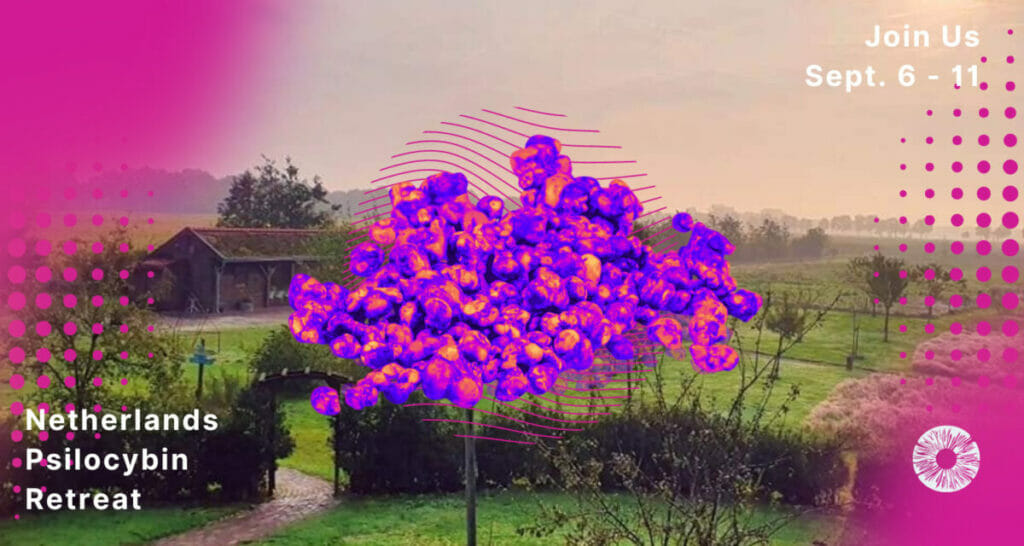
Neurology physician Dr. Burton Tabaac’s interest in psychedelics began almost by accident. He happened upon the topic through a 2019 presentation during his fellowship training at the Johns Hopkins University School of Medicine – and may not have pursued a dedicated interest in the field if he hadn’t attended.
“… In four years of medical school and four years of residency training, psychedelics were not mentioned – not even once as part of a comprehensive allopathic education,” Tabaac told Psychedelics Today.
The Hopkins lecture inspired the physician down a non-typical path for those in his profession: research on the therapeutic potential of psychedelics in treating mental health diseases. Today, he explores psychedelics beyond their traditional association with mental health. Entities inclusive of Parkinson’s disease, dementia, stroke, and traumatic brain injury are of particular intrigue with potential for psychedelics to promote healing, Tabaac shares.
In his recently appointed role for the Mckenna Academy of Natural Philosophy, founded by Dennis McKenna, Dr. Tabaac serves as an advisor for educational pursuits and evidence-based methodology. Through this collaboration, he is dedicated to investigating the possible role of psychedelics beyond their use in the mental health realm, and is passionate about exploring whether these substances could help with functional neurological and neurodegenerative diseases.
“There are specific indications that I feel warrant additional study and funding to assess and discover,” he says. “There has already been a lot of research and literature published dedicated to psychedelics for treating depression, anxiety, addiction and PTSD; I’m very eager to partner in pushing the frontier further to investigate what else psychedelics may have the potential to address.”
In the current landscape of psychedelic research, this alliance highlights the evolving role of physicians stepping beyond traditional methods to investigate alternative solutions. The demand for more research signifies a promising future for psychedelic research, with the potential of extending the possibilities of these substances in treating various conditions.
In the healthcare world, it isn’t uncommon to find that many doctors tend to favor Western medicine while overlooking holistic approaches. Doctors don’t typically embrace integrative routes, because the current medical system is guided primarily by evidence-based research, Tabaac says. Treatments typically require strong evidence of their efficacy before they are widely adopted, which doesn’t bode well for most federally scheduled psychedelics in relative nascent stages of research.
“I also think that having psychedelics as a restricted Schedule I class of drugs prohibits a lot of providers from even being able to offer these therapeutics off-label,” he says. “When you look at where the medical/legal field is heading, there’s a lot of promise with the Phase 3 trial that MAPS has presented demonstrating the potential for MDMA to treat PTSD.”
PTSD patients in the MAPS study received three doses of MDMA, supplemented with psychotherapy. The trial results yielded 50 per cent of participants no longer meeting the criteria for PTSD. One year later, without any additional MDMA doses, the number of patients no longer meeting the criteria increased to 70 per cent, “showing that there is some underlying effect on the brain that is sustainable,” Tabaac said.
The MAPS study highlights the transformative impact that psychedelics – combined with psychotherapy – can have on mental health disorders like PTSD, Tabaac says. As more research emerges, it is expected that the medical community will gradually embrace these alternative treatments and integrate them into mainstream healthcare, ultimately empowering physicians to treat patients with greater efficacy and enriching the field of allopathic medicine.
Back in December 2021, Tabaac stumbled across the Psychedelics Anonymous (PA) platform, a web3 community that shared his enthusiasm for the potential of NFTs to bridge communities of like minded individuals. PA offers a secure environment where members can connect without revealing their identities, utilizing avatars to engage in discussions about psychedelics, and exchange personal or professional experiences.
Membership in Psychedelics Anonymous brought with it additional perks, Tabaac said, offering access to educational opportunities such as a plant medicine course at Cornell and participation in the recent Psychedelic Science 2023 conference in Denver. The project has also established a podcast, The Zero Hour, where Tabaac interviews the top minds in the psychedelic space. The most valuable aspect, Tabaac says, was the connections made with fellow colleagues. He connected with psychiatrists, psychologists, social workers, and researchers who were curious about psychedelic medicine and established this virtual space where they could openly discuss without stigma, judgment, or fear of retribution.
“I attribute a lot of my own development and personal growth and passion for the space to the Psychedelics Anonymous project, because prior to getting involved in that community, there was trepidation over being judged by friends and by society at large, as a lot of the negative press and stigma still remains, dating back to Nixon’s War on Drugs,” he says.
Psychedelics Anonymous also catalyzed Tabaac’s passion in the field to present a TEDx talk discussing Mental Health Meets Psychedelics. In this talk listeners are challenged to question their preconceived notions and judgements as it pertains to the group of restricted therapeutics in the psychedelic class. Tabaac asks if this class of drugs can serve as a paradigm shift in the way mindfulness therapy and mental health is approached.
Dr. Tabaac recognizes the difference between his passion for advancing psychedelic medicine and his commitment to ethics. “I infrequently discuss psychedelics with my patient population, exceptions including clinical trial offerings if inclusion criteria is met. Doctors and health practitioners are constrained by the limits of their medical licensure, and must remain patient until FDA approval is achieved,” Tabaac says. “I think it’s still premature and out of my scope to offer psychedelics to my patients. My mission and my role is better served in pushing clinical research forward, commiting patient enrollment in trials, and inviting speakers who are experts in the psychedelic space to present on my podcast I incorporate teachings on psychedelics to the medical students that rotate with me as it is the only space where they have exposure to learning about these modalities. The enthusiasm and interest among the next generation of physicians is encouraging.”
The demand for alternative mental health solutions continues to increase. Organizations like the Psychedelic Medicine Association, dedicated to providing ketamine treatments and with whom Tabaac is affiliated, are addressing the needs of individuals seeking non-traditional routes. While certain prescriptions may fall beyond the scope of some physicians, adopting a holistic approach becomes crucial. With physicians like Tabaac considering various facets of a person’s well-being, such as sleep, lifestyle, nutrition, social support, mindfulness practices and physical health, individuals can benefit from more comprehensive and personalized mental health care. This avenue goes beyond medications, recognizing the broader needs of patients. It underscores the importance of tending to various dimensions of a person’s life to foster holistic well-being and empowers individuals to explore diverse modalities for emotional harmony. Tabaac emphasizes the moniker of focusing “mental health as part of whole health.”
For physicians like Tabaac, exploring the uncharted waters of psychedelic medicine opens up new possibilities for patient treatment and professional development. It provides access to innovative therapies, nurtures professional growth, and enables them to explore new frontiers beyond the constraints of conventional methods. By breaking stigma, advancing the field, and advocating for holistic modalities, physicians have the opportunity to play a pivotal role in enhancing the field of mental health and allopathy, offering new hope and potential healing pathways to patients. A new era in Western medicine, where evidence-based methodologies, holistic approaches, and comprehensive care intersect, holds the potential for a transformative landscape on the healthcare horizon.
In this episode, Joe interviews Maya Albert: Co-Founder of the Psyched conference, and Director of Operations at Tabula Rasa Ventures and the Synthesis Institute.
She shares her journey of how she became involved in the psychedelic space through her mother, and her personal experience as a patient in a clinical trial on psilocybin for the treatment of anorexia – a much more common and deadly affliction than most people realize. She discusses her involvement with the various psychedelic gatherings surrounding Davos and the World Economic Forum, as well as the work she’s doing with Tabula Rasa and some of their clients seeking to expand insurance coverage to psychedelic-assisted therapy.
She discusses the Synthesis Institute’s recent struggles that shook up the psychedelic space, what they’re doing to save the company, how Retreat Guru has helped them, and the implications for the wider psychedelic movement. And she talks about much more: the legality and vetting process for training in Oregon and Colorado; truffles in the Netherlands vs. classic psilocybin; the idea of alcohol as poison and ‘Cali sober,’ and how can we all be more collaborative and not sling mud at each other?
“The limitations are really when you’ve been in therapy, you’ve seen a nutritionist for five, ten years; you have all the tools there, you know what you’re supposed to do (this can be applied to things like depression or anxiety or any other mental issue), but those neural pathways that have been connecting and forming with those negative thought patterns for decades: for people, they’re not going to undo themselves. It takes more motivation than I have ever had to break my cycles, and I really felt stuck. I don’t think I was going to ever get better than I was at the time without something like psychedelics.”
“It could set the temperature for a lot of other psychedelic organizations and movements to say, ‘This isn’t working and let me show you why. If this goes up in flames, then what else is possible?’ And the space is already greatly under-funded and financiers look at this and they’re like, ‘I’m not touching that with a ten foot pole. This is too early, or this is too risky, or X, Y, and Z.’ So that was really the scary part of the first few weeks of what this meant for the movement at large: if we can’t pull it off, then who can?”
“This whole thing has been like a great big psychedelic trip: use our learning towards being a facilitator, towards facilitating ourselves through this chaos. There has to be chaos within to give birth to a dancing star, I think is what Nietzsche said. We’ll be that dancing star.”
Psychedelicspotlight.com: Psychedelic Capitalism Takes a Trip to Davos
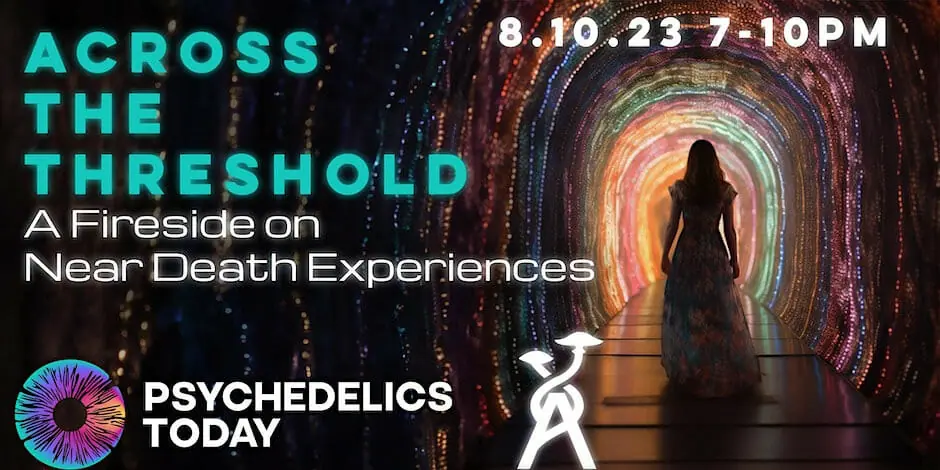
In this episode, recorded on the eve of MAPS’ Psychedelic Science 2023, Kyle interviews MAPS’ Founder and President, Rick Doblin, Ph.D.
He begins with an overview of the fast-approaching (and largest ever) psychedelics conference, emphasizing its significant growth, many features, and bipartisan opening ceremony, then discusses MAPS’ soon-to-be-released confirmatory Phase III data on MDMA-assisted therapy for PTSD, which should set the stage for legal MDMA and the increasing need for trained psychedelic therapists.
As the FDA is requiring studies on adolescents, he discusses this sensitive issue and questions why it’s so controversial, since teenage years are often closer to both trauma and a more malleable brain, Indigenous traditions certainly didn’t have age limits, and honest drug education – something that is absolutely necessary to fight the backlash against this quickly growing field – teaches us that it’s not the substance; it’s our relationship to it. Could not having these rites of passage be hurting us?
He also discusses the natural vs. synthetic conflict; breathwork; whether or not cannabis is truly damaging to young minds; Federal rescheduling vs. state rescheduling; why it’s controversial to give therapists MDMA in training; Gul Dolen’s work with reopening critical periods; psychedelics in couples therapy; and much more.
“We have been just astonished at the fact that we now have 11,500 people registered for this conference, and we, in our wildest dreams, thought maybe we’d get up to 10,000. But even that was just like a wild dream. The largest psychedelic conference that’s ever happened was our Psychedelic Science in 2017. …Now we’re almost four times as big. It’s a whole different cultural moment, and what I didn’t fully anticipate is how this conference would be like a magnet for the entire community.”
“I think the proper training of psychedelic therapists is different than the proper training of psychiatrists to administer any kind of pharmacological drugs, because for psychiatry; when they give SSRIs or they give other kinds of medications or they give electroconvulsive therapy or whatever: those are meant to be the treatments. In our case, the treatment is really the human relationship – the therapy – and then the psychedelics make the therapy more effective. And so it makes the most sense for people that are interested in doing psychedelic therapy, for them to have the experience of the psychedelics themselves. As we start to scale, there’s a lot of experienced trauma therapists, but they might not be experienced psychonauts, and it’s hard to describe what a drug does.”
“When you think about these rites of passage, that when you’re an adolescent or early in college, those are the ripe times for people to sort of explore: who are they? Where do they fit into the larger world? I think in many Indigenous cultures, that’s the time of initiation for a lot of people, so I think we have hurt ourselves tremendously. Now, you hear this always about marijuana: ‘kids [have] developing brains and they shouldn’t ever try marijuana.’ And I think the thing is that overuse is a problem. Daily use before you go to school: all that is a problem. It makes it difficult to learn, things like that. But we tend to make sweeping statements like ‘never use.’”
Maps.org: MAPS Receives $5 Million Grant from the Steven & Alexandra Cohen Foundation
In this episode, Joe interviews one of the world’s leading experts on human performance: New York Times bestselling author and Executive Director of the Flow Research Collective, Steven Kotler.
Kotler’s work explores the neurobiology of peak human performance, flow states, and aging, and the concept of getting our biology to work for us rather than against us in our later years, by using the parts of our brains that expand in our 50s, combined with neuroplasticity, learning by play, and the biggest factor: working toward a very difficult – but not impossible – task. His 30-year exploration of the neurobiology behind people accomplishing ‘impossible’ feats led him to test his theories by teaching himself to park ski at 53 with resounding success, then using his protocol with people up to 70 years old the next season. The story is told in his newest book about challenging tired concepts of aging, Gnar Country.
He discusses the power of flow states and how much flow actually amplifies productivity, motivation, wisdom, empathy, and more; why dynamic motion is a key activity for greater longevity and why skiing and similar action sports are some of the best examples; why dynamic activity in novel environments is even better; why changing one’s mindset may be the biggest factor toward change; why corporations are looking at flow training and where these concepts could go in the future; and of course, how this all relates to psychedelics.
“If you study flow science, it turns out that flow is really great at helping us go from zero up to Superman. It’s also really great at helping us go from seriously subpar, ‘I’m completely broken and sick’ back to normal. And it turns out this combination is phenomenal in the second half of our lives. And flow sits at the heart of peak performance aging.”
“The only way I can go [from] A to B with this is to take everything I know about flow science and peak performance and see if I can use it to accomplish this so-called impossible task. So that’s what the book is. And yes, I was obviously very successful. I went 0 to 60, as I said, in a single season. It was the fastest I’ve ever actually learned anything.”
“The place you’ve got to begin is mindset. The mind-body connection gets tighter and tighter and tighter over time, and it plays a significant role in aging and peak performance aging. Mindset is the greatest example. …A positive mindset towards aging – ‘I am thrilled with the second half of my life; my best days are ahead of me’ – translates to an additional eight years of healthy longevity. It’s wild. …You could be morbidly obese and have a shitty mindset towards aging. Change your mindset, you’ll live longer. Don’t lose weight. Change your mindset. It’s more important. In fact, changing your mindset is more important than quitting smoking for healthy longevity.”
When the Impossible Happens: Adventures in Non-Ordinary Realities, by Stanislav Grof
The Structure of Scientific Revolutions, by Thomas S. Kuhn
In this episode, David interviews Dr. Gabrielle Lehigh: Co-Founder and Managing Director of Psychedelic Grad, a web-based community serving as an educational and career hub for up-and-coming psychedelic professionals; and the host of the related podcast, “Curious to Serious,” where she speaks with students and professionals about the path they took to land in the psychedelic field.
Lehigh recently earned her Ph.D. with research on something not many are looking at: the stories behind powerful and transformative psychedelic experiences specifically at music events, based on 38 interviews and over 500 surveys mostly collected at day-long festivals in the southern United States. While the goal was largely data collection in support of the clear potential for therapeutic benefit in using psychedelics in recreational settings (as many of us who have experienced this can attest), she was surprised to learn how many people still blindly trust dealers; how much festival security can affect safety; how the community often makes more of a difference than the music itself; and how many parallels exist between colder clinical models of psychedelic-assisted therapy and the completely open festival experience.
She discusses how she found her way from environmental justice to psychedelics; what people are most looking for on Psychedelic Grad; why she chose to use the word “transformative” in her research; what music she has had her best experiences with; why psychonauts shouldn’t forget about Pink Floyd; and much more.
“I went to my advisor at the time and I said, ‘Listen, I want to change the direction that I’ve been going in.’ I’m like, ‘I either want to study the anthropology of space colonization,’ (which is so out there) ‘or I want to study psychedelics.’ And my advisor was like, ‘Neither one of those is anywhere near what you were studying before. What happened?’”
“I can be somewhat frustrated sometimes when, from the clinical setting, there’s this idea that recreational use has no benefit for people, because I’ve seen it from other people’s experiences, [and] there have been experiences that I’ve had in those types of recreational settings that have been incredibly beneficial for me. Even when I started taking psychedelics, even though I was taking them at home; it wasn’t clinical, it wasn’t medical, it wasn’t necessarily therapeutic as defined by ‘therapeutic,’ so it was still considered recreational. So I was just really frustrated in seeing repeated notions that recreational isn’t necessarily beneficial. And so I set out to be like: well, if it’s not beneficial, then maybe we should go check it out and see what’s really going on.”
“When we think about the clinical setting, when we look at the MAPS protocol and everything, music is a part of it. But in the interviews, people talked about the value of live music. There’s something special and something unique about music being created in the moment, and you, as a spectator, are part of the creation of that music, and there’s something really special going on there. …It’s the music, and it’s not just the music as the music, it’s this live production of the music. There’s some type of magic in it.”
Curious to Serious podcast: David Drapkin – Working In The Psychedelic Space
“Transformative Psychedelic Experiences at Music Events: Using Subjective Experience to Explore Chemosocial Assemblages of Culture,” by Gabrielle R. Lehigh (her full dissertation)
Sciencedirect.com: The pleasure in context,” by Cameron Duff
Israeli Harm Reduction – A Real World Trip From Raves to Parliament (A Psychedelics Today webinar)
YouTube: Grateful Dead – Terrapin Station (Anaheim, CA 7/26/87)
Spotify: Pink Floyd – The Dark Side of the Moon
Spotify: “Top 40 Hits from Gabby’s Trips” (the playlist she discussed at the end of the episode)
In this episode, David interviews Dr. Roberta Murphy: training medical psychotherapist and member of the Imperial Centre for Psychedelic Research.
This is a rare impromptu podcast, recorded about a half hour after David heard Murphy speaking on a panel at UK’s Breaking Convention conference. He asked her if she wanted to be on the podcast sometime, and before they knew it, they were recording. Fastest turnaround ever?
She discusses her past research and what she’s doing at Imperial College; her work on a psilocybin for depression trial; her hopes for psychedelics treating people with Parkinson’s; and her recent co-written paper on the ARC Framework (Access, Reciprocity and Conduct), where she will be focusing strongly on the Conduct aspect through her work at Imperial.
And she talks about her other paper exploring the impact of one of the more important aspects of therapy: the therapeutic alliance on the psychedelic experience. How does the treatment dynamic between the therapist and the client impact the outcome (and course) of the therapy, and what determines whether it’s neutral, negative, positive, or very positive?
“It makes sense in a way that you might need to kind of work through those mistrust feelings before you get into a deeper layer, and then in the next session they were able to (I think because they felt a bit safer with us) let go and have a bit more of a typical psychedelic experience where they visualized things and saw things. …I think that that can often then be mistaken as resistance or like nothing’s happening. But there’s always something happening, it’s just sometimes it’s a little bit more nuanced or a little bit harder to pick up and work with. But there’s always something happening. You just might have to zoom in a bit to see it.”
“There’s a difference between a challenging experience that occurs, is processed, and worked through vs. a challenging experience where people kind of never really work with it, it doesn’t get processed, and they get quite stuck in it. …I do think that if you have a good container of a therapeutic relationship, it can help you to work through and process, and I think if you don’t have that, it’s more likely that you’ll end up with something a bit stuck, because I think in order to process, you often need to go in and go deep. And if you don’t feel safe to do that, you’re just going to kind of float on the edge, in a way, and never quite get through.”
Researchgate.net: ARC: a framework for access, reciprocity and conduct in psychedelic therapies
In this episode, David interviews Professor Celia Morgan, Ph.D., who holds the Chair of Psychopharmacology and co-leads the Transdisciplinary Psychedelics Group at The University of Exeter.
This was recorded on the dawn of UK’s Breaking Convention conference, where Morgan was speaking about the therapeutic potential of ketamine as well as the danger of people developing a dependence on it. She touches on that topic, but largely discusses her current Phase III Trial for ketamine-assisted therapy for the treatment of severe alcohol use disorder (also called the KARE model (Ketamine for reduction of Alcohol Relapse)), a collaboration with Awakn Life Sciences.
She discusses her other research: studies on mindfulness intervention before and after ketamine, epigenetic changes after ayahuasca use, the antidepressant qualities of ayahuasca, and CBD for cannabis dependence. And she talks about the necessary balance for making treatments amazing but affordable; how connecting with nature during integration is key; how the drug is just a tool, yet we focus on it too much; and how we need studies on how different therapies work with different substances.
“People always focus on the drugs, but it’s more about the people, and as you say, their relationship – what you’re getting from that experience. The drugs themselves are just tools. You can hit someone over the head with a spade, but you can dig an amazing garden. I see the drugs as the spade, basically, but obviously a really unusual spade.”
“Taking a step back from your thoughts and not being over-engaged with everything you’re doing; the ketamine really helps to facilitate that, because they can see how that works. Mindfulness can be really tricky. Mindfulness practice is hard work. So I see this as a big step that makes it work better in that first bit, especially when people are struggling. …Ketamine, to my mind, gives this kind of boost and insight that can help engage them with the therapy going forward.”
A Vital Journey: Transpersonal Breathwork Retreat in PA, July 28
Check out the Lumenate app, and download it through the App store here!
University of Exeter department of Psychology: Professor Celia Morgan
Ketamine for reduction of Alcoholic Relapse (KARE)
Nice.org.uk: Nasal spray medicine for treatment-resistant depression not recommended by NICE
In the second episode of our special, two-part series, the Psychedelic Morning Show, Joe Moore and Anne Philippi are live once again bright and early from Psychedelic Science 2023 in Denver. Listen to this podcast as they interview four guests working on the front lines of psychedelic research, law, and the treatment of chronic pain.
Guests for this episode include:
Imperial College London Centre for Psychedelic Research
Clusterbusters
PT404 – Clusterbusters: The Horrors of Cluster Headaches and the Miracle of Psilocybin
Court Wing – Pain and Its Relationship to the Mind
Surprising Results: Psilocybin Trial for Depression Alleviates Chronic Pain, by Court Wing
Psychedelics Today is reporting live this week from the industry event of the year, Psychedelic Science 2023 in Denver. Listen in to this podcast as our co-founder, Joe Moore, and New Health Club founder Anne Philippi hit the conference floor bright and early in the first episode of a special two-part series, the Psychedelic Morning Show.
In this limited series, Joe and Anne chat in real-time with guests working in all corners of the psychedelic ecosystem, from advocacy, law and finance, to research and therapy.
Guests for this episode include:
Working Weekends at a Psych ER – Interview with Julie Holland on NPR
American Psychedelic Practitioners Association
PT249 – Hadas Alterman, Serena Wu, and Adriana Kertzer of Plant Medicine Law Group
Psychedelic Medicine Coalition
PT396 – Moms on Mushrooms: Motherhood and Psychedelics Inside a Broken Culture
In this episode, David interviews Frederick Barrett, Ph.D.: cognitive neuroscientist, Associate Professor of Psychiatry and Behavioral Sciences at Johns Hopkins University School of Medicine, and now, Director of the Johns Hopkins Center for Psychedelic & Consciousness Research.
With today’s news, Barrett officially takes over for the legendary Roland Griffiths, who has been in the role since the Center’s launch in 2019, and who will continue on as a member of the leadership team while dealing with the Stage 4 cancer diagnosis he has been remarkably candid about in recent interviews.
Dr. Barrett has been conducting research at Johns Hopkins for a decade, authoring or co-authoring some of the first studies on psilocybin’s enduring effects, and receiving the first federally funded human psychedelic research grant from the NIH since the 70s. He discusses the work and importance of Roland Griffiths; the history of the Center and current research he’s most excited about; the mystery of consciousness; and the power and sacredness of music: how we all use music to regulate our emotions, and how he wants to explore the brain mechanisms behind that connection.
“I came here in 2013, kind of starry-eyed and still a little green behind the ears, and I thought music is a great tool to study the mind, but psychedelic drugs must be such a more powerful tool to study the mind and the brain, and essentially that’s what’s driven me since. I see psychedelics, music, brain imaging, cognitive testing, qualitative interviews, questionnaires: all these things are all different types of tools in the kitchen of trying to study the mind. And that’s what motivates me; is really just trying to use whatever tools we have access to to understand this complex experience that we have as humans.”
“Roland has been one of the most influential and important mentors of my life, and he has mentored each of the faculty within the Psychedelic Research Center. …But his impact on the psychedelic world, I think, can’t be understated. He’s just a remarkable man. He is so precise and careful and piercing with his thinking, but yet so clear in being able to articulate complex ideas and really the most interesting and important nuggets of a finding. …I think that’s one of the reasons that he’s been a leading figure in psychedelic research, and I think those are some of the reasons that he was able to pull this off to begin with.”
“If you think of all of the variables that you can try to push around to manipulate set and setting, it’s not just a couple dials; it’s like a church organ. It’s like a concert organ, and I think that music is one of the biggest keys that we can press on, so I’m going to start pressing on it.”
Johns Hopkins Center for Psychedelic & Consciousness Research
Johns Hopkins Center for Psychedelic and Consciousness Researcher Names New Director
Hopkinspsychedelic.org: Frederick S. Barrett, Ph.D.
Hopkinsmedicine.org: ‘Magic Mushrooms’ Help Longtime Smokers Quit
Hopkinspsychedelic.org: Albert Garcia-Romeu, Ph.D.
Hopkinspsychedelic.org: Sandeep Nayak, MD
Hopkinspsychedelic.org: David Yaden, Ph.D.
Researchgate.net: Psychedelics and music: neuroscience and
therapeutic implications
Spotify: Old Crow Medicine Show
Spotify: Old Crow Medicine Show: “Wagon Wheel”
In this episode, Joe interviews the Co-Founders of Enosis Therapeutics: researcher and scientist, Agnieszka Sekula; and psychiatrist, clinical advisor to the Australian Psychedelic Society, and leading Australian advocate for psychedelic-assisted psychotherapy, Dr. Prash P.
Enosis Therapeutics is a medtech startup that began with the question: how can we use VR – with or without psychedelics – to improve mental health outcomes? They feel that the biggest problem with powerful psychedelic experiences is that, once you’re back in reality, it’s oddly difficult to remember the insights and new ideas that were so clear during the experience, and even harder to make connections that lead to concrete change. They believe that the immersive nature of VR and the novelty of unique VR environments creates a sense of presence that can’t be recreated otherwise – a liminal, in-between state that’s just different enough to allow the patient to feel like they’re back in that non-ordinary state, and therefore more able to anchor their experience and begin to find connections and more clearly understand newfound insights.
This all happens by the user essentially creating nonlinear, abstract, multi-sensory VR paintings while describing what they remembered; allowing them to revisit these worlds later, bring in therapists (or anyone else) to work inside these environments, and hear their own voice describing what happened, thereby creating a mental map that can be worked with in completely unique ways.
They talk about the conflict between new technologies and traditionalists; the problems with moving away from psychoanalysis and not treating psychotherapy as a process; how VR could improve the efficacy of therapy (and improve therapists’ lives); how it could replace models of repeated dosage; how VR could generate analytics to actually quantify success in mental health treatment; and how (whether psychedelics are used or not) culture needs to bring the psychedelic way of thinking to mental health.
“Imagine that you build out that network, that you make it physically visible and tangible, and you can actually have someone that comes into that space and visits that network. So you can share your mental model with anyone that you want: it can be a therapist, it can be a guide, it can be a shaman, it can be a well-being specialist, it can be your partner, it can be your parent, it can be your child. It can be anyone that you wish had a better understanding of you, but they don’t. It’s hard to understand ourselves, [much less] understand each other based on those linear narratives. But if we actually see how people connect things [and] how they see those links, I feel like we have a much better chance to actually connect to each other and have a better understanding of consciousness.” -Agnieszka
“So much of the focus in psychedelic therapy has been on the dosing session, whereas a lot of us would like to think that it really should be on the psychotherapy, and the psychedelic is purely that stimulus that ignites the insights which you then take through psychotherapy. If that stimulus can be the stimulus which ignites a process of psychotherapy, and therefore the power of psychotherapy to produce change, and in that way, brings psychotherapy further to the forefront of mental health treatment (in a way, it’s completely disappeared and been replaced by biological methods), then I think we have won – just by that.” -Prash
“We can induce a similar psycho-emotional state with the use of VR during the integration sessions to help patients remember, at their psychological and at an emotional level, what the experience has been like. …A lot of studies (especially earlier studies) would report that within the first two weeks after the psychedelic experience [is] the most potent time for integration because patients are still in that emotional state that was evoked with psychedelics. So maintaining that for longer by repeat application of VR might give us more access to those emotions, and might enable patients to process things a little bit more deeply.” -Agnieszka
Frontiersin.org: Virtual Reality as a Moderator of Psychedelic-Assisted Psychotherapy
Goodreads.com: Mozart’s “The music is not in the notes” quote
In this episode of Psychedelics Weekly, Kyle and David meet up to talk news, but end up mostly having a discussion about the numerous challenges facing the rapidly growing industry of psychedelic therapists, guides, and facilitators.
That discussion comes from the article, “Psychedelic workers of the world, unite!”, which breaks down the shortcomings and risks of an industry many are flocking to without realizing what they’ll likely have to deal with: unprecedented legal and financial risks, burnout, misalignment with management, transference and countertransference, and what happens when one finds themselves in the middle of a genuine emergency? While these issues could be found in any industry, a big reason why they seem so prevalent and dangerous in the psychedelic world is our lack of elders and passed-down experience – and the faster this all grows, the more we need that guidance.
And for news, they talk about Ohio State making history as the first U.S. University to receive a license to grow psilocybin mushrooms; a new study showing that LSD enhanced learning, exploratory thinking, and sensitivity to feedback; and the National Institute on Drug Abuse (NIDA) funding $1.5 million to research the efficacy of psychedelics for substance use disorder – which spurs a conversation about research, funding, and the idea that maybe we’re spending too much time and money on neuroscience.
(bolded links are the discussed articles)
Navigating Psychedelics For Clinicians and Therapists – Live Sessions (the next round launches in July)
Ecstaticintegration.org: Psychedelic workers of the world, unite!
Arizonaphysician.com: Challenging Medicine’s Status Quo: Sue Sisley, MD
Psychedelics Today: PT245 – Robin Carhart-Harris – Psychedelics, Entropy, and Plasticity
Neurosciencenews.com: How Neurons That Wire Together Fire Together
Mindmatters.ai: Why Pioneer Neurosurgeon Wilder Penfield Said the Mind is More Than the Brain
Beyond the Brain: Birth, Death, and Transcendence in Psychotherapy, by Stanislav Grof
In this episode, Joe interviews Nick Kadysh: Founder and CEO of PharmAla Biotech and member of the board of directors for The Canadian Psychedelic Businesses Association.
PharmAla Biotech is a Toronto-based Life Sciences company with two focuses: contracting with manufacturers to provide researchers with GMP MDMA (created under Good Manufacturing Practice regulations), and creating and researching novel analogs of MDMA. And just today, they announced that Health Canada has authorized them (and their distribution partner, Shaman Pharma) to supply their LaNeo™ MDMA for the treatment of a patient under Canada’s Special Access Program – the first time this has happened in Canada.
He discusses the creation of PharmAla and why their model changed from primarily researching analogs to manufacturing; why they’re operating out of Canada and using manufacturers instead of running the lab themselves; the excitement around Australia’s recent about-face on MDMA and psilocybin-assisted therapy; the bureaucracy of U.S. drug policy and how much a broken supply chain affects the whole industry; bad IP and companies filing rapid fire patents; why creating new analogs of MDMA is so important; and why the psychedelic space needs to bring culture along with us.
He also talks about Spravato, cannabis and risks of cancer, THC nasal sprays, and research he’s most excited about: that MDMA seems to alleviate dyskinesia caused from Parkinson’s disease, and that MDMA could improve social anxiety in people with autism. He’s aiming to run a clinical trial and believes they have developed a safe MDMA analog that the autistic community will respond to very well.
“I don’t want to give the impression that we think that MDMA is unsafe. In the case of PTSD-assisted psychotherapy the way that it’s being presented by MAPS, I think it’s remarkably safe. But, you know, better is still possible.”
“If you told me that you have a brand new drug that was developed in a lab that nobody has ever seen or tried or tested before, and let’s call it drug A. And then you have drug B, which is derived from a mushroom, that people have been consuming regularly for the past 5,000 years and no one’s died. And you’re asking me which one is safer? It’s the mushroom, man. It’s not even a question.”
“We owe it to ourselves in this industry to take the population along for the ride. This is why I think safety is so important, because if you’re working on safety, people like that. People trust that. That’s what happened last time: there was the counterculture and the culture, and the culture won, and we’re still paying for it today. So let’s bring the culture along.”
News.bbc.co.uk: Ecstasy ‘not worse than riding’
Psychedelics Today: Canada’s SAP Expansion Signals a Step Forward for Psychedelics
The Canadian Psychedelic Businesses Association
Uams.edu: William E. Fantegrossi, Ph.D.
YouTube: Researchers look at Ecstacy to ease Parkinsons Agony
Psychedelics Today: Can Psychedelics Provide Relief for Autistic Individuals?
Psychedelics Today: PT233 – JR Rahn of MindMed – LSD, ADHD, and Decriminalization
Pharmaphorum.com: J&J builds case for antidepressant Spravato with head-to-head trial
Psychedelics are a fascinating class of compounds that have potent effects on our consciousness. After a multi-decade hiatus, scientific research on psychedelics has now resumed with full force. One field that has rapidly developed in recent years is psychedelic neuroscience, which applies the cutting-edge frameworks and tools of modern neuroscience to understand how psychedelics affect the brain and nervous system to elicit their profound effects. The latest findings from this breakthrough field have increasingly spilled into popular culture and are often profiled in the media – it’s now commonplace to hear terms like ‘default mode network’ and ‘neuroplasticity’ casually thrown around when discussing psychedelics and their effects.
However, much of the research is quite technical, and typical media treatments are often either highly simplistic and watered-down, or plainly inaccurate and sensationalistic. Most people just don’t have the necessary background to properly understand and communicate findings beyond repeatable buzzwords and trickle-down narratives.
It’s easy to wonder: what’s the practical relevance of psychedelic neuroscience for psychotherapy or for individuals navigating their own psychedelic experiences?
Understanding the science of psychedelics can be really helpful for therapists and clinicians preparing their clients for psychedelic experiences, and helping clients conceptualize and understand their experiences afterward. Psychedelic experiences can sometimes be quite overwhelming and hard to make sense of. It can be challenging to experience the profound alterations of consciousness they can elicit, which span from complex dream-like images and vivid memory recall, to ego-dissolving mystical-type effects, to perceptual distortions and synesthesia.
However, neuroimaging studies increasingly reveal what is unfolding in the brain during a psychedelic experience, and how these changes might map onto aspects of the subjective experience. Serotonergic psychedelics (like LSD, psilocybin and mescaline) disintegrate typically observed networks, including the default mode network, which is superseded by a more globally interconnected brain and more complex (or ‘entropic’) brain dynamics. In this globally interconnected state, there is a temporary increase in the connectivity and communication between different regions of the brain that normally don’t communicate much with each other. It’s like different cliques at a high school party spontaneously starting to intermingle with each other and party as a unified whole.
By reminding and reassuring clients that the intense effects they are experiencing are directly related to temporary changes in brain activity, clients may be less concerned that they are “gone without return” or that there is something inherently “wrong” or “bad” about their experience. It can also provide a useful model or framework to ground and interpret what emerges during their journey. They can rest assured that no matter how radical and reality-shattering their psychedelic experience is, it’s being underpinned by temporary changes in how brain regions are communicating and interacting over time.
Research has found that an individual’s psychological traits and brain characteristics can help predict the nature of their psychedelic experience, as well as the likelihood that they might experience long-lasting therapeutic benefits. The principles of ‘set and setting’ are deeply ingrained in psychedelic therapies, and signify the integral role that context plays in determining therapeutic outcomes. ‘Set’ concerns one’s mental and emotional state immediately before the psychedelic experience, encompassing such facets as personality and mood. Meanwhile, ‘setting’ pertains to the physical, social, and cultural milieu in which the psychedelic is taken. Given that traits and moods have been shown to correspond with differences in brain function, it is likely that brain structure and function may prove effective in predicting subjective effects and treatment response. This ‘precision medicine’ approach – using brain markers to forecast how individuals will respond to a given drug – has been applied to antidepressants and ADHD medications, providing a precedent for such a strategy in the realm of psychedelic therapy.
A recent study conducted by Enzo Tagliazucchi and colleagues illustrates this point. Neuroscientists have found that certain brain waves, called theta waves, may affect how people experience psychedelic drugs like DMT, as theta waves are associated with mind-wandering. Tagliazucchi and colleagues conducted electroencephalogram (EEG) recordings of brain electrical activity and discovered that people who had high levels of theta waves before taking DMT had less intense feelings of unity and transcendence during their psychedelic experience, showing that greater theta waves likely reflect a brain state that is not conducive to being immersed in a psychedelic experience. They suggest that measuring theta waves with EEG before taking DMT could help predict how likely someone is to have a mystical-type experience.
Their findings also appear to suggest that priming subjects to reduce theta power before taking a serotonergic psychedelic may help increase the depth of their mystical experience. For example, an individual could reduce theta with neurofeedback training, in which feedback from an EEG headset would allow them to modulate their brain activity to achieve a desired brain and psychological state. Although further research is required before any definitive conclusions can be drawn, emerging research like this suggests that capturing information about brain states – beyond what can be subjectively reported – may prove to be a valuable tool in predicting an individual’s psychological readiness for a psychedelic experience.
The proliferation of interest in serotonergic psychedelics, MDMA, and ketamine is in no small part due to their remarkable ability to act as ‘psychoplastogens’ – compounds that enhance neuroplasticity in the brain. Neuroplasticity refers to the ways in which neurons in the brain change their connections with each other or create new ones, which is critical for the brain’s ability to learn, adapt to new experiences, and recover from injury. Psychedelics’ ability to enhance neuroplasticity has frequently been highlighted as central in eliciting therapeutic effects across a range of mood disorders and stress-related conditions such as depression, anxiety, and PTSD, which makes sense because impaired neuroplasticity has been reported for all of these disorders.
Research in rodents has suggested that, generally, for most psychedelics, the period between six and 72 hours post-psychedelic experience is when neuroplasticity is at its highest.
However, changes may last for much longer. For instance, LSD has been shown to promote the expression of neuroplasticity-related genes in rodents even one month after treatment had ceased. More and more research is being conducted on these effects, but there is clear practical relevance for clinicians, therapists, and everyday people. Understanding the nuances of psychedelically boosted neuroplasticity – including how long the effects last and where in the brain they occur for a given substance – is critical for designing optimal integration practices.
An in-depth understanding of psychedelic neuroscience can serve as a valuable tool for therapists and individuals seeking to navigate the intricate and potentially transformative realm of psychedelics. Familiarity with scientific research can empower practitioners to tailor their approach to preparation, the acute experience itself, and integration, thus optimizing therapeutic outcomes.
What’s more, the field of psychedelic neuroscience is profoundly intriguing and sometimes referred to as the “quantum mechanics” of neuroscience – neuroscientists are exploring the frontiers of consciousness with a cutting-edge discipline, and unearthing fascinating gems along the way. For example, did you know that psychedelics can enhance the firing rate of excitatory neurons in rodents’ prefrontal cortex by an astounding 481% over baseline, significantly altering communication throughout brain networks? Did you know that research is uncovering that the brain effects of psychedelics might also be tightly linked to our immune system and microbiome, with relevance to mental health? Or that both MDMA and LSD increase oxytocin levels, which plays a role in social bonding?
These and other fascinating discoveries will be covered in our upcoming eight-week course, “Psychedelic Neuroscience Demystified: How Psychedelics Alter Consciousness and Produce Therapeutic Effects.” This course was designed to be accessible to clinicians, therapists, and curious everyday people, making students well-versed in this emerging field, giving them the ability to understand new findings, put them into practice, and be informed participants in ongoing discussions.
Class begins May 17. Learn more here:
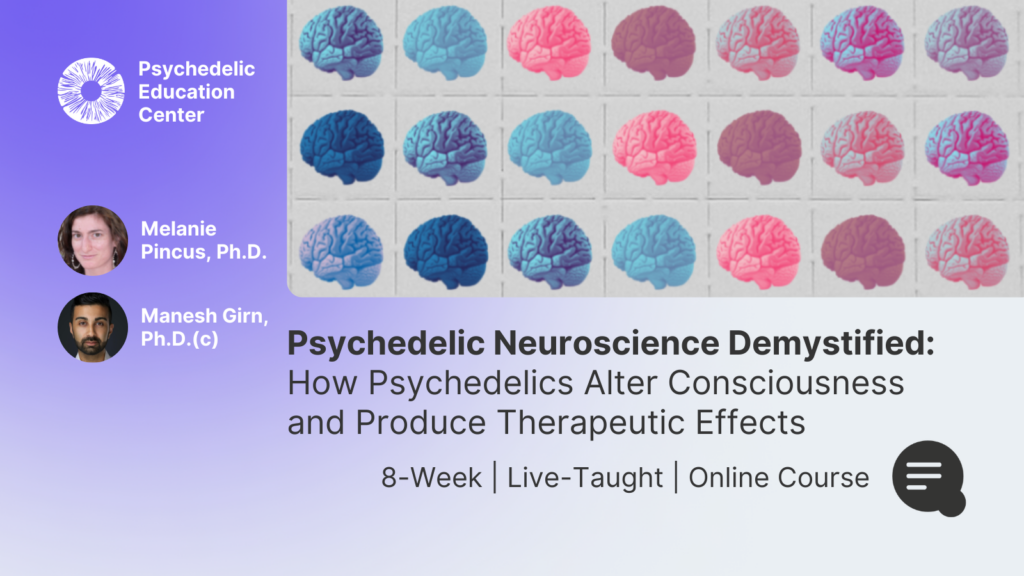
In this episode, Joe interviews Melissa Lavasani: CEO of Washington, DC-based Psychedelic Medicine Coalition, and now, President of the brand new Psychedelic Medicine PAC.
She discusses her path to psychedelics, how she ended up running the Initiative 81 campaign (the Entheogenic Plant and Fungus Policy Act of 2020), and how she came to realize that decriminalization efforts can’t be the only option we go for – that, like it or not, we live in a system where politics and money are major factors behind any systematic change, and if we want to make any headway, we have to play the game. The Psychedelic Medicine PAC (Political Action Committee) was created to open up federal funding for psychedelic research, as nearly all research today (of which there still isn’t enough) is being funded by private companies. They will use donations to support politicians who are on our side and can advance psychedelic progress, who will push for federal funding to get the new and necessary data people who aren’t bought in yet need to see.
They talk about speaking with people from the other side of the aisle at a recent education campaign in DC; how federal funding is neutral money; what she learned from DC’s deprioritization of cannabis policing; how personal stories and one-on-one human connection can change minds better than traditional confrontational activism; and the need to get ahead of the inevitable wave of big pharma propaganda they’ll bring when they officially step up to the table. She believes the path to helping the most people is advancing science and data through federal funding, and that begins with education and getting more politicians on our side. If you agree, follow them for details about their upcoming event in May, visit their table at Psychedelic Science this June (use PT15 for 15% off tickets), and donate to the PAC or the coalition.
Also, as a bonus, this episode begins with a mini version of Psychedelics Weekly. Joe and Kyle didn’t have enough time to record a full episode, but still wanted to check in and review a few notable stories and highlight our recent Vital graduation ceremony. See you next week!
“I dipped my toes with the microdosing [and] I found immediate effects of that. I engaged with my children for the first time in many years, and with my son for, really, the first time since he was born. So that was a really mind-blowing experience of taking something for only a few days and feeling my humanity come back again.”
“I think when you take the media out of it and you isolate them in a place they feel very safe (in their office) and there’s no cameras around and they don’t feel the need to get their talking points across, and you have a human-to-human conversation with them about this issue, the result is that much better because you isolate all of these external influences that they’re constantly under and you say, ‘Listen, I am talking to you as a human being. This was my experience. This is what I did to heal myself.’ …Watching them have their epiphany about this is so fun.”
“When these campaigns win with very small margins (like 1%, 3%, 5%), that means half of the state voted against it, and that means half the state wasn’t being spoken to in these campaigns in the right way. …The U.S. is extremely diverse, and not just racially, but within perspectives that exist in this country, and we cannot just be speaking to one side of this issue. We have to really engage with the public in a meaningful way, and that is speaking to the half of the country that doesn’t understand this.”
“We forget that the traditional pharmaceutical industry has yet to step in on this issue. I think that they’re very closely watching what’s going to happen with psychedelics, but they have yet to stick their lobbyists on the hill. And that is the day that I am not looking forward to, because they have one of the most powerful lobbies in the country and they have budgets for this kind of work in the billions of dollars, really. So how is the psychedelic industry going to compete with that? How you counter that is: you educate members of congress, you educate those influential people before the pharmaceutical industry gets there so they can’t fill their heads with misinformation.”
Maps.org: Zendo Project Celebrates a Decade at Burning Man and a New Beginning for the Organization
BBC.com: People were taking drugs in Spain 3,000 years ago, study finds
Telegraph.co.uk: Rory Lamont: ‘My rugby injuries made me suicidal – psychedelic drugs saved me’
———————————————
Psychedelicmedicinecoalition.org
NBCnews.com: Candidates who support psychedelics as medicine get a political action committee
Psychedelics Today: PT229 – Dr. Matthew Johnson – What is Consciousness?
Governing.com: What Can Communities Do to Prevent Psychedelic Healing Centers?
In this episode, Joe lets Court Wing take lead in interviewing two of the leaders behind Clusterbusters: Founder and Executive Director, Bob Wold; and President, Eileen Brewer.
A long-time friend of the show, Court Wing has become our resident expert on chronic pain, writing articles about how psilocybin relieved his chronic pain, and hosting Timothy Furnish, MD & Joel Castellanos, MD in their episode about phantom limb pain. Now he speaks with Clusterbusters, a non-profit dedicated to educating people about the horrors of cluster headaches, funding ongoing research into new treatments, and normalizing the miracle that psilocybin has been to so many sufferers in alleviating their headaches.
Wold and Brewer discuss their past struggles (Wold is a cluster sufferer and Brewer has migraine disease) and discovering the amazing intervention of psychedelics; the battles they’ve gone through in spreading this knowledge; how using psychedelics is also helping people work through PTSD; the barriers that legal psilocybin is creating; the concept of schools having a drug education program; the research looking at cluster headaches and other headache diseases; their creation of the Pain And Psychedelics Association, and more. While cluster headache sufferers have a lot to be frustrated about; as psilocybin becomes more mainstream and more and more research is funded, they now have a lot of hope.
“A couple of people started growing their own mushrooms and self-treating themselves just to try it to see if it might actually help, and the results were incredible. It was better than anything that any of them had tried in the past. It wasn’t really an abortive (it wasn’t treating one headache) and it wasn’t really a preventive, where you would take it and you would prevent some of your cluster attacks. It was something that was actually doing both of those things, and people were getting long-lasting results by one or two doses of magic mushrooms.” -Bob
“It makes sense that that would happen within a disease community, it happens outside of disease communities too. Some people just use psychedelics occasionally just to get that perspective back and to work within themselves (and without themselves) to sort it all out, [and] get themselves back together. And I think there’s a real division there between people who do that and people who don’t.” -Eileen
“The two or three years before my first dose of psilocybin, my medical bills were like $20,000 a year trying to treat my clusters. That included hospital stays and specialists and travel. …The first time I grew my own mushrooms, it cost me a hundred dollars to grow a year’s supply and I didn’t have to go to Walgreens to pick up my medicine. So my medical treatment for the following year for my cluster headaches was $100 versus $20,000 and I was able to take as much as I needed when I needed it. And at this point, that’s what most people with headache disorders are doing; they’re growing their own because the system is going to take years and years to be built into something that’s actually accessible to everybody – and affordable.” -Bob
“People are dying while we’re waiting for these policies to happen, and I’m really struggling with the fact that we are setting up more barriers. I know that all the intentions are good, but we are hurting people.” -Eileen
Psychedelics Today: Surprising Results: Psilocybin Trial for Depression Alleviates Chronic Pain
Psychedelics Today: Why Did Psychedelics Relieve My Chronic Pain?
Psychedelics Today: PT306 – Dr. Devon Christie – Vital Psychedelic Conversations
UC San Diego Psychedelics and Health Research Initiative
Newswire.ca: Apex Labs Granted Approval for 294 Patient Take Home Psilocybin Clinical Trial
FDA.gov: Risk Evaluation and Mitigation Strategies | REMS
Yalemedicine.org: Emmanuelle Schindler, MD, Ph.D.
In this episode, David interviews neuroscientist, artist, and educator, Melanie Pincus, Ph.D.; and Ph.D. candidate in Neuroscience, lead or co-author on over a dozen scientific publications, and regular contributor to PT, Manesh Girn.
They tell their stories of how they became interested in neuroscience, and stress the importance of staying radically open-minded (or “epistemically naive”) when it comes to how much we can claim we understand about the brain, the mind-body connection, and consciousness itself – that while fMRI and other advances have brought us a long way, there are still a ton of “unknown unknowns,” especially around creativity, decision making, and imagination. They discuss the misconception that we only use 10% of our brains; comparisons between the brain and the universe; society’s misunderstanding of “happy hormones” (dopamine, serotonin, etc.); how chronic stress takes a toll on all parts of the body; how MDMA works with memory processing; and how stacking modalities with the psychedelic experience (like play or activities focused on emotion regulation) can really help with personal goals and growth.
They have taken their understanding and fascination with neuroscience and applied it to a new course in our Psychedelic Education Center: “Psychedelic Neuroscience Demystified: How Psychedelics Alter Consciousness and Produce Therapeutic Effects“: an 8-week live course with 10 hours of prerecorded material and a built-in community. It was designed with practitioners and clinicians in mind, but with the goal of still being as accessible as possible for anyone who is curious about the neuroscience of psychedelics, and how that knowledge can help with preparation, the journey, integration, and working with a heightened window of neuroplasticity.
Class begins on May 17, and if you sign up before April 12, you can get $100 off!
“There’s so much good science now, and good neuroscience that can inform how people work with their clients in terms of helping them set up for and make sense of their psychedelic experience and ways to optimize the preparation before going into a psychedelic journey, the actual psychedelic journey in terms of thinking about dosing and type of substance to work with, and then also in the integration period, where there’s this heightened window of neuroplasticity and how one could really work with a client to best take advantage of that window of opportunity to lead to lasting change.” -Melanie
“It’s just this blob, this squishy blob of matter. And you think: for that person, their entire life, experiences, memories, [and] hopes were all happening in this little blob that’s in my hand. And just seeing all the layers of blood vessels and how everything’s connected to each other, it’s just fascinating and it’s downright bizarre that somehow, this thing can give rise to experience and consciousness. It’s like, how the hell is that even possible?” -Manesh
“For people who are interested in stacking modalities, there’s other modalities that are really potent at promoting neuroplasticity. So if you want to synergize with the window of plasticity during the integration period, you could for sure partake in regular exercise, because that’s one of the most well-known plasticity promoters.” -Melanie
“How do we respond adaptively to times of change? How do we adjust ourselves? How do we create homeostasis in a changing environment, and how do we adapt to new circumstances? And this is also a whole brain/nervous system/body affair as well, on how to regulate your entire organism to deal with change and to be resilient and to be adaptable. It’s not just in the brain. It’s not just in the brain at all.” -Manesh
Psychedelic Neuroscience Demystified: How Psychedelics Alter Consciousness and Produce Therapeutic Effects (Sign up before April 12 for $100 off)
YouTube: The Psychedelic Scientist
Psychedelics Today: PT258 – Manesh Girn – Psychedelics and the Brain: Neuroplasticity and Creativity
Theguardian.com: Dreamachine, the psychedelic contraption hoping to blow British minds
Huffpost.com: What Exactly Are Sweetbreads, Anyway? A Guide For Anyone Who Doesn’t Already Know
Britannica.com: Do We Really Use Only 10 Percent of Our Brain?
Sciencedaily.com: Massive study reveals few differences between men’s and women’s brains
Healthline.com: How to Hack Your Hormones for a Better Mood
Psychologytoday.com: What Does ‘Allostatic Load’ Mean for Your Health?
Psychedelics Today: PT288 – Annie & Michael Mithoefer – Vital Psychedelic Conversations
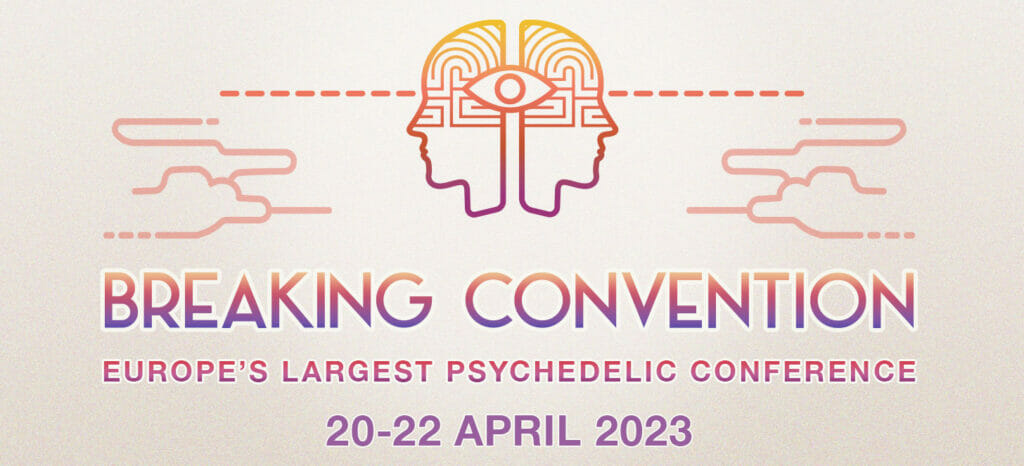
In this episode, Joe interviews Ph.D. student in the Drug Use and Behavior Lab at the University of Alabama Birmingham, Haley Maria Dourron.
She talks mostly about the paper she co-authored last year with Dr. Peter Hendricks and Camilla Strauss: “Self-Entropic Broadening Theory: Toward a New Understanding of Self and Behavior Change Informed by Psychedelics and Psychosis,” which analyzes the long-standing comparisons between the psychedelic state and psychosis, and points out important distinctions between the two – that science should be looking more at the way one processes information and their level of self-focus rather than similarities in outward behavior. She discusses what she calls entropic processing, which is essentially how one’s brain creates novel ideas, relations, and insights based on very loosened mental schemas: with new information being considered in new ways (with no filter), do the connecting pathways that seem like eureka moments actually make sense?
She discusses the broaden and build theory and the broadening of intentional scope; entropy; chronic LSD use and risk of psychosis; schizophrenia and psychedelics; why science needs to embrace naturalistic research, and more. As of this release date, there are still a few participatory spots left in her current study on the effect of psychedelic experiences on people who have a history of psychosis, so if you had an episode of psychosis at some point and have gone on to use psychedelics, she wants to hear your story.
“It’s such a wide open space where there’s still so much room to learn. And to me, it feels as if we’re opening a time capsule of all these different questions that have been kind of covered up, and we now have better technologies to probe what’s really going on.”
“A lot of work was actually done in the 1950s, giving people with schizophrenia LSD, psilocybin, [or] DMT, [and] oftentimes, apparently they had a reduced response. So that just shows how much more room we have to learn what really could be happening with these drugs, what populations necessarily should be excluded, [and] who is actually likely to experience adverse responses.”
“The acute experience might kind of serve as a catalyst for people creating changes, but then it’s ultimately the changes that they make in their daily lives afterwards, and if they’re putting in the work of building those enduring resources, if you will. It might be [easier] to do so in the immediate afterglow of a psychedelic experience, but you’ve still got to try if you want those enduring effects.”
Scientificamerican.com: LSD May Chip Away at the Brain’s “Sense of Self” Network
Verywellmind.com: An Overview of Broaden and Build Theory
Psychedelics Today: PT245 – Robin Carhart-Harris – Psychedelics, Entropy, and Plasticity
Iflscience.com: LSD, DNA, PCR: The Strange Origins Of A Biology Revolution
The Myth of Mental Illness: Foundations of a Theory of Personal Conduct, by Thomas S. Szasz, M.D.
Psychedelics Today: PTSF59 – Bipolar and Psychedelics, with Benjamin Mudge
Investigating the Phenomenology and Perceived Mental Health Impact of Classic Psychedelic Experiences in People with a History of Psychosis (her new study – only a few spots left for participation)

In this episode of Psychedelics Weekly, Joe and Kyle are back at it, talking about news and what’s going on at Psychedelics Today (applications for Vital close this Sunday, March 26, and we’ve just announced a new neuroscience course!).
Following up on last week’s news that Field Trip Health had closed five clinics, they start with more unfortunate news: that Field Trip is laying off a lot of people, Ronan Levy has resigned as the CEO, trading has been suspended, and the company has obtained CCAA Protection (which, through the Companies’ Creditors Arrangement Act, essentially allows a struggling company a chance to restructure its finances to avoid bankruptcy, all through a formal Plan of Arrangement). And in similar news, all Ketamine Wellness Centers (an Arizona company recently acquired by Delic Holdings) would be closing immediately, with employees let go with little warning or explanation. These stories (and Synthesis Institute’s downfall) highlight the sad reality many of us in the psychedelic space forget: that just because a business is heart-centered and psychedelic-minded, it’s still a business, and businesses need to be profitable to survive.
Next, they cover Melissa Lavasani and the Psychedelic Medicine Coalition creating the Psychedelic Medicine PAC (Political Action Committee) to get more government funding behind psychedelic research. Members of PMC went to D.C. last week, presenting a psychedelic briefing to begin the process of educating legislators about the realities of plant medicines and psychedelic-assisted therapy (and Joe was there).
And they discuss more: concerns over Australia’s recent about-face on MDMA and psilocybin being used legally; a recent study where researchers used EEG and fMRI together to record what is happening in the brain while under the influence of DMT (and we should probably have Manesh Girn on again to explain it better than we could); and an interview with Eric Andre at SXSW where, in about 2 minutes, he brilliantly shines a light on drug exceptionalism, the lies of the drug war, and the need for more education on psychedelics – all to a bewildered reporter who didn’t seem prepared to talk to Eric Andre (we are- please come on the podcast!).
Navigating Psychedelics/Beckley Retreats giveaway
Psychedelicalpha.com: Field Trip Health & Wellness Obtains CCAA Protection
Meetfieldtrip.com: Field Trip Health & Wellness Obtains CCAA Protection
AZfamily.com: Ketamine Wellness Centers in Arizona and across county abruptly shut down
NBCnews.com: Candidates who support psychedelics as medicine get a political action committee
Psychedelicmedicinecoalition.org
ABC.net.au: ‘Serious concerns’ over TGA’s decision making on landmark psilocybin, MDMA ruling
Interestingengineering.com: Scientists unlock effect of psychedelic drug DMT on the human brain
Pnas.org: Human brain effects of DMT assessed via EEG-fMRI
Vox.com: Wilder Penfield redrew the map of the brain — by opening the heads of living patients
Beyond the Brain, by Stanislav Grof
The Structure of Scientific Revolutions, by Thomas S. Kuhn
Fox26houston.com: Eric Andre talks his love of psychedelics at SXSW
In this episode, Joe interviews the Co-Founder and CEO of Beckley Retreats, Neil Markey.
Markey describes Beckley Retreats as comprehensive well-being programs, and talks about the importance of holistic wellness – that, while the retreats are centered around two group psilocybin experiences, the true benefits come from complementary factors: the four weeks of online prep and community building before the retreat, the six days in Jamaica surrounding the experiences, the six weeks of integration work after, and the depth of connections people find in the new community they may not have realized they needed so badly. He breaks down the details of the retreats and what they look for in facilitators, and tells a few success stories that really highlight how trauma, opposing ideas, and an infatuation with material objects and amassing wealth can all get in the way of real relationships and meaning.
Beckley Retreats is currently working on two new projects: an observational study with Heroic Hearts and Imperial College London on using psilocybin for-traumatic brain injury, and a study with Bennet Zelner and the University of Maryland to bring executives through a retreat to see how it affects leadership and decision-making: can they prove that these types of experiences lead to more heart-centered leaders?
We are currently running a giveaway where you can win a one-on-one meditation class with Neil and a custom Beckley Retreats tote, as well as many other prizes. Click here to enter!
“The problem, a lot of times with Western medicine, is if you can’t understand the mechanics of it, then we kind of discard it, or if you can’t isolate a single variable, then we discard it. It’s like: well, some things work in tandem. If you actually peel the physics back, it looks like everything’s connected to everything, so we’ve got to think about more comprehensive approaches. I think that you can learn a lot from looking at traditional practices and some of the Indigenous wisdom that’s out there; that there’s a method to how this work has been done for quite some time and we shouldn’t disregard it.”
“If we can help people in a clinic model, let’s do that. But [with a] clinic, again: when you take someone, you give them a mystical experience, and then they go right back home or right back to work and right back into life, are you creating enough space for there to be optimal change? I think we need to keep studying it and asking those questions.”
“[Amanda Feilding] never saw a rule that she didn’t want to break. She’s [this] lifelong badass that has just gone against the grain for her entire career. But it was never about money for her, it was all because she thought she could help people. It’s so inspiring. We need more of those stories; less stories about people that made a billion dollars or whatever and more material things, and [more of] these stories about folks that are just out there trying to help others. It fires me up.”
Brainyquote.com: H.G. Wells quote (Joe said it was Mark Twain)
Pubmed: The gut microbiome and mental health: advances in research and emerging priorities
Maps.org: The Pollination Approach to Delivering Psychedelic-Assisted Mental Healthcare
Nbcews.com: Candidates who support psychedelics as medicine get a political action committee

In this episode of Psychedelics Weekly, David is joined by Kyle, who is finally home after a lot of traveling, to talk shop and dig into the articles they found the most interesting this week.
They begin with the news that Paul Stamets now has a species of mushroom named after him (Psilocybe stametsii), then take a look at a recent self-report study called “Prevalence and associations of challenging, difficult or distressing experiences using classic psychedelics,” which aimed to collect data on just how many psychedelic users (in this study, anyone who had ever tried a psychedelic) felt that they had had a challenging or difficult experience. They discuss the results and highlight some interesting data: that LSD was the most commonly associated substance, that smoking cannabis was one of the most commonly reported interventions, and of course, the question of whether or not these experiences were beneficial.
They then talk about Synthesis Institute closing its doors, the possible hope Synthesis could have, and the sadness in this – when businesses fail, it’s easy to look at numbers and profit margins and be dismissive, but we forget the people involved; not just at Synthesis, but the hundreds of would-be students.
And lastly, they look at an article about a California-based startup called the Reality Center, which uses a combination of pulsing lights, sounds, and vibrations to create a drug-free but seemingly very psychedelic experience, reminding us yet again that you do not need a substance to achieve non-ordinary states of consciousness.
Forbes.com: There’s A New Species Of Magic Mushroom – Named After Paul Stamets
Graham Pechenik’s thread about the Stamets Stack becoming patented
Psychedelics Today: PT314 – Daniel McQueen, MA – Vital Psychedelic Conversations
Psychedelicalpha.com: Inside Synthesis Institute’s Implosion
Oregon.gov: Higher Education Coordinating Commission
Stripes.com: A drug-free, digital psychedelic trip
Psychedelics Today: Allison Pelissier – Lucia N°03 Light Experience
Psychedelics Today: PT394 – We Are The Medicine, featuring: Victor Alfonso Cabral, LSW
Psychedelics, once heavily restricted for research, are now being rigorously tested through clinical trials to explore their potential therapeutic benefits. But how are women represented in the search to uncover the efficacy of psychedelic medicines?
While the inclusion of women in psychedelic clinical trials is clearly important – both to understand the effects of these medicines on all genders as well as to develop effective treatments for conditions that primarily affect women – women have historically been underrepresented in clinical trials.
Why has this become the norm? Is it because women aren’t as available as men to participate in studies? Or perhaps women don’t suffer from the illnesses being studied as often as men?
Spoiler: it’s neither.
The clinical trial process is, largely, a series of research studies that evaluate the safety and effectiveness of new drugs, treatments, or medical devices on human subjects. To fit into a pharmaceutical model, a.k.a. develop a drug or treatment protocol that clinicians can prescribe and health insurance will cover, psychedelic medicines must follow the same clinical trial process that all new drugs and treatments undergo.
If it seems like there’s a new clinical trial announced each week – from psilocybin for depression to MDMA for PTSD to LSD for cluster headaches – it’s because these trials are crucial (and non-negotiable) for biotech companies seeking to bring their compounds and modalities to market. These trials aim to prove the effectiveness of a particular compound or method of use, and ultimately secure the holy grail of U.S. Food and Drug Administration (FDA) approval.
Clinical trials are conducted in several phases, each with specific goals:
Phase 1: A small number of healthy volunteers receive the drug or treatment to evaluate its safety and determine the appropriate dosage.
Phase 2: A larger group of volunteers with the condition that the drug or treatment is designed to treat receive the treatment to assess its effectiveness and side effects.
Phase 3: An even larger group of volunteers with the condition receive the treatment in a randomized and controlled study to confirm its effectiveness and monitor side effects.
Phase 4: The drug or treatment is approved and marketed for public use, and ongoing studies continue to monitor its long-term safety and effectiveness.
Throughout the clinical trial process, participants are closely monitored and data is collected to evaluate the drug or treatment’s safety, efficacy, and potential side effects.
As hard as it may be to believe, it wasn’t until 1993 that women and minorities were required to be included in any NIH-funded clinical research. In 1977, the FDA recommended excluding women of childbearing age from Phase 1 and Phase 2 trials, even if they used contraception, were single, or had husbands with vasectomies.
The objective was to avoid unforeseen birth defects in babies born to women in clinical trials. The result, however, is that most currently prescribed medications were approved by the FDA before 1993 – which means they’re prescribed to women and men at the same dose and were unlikely to have adequate representation of women in their clinical trials.
Francesca Minale, President of Vici Health Sciences and an expert at working with the FDA to bring new medications through clinical trials to approval, says the lack of gender differentiation in dosing persists despite known differences in disease states by gender.
“There is a lack of incorporation of gender data and generic specific dosing and administration on FDA-approved prescription labels,” said Minale. “This gender bias in the research needs to be addressed, especially as it is well documented that many diseases, such as mental health or heart disease, are recognized to have gender differences.”
Excluding women from early-stage clinical trials led to a vast shortage of data around how today’s drugs affect women – a knowledge gap that scientists are still trying to fill. Even though the NIH now requires women to be included in all clinical research funded by the government agency, there are still many criteria that make it difficult for women to participate in clinical trials.
The results of clinical trials play a critical role in informing regulatory decisions about whether to approve new medicines for widespread use. However, in the past, clinical trials often failed to accurately reflect the populations they intended to serve – especially women.
This is actually a pretty big problem, because women experience adverse drug reactions nearly twice as often as men. Women consistently manifest elevated blood concentrations and longer elimination times of drugs, unrelated to differences in body weight.
As psychedelic clinical trials seek to determine the safety and efficacy of new psychedelic treatments, it’s imperative we learn from past mistakes. A recent study identified 86 medications approved by the FDA that are more likely to cause complications for women than men.
But yet it’s common practice to prescribe equal doses of medications to men and women – contributing to the overmedication of women and female-biased adverse drug reactions.
In fact, because women were excluded from many pivotal clinical trials, many drugs have been withdrawn from the market or have had their labels changed to include warnings about increased risks for women after they were already approved by the FDA and widely used.
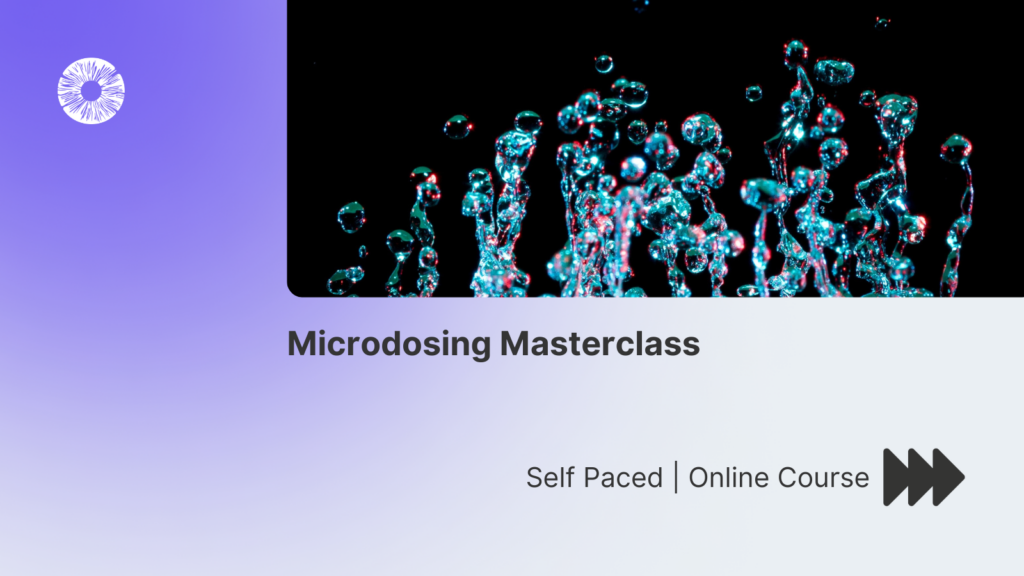
Amy Reichelt, Ph.D., Director of Neuropharmacology at Cybin explained, “In early-stage clinical trials (i.e., Phase 1) where drugs are tested in healthy volunteers, key inclusion/exclusion criteria can bias genders tested.”
Typical protocol wording includes: “Women of childbearing potential (WOCBP) must be non-lactating and have a negative pregnancy test. Females who are not WOCBP must be either surgically sterile or post-menopausal.” Reichelt said. “This immediately excludes a number of women, particularly when age ranges of trials can have cut-offs of 55-60 years.”
Moreover, it is often written into the trial protocol that a woman of childbearing potential must agree to practice an effective means of birth control/contraception during their participation in the clinical trial, and following the trial for several months. This could impact individuals who are trying to start a family for many months, again discouraging women from participating.
Reichelt pointed out, “Later stage trials (i.e., Phase 2b, Phase 3) can be less restrictive as they are testing in patient populations and initial safety tests are fulfilled in the healthy volunteers in early stage trials, but still there are often requirements for contraceptive use that fall upon the women’s responsibility.”
In addition, body weight restrictions may also prevent women from participating if they are below the protocol threshold i.e., less than 60 kg/132 pounds.
The differences between the sexes in circulating levels of sex hormones, such as testosterone and estradiol, can affect pharmacokinetic or pharmacodynamic parameters – which help determine how the drug is absorbed, distributed and metabolized in the body, and how the drug affects the body, Reichelt explained.
Body composition can impact how a drug is processed and eliminated from the body, too. “Women typically have a lower body weight than men, so when the same dose of a drug results in a higher level of drug circulating by body weight. As women generally have a greater body fat content than men, some drugs can be distributed through the body differently,” said Reichelt.
The impact of sex can differ across life stages, too. After menopause, the reduction of estrogen can alter aspects of brain plasticity. Preclinical studies have shown that at the neuronal level, estrogen can increase the density of dendritic spines.
This brain phenomena may subtly affect mood and cognition during a woman’s estrous cycle, and could affect clinical outcomes. More studies are needed to fully understand these impacts, especially when it comes to psychedelic medicines which are closely tied to brain plasticity and dendritic spines.
For Natalie Gukasyan, M.D., Medical Director of Psychedelic and Consciousness Research at Johns Hopkins University School of Medicine, the physiological differences between men and women in the psychedelic experience and outcomes is an area that requires further investigation.
“We don’t yet have a clear understanding of how different biological factors, such as hormonal fluctuations, including menstrual cycle and menopause, may impact the psychedelic experience. However, it does seem that psychedelics may have an impact on menstrual function,” she said.
Gukasyan co-authored a recent study published in the Journal of Psychoactive Drugs on the impact of psychedelics on menstrual function. While the study looked at only three women ranging from 27 to 34 years of age, the results were significant enough to warrant more research.
“Although phenomena related to menstrual and reproductive function have been largely overlooked in the psychedelic literature to date, these effects may have therapeutic utility and warrant further study,” the study concluded.
In the field of psychedelic medicine, where compounds are being extensively studied scientifically for the first time, the underrepresentation of women in clinical trials could have serious consequences for the safety and efficacy of these treatments. Without data on the experiences of women, it is impossible to accurately assess the potential benefits and risks of these new medicines before bringing them to the masses.
By working to increase the representation of women in clinical trials for psychedelics, we can help to ensure that these treatments are developed in a way that is safe, effective, and equitable for all.
Thankfully, many psychedelic clinical trials are moving forward with this ethos. For example, two-thirds of the participants in the MAPS’ Phase 2 and 3 clinical trials of MDMA therapy for the treatment of PTSD were women.
Rick Doblin, the founder of MAPS, said, “When it comes to PTSD, we talk a lot about the veterans, but it’s mostly women who are sexually abused or have childhood traumas that have PTSD. I think that the media attention on veterans sort of distracts people from the understanding that it’s mostly women that we are treating. Two-thirds of the people in the [MAPS] study are women.”
So far, MAPS has administered MDMA to approximately 1,700 human subjects. Their recent Phase 3 clinical trial of MDMA-assisted psychotherapy for PTSD also included an assessment of gender identity beyond the binary male and female gender assigned at birth – an important distinction since transgender and gender diverse (TGD) people experience PTSD at higher rates than the general population.
Other groups conducting clinical trials actively seeking women participants include Psycheceutical Bioscience, which has partnered with clinical research organization (CRO) iNGENū in Australia to conduct its Phase 1 and Phase 2 trials of a topical ketamine cream to treat PTSD.
“iNGENū takes gender balance in clinical trials very seriously and the diversity of participants is one of the key metrics we strive to achieve. We naturally want our clinical trials to recruit participants who closely match the intended population who will benefit from the drug when it is eventually approved,” said iNGENū CEO Dr. Sud Agarwal.
While the inclusion of women in psychedelic clinical trials is critical to the success of this new paradigm in medicine, there’s also a whole realm of largely untapped research on the benefits of psychedelics for health conditions experienced only by women.
Felicity Pharma is a psychedelic biotech company focused on women’s health that’s secured a proprietary psilocybin-based drug for premenstrual dysphoric disorder (PMDD), a very severe form of premenstrual syndrome that affects up to 10 percent of women globally as well as postpartum depression.
Olivia Mannix, Felicity Pharma co-founder and CEO, said “We are passionate about transforming women’s healthcare. Women have been traditionally excluded from clinical trials because of hormonal fluctuations and general biological makeup. We are making a stand to develop female-focused therapeutics, where women will be the only patients used in trials.”
In this episode, Joe interviews Dr. Devon Christie: Senior Lead of Psychedelic Programs at Numinus, educator at CIIS and Vital, and MAPS-certified MDMA therapist; and Dr. Pamela Kryskow, MD: founding board member of the Psychedelic Association of Canada and Medical Lead of the nonprofit, Roots To Thrive.
Christie and Kryskow recently co-authored one of the first papers looking at MDMA for chronic pain, “MDMA-assisted therapy is associated with a reduction in chronic pain among people with post-traumatic stress disorder,” which came about after they received access to MAPS’ Phase 2 data from a lead-in PTSD study and noticed significant improvements in pain measurements – something the study was not looking for at all. They’re looking into where chronic pain fits within the frameworks of Western medicine and psychedelic-assisted therapy, and discuss the many reasons why MDMA should be tremendously helpful for chronic pain and other conditions that fall under the large umbrella of central sensitivity syndromes and nociplastic pain. They are currently working on a new study following the MAPS protocol that will research MDMA-assisted psychotherapy specifically for people with fibromyalgia, which some believe might be physicalized PTSD. If you’d like to contribute a tax-deductible donation, visit giving.viu.ca, select “other” from the dropdown, and type in “MDMA for Fibromyalgia.”
They talk about how research trials focus too much on the molecule while ignoring what the patient is saying; how a large percentage of physicians and patients don’t at all like the psychometrics used in measuring data; how physicians regularly use expectancy bias but research trials don’t (and how that affects results); why everyone needs to place higher importance on the biopsychosocial model; the idea of being more humble with science and using “theoretical” more often; the problems with microdosing trials; and the issues with evidence: If there isn’t sufficient evidence, why isn’t there? And what exactly would be sufficient?
“It’s kind of an irony because it’s really a single molecule pharmaceutical model to go: ‘Is it working?’ whereas every day, every clinician out there is using expectancy and placebo effect to their patients’ benefit. So, I would like us to have that conversation in a much more intelligent way, saying it’s going to be there, it’s not a bad thing, and in fact, if you don’t have that, you’re probably a bad clinician. So, let’s harness it, and then say, ‘and is the treatment [going] above and beyond that?’” -Pam
“Where’s the scientific curiosity? That’s what we need to be. When our patient says: ‘This is helping me,’ we should never be saying, ‘No, that’s not possible because there’s no evidence.’ We should be leaning in and being curious: ‘Tell me more.’” -Pam
“Homogenizing through trying to do the randomized control trials, you end up sort of sterilizing to isolate one specific variable in trying to make your study population as similar as possible. And in the real world, that’s just not the case. In the real world, people are on 10 different medications. So what’s really even the applicability when we sterilize and homogenize so much [for] what we believe is giving us the best evidence?” -Devon
“If we really look and open our eyes, in many, many circumstances, the pathology is not individual whatsoever. The pathology is in our culture and in our society and how disconnected we are and the intergenerational trauma that’s passed along, and then parents without support and no hope of not passing that along because our society isn’t providing the optimal environment on a societal level for us to be thriving. So I think a cure on an individual level needs to be couched within thinking about a cure on a collective level.” -Devon
“The reason I got involved even in the research is because so many of my patients were coming to me and saying, ‘I am microdosing. It is helping.’ So it goes back to: Do you believe people? And I personally believe my patients when they say that. …When I have people coming in and saying ‘I’m out of bed now. I used to lay in bed for 18 hours a day and now I’m out, I bought a dog, I’m exercising’; if it’s a placebo or expectancy, awesome. I’m going to celebrate that.” -Pam
Donate to the MDMA for Fibromyalgia study (select “other” from the dropdown, and type in “MDMA for Fibromyalgia.” (tax deductible and no fees)
Psychedelics Today: PT306 – Dr. Devon Christie – Vital Psychedelic Conversations
NYU Langone’s Department of Psychiatry: Center for Psychedelic Medicine
Imperial College London: Centre for Psychedelic Research
In this episode of Psychedelics Weekly, the rest of the team is out or at Cannadelic, so a new voice steps up to the plate: Julian Bost, who works with the Vital team and handles the majority of our email, records his first podcast with Ph.D. candidate in Neuroscience, friend of the show, and speaker at Convergence: Manesh Girn.
You may remember the team covering some articles at the end of December and early January that were quite confusing and immediately met with a response of: “yea, we should have someone on to explain this to us.” This is that episode, with Manesh breaking down three very scientific articles into much simpler terms (at least we hope).
He covers:
“The psychotomimetic ketamine disrupts the transfer of late sensory information in the corticothalamic network,” which found that ketamine created hyperconnectivity in rodents’ brains, impairing their ability to process sensory input, which could lead to a better understanding of schizophrenia;
“Psilocybin induces acute and persisting alterations in immune status and the stress response in healthy volunteers,”: which showed an interaction between psilocybin and the stress system, immune system, and central nervous system – showing a greater recognition for how the immune system and inflammation are involved in disorders;
And a paper he co-wrote with Dr. Robin Carhart-Harris and many others, “Canalization and plasticity in psychopathology,” which aims to reframe neuroplasticity, disorders, and psychedelic interventions, and leads to a discussion on how adaptive thought patterns develop, the ability to relearn as “Temperature or Entropy Mediated Plasticity (TEMP),” Daniel Kahneman’s idea of fast and slow thinking, early trauma intervention, and the concept of viewing mental illness as a process rather than an identity.
As confusing (at least to the layperson) research seems to pop up daily, we may have Manesh on from time to time to help us understand some of these studies. How did he do? Did he clear up any of these articles for you? And should Julian be on the podcast more?
YouTube: The Psychedelic Scientist
Psychedelics Today: PT258 – Manesh Girn – Psychedelics and the Brain: Neuroplasticity and Creativity
Psychedelics Weekly on YouTube
Sciencedirect.com: Canalization and plasticity in psychopathology
Wikipedia.org: Thinking, Fast and Slow
In this episode, Joe interviews Dr. Andrew R. Gallimore: computational neurobiologist, chemical pharmacologist, researcher, and writer of Alien Information Theory: Psychedelic Drug Technologies and the Cosmic Game.
Gallimore feels that DMT is the most efficient and effective reality switching molecule we’ve seen, and that there is no other psychedelic experience that is so in your face: If we really could communicate with entities not of our known universe (who may have created our universe), how can so many dismiss that as a hallucination? Why would we not want to pursue something so mind-bending and revolutionary? His hope for his newest book, Reality Switch Technologies: Psychedelics as Tools for the Discovery and Exploration of New Worlds, is that it will be the quintessential guide for how psychedelics work in the brain from all levels of organization, what happens when you perturb the brain, and the future: how we might be able to fine-tune our brains to access different realities at will.
He discusses the element of design used in his books; why understanding something as complex as DMT is a multidisciplinary practice; the genius of Terence McKenna; what Alien Information Theory was about; his work with Rick Strassman in researching intravenous infusion DMT pumps to keep someone in the DMT verse; Conway’s Game of Life and the unpredictable levels of complexity that can arise from simple rules; lucid dreaming; John Mack, alien abductees, and trusting a patient’s experiences as real; psilocybin yeast; and much more.
This one will definitely make you think!
“It’s always felt a little bit sci-fi in a way, in that you’re planning basically a program of inter-dimensional citizenship. It feels like that. I mean, Terence McKenna used to [say] ‘galactic citizenship,’ and it’s almost like we’ve leapfrogged over galactic citizenship and we’re now going straight to inter-dimensional, trans-dimensional citizenship (whatever you want to call it) where we’re interfacing and communicating with an intelligence not of this universe. I mean, that’s a wild idea. And we have the technology now. To me, this infusion technology; this is the way to do it.”
“We’re just at the beginning now. You take virtual reality technology and the way that that is progressing, then you add artificial intelligence into the mix, and then you add pharmacology and neuropharmacology, chemical pharmacology and other neural manipulation systems, and you begin to realize that our brain is this tool – this world-building machine that we can learn to tune to access other worlds.”
“There’s also deja vu of course, the sense of having been there before – this very profound, deep sense of deja vu; not like we’ve all had, that occasionally you get that sense of deja vu that something has happened before. This is like, ‘I really, really have been here before. This is the most bizarre place I couldn’t possibly have imagined or conceived of; an impossible place of impossible geometry, and yet at the same time, it seems bizarrely familiar. ‘Why? Why would some place that should be the most unfamiliar place possible– There isn’t a more unfamiliar realm that you could imagine than the DMT world, and yet people think, ‘Oh my God, I’ve come home.’ And the entities, the elves will sing and cheer and bells will ring and lights will flash and [they’ll] say, ‘He has returned! The one has returned home! Welcome back! We’re so pleased to see you!’ This great uproar, this great celebration as you burst into this space. Why would that happen?”
Psychedelics Today: Dr. Andrew Gallimore – Accessing High-dimensional Intelligence through DMT
Psychedelicreview.com: Early Clinical Research History of DMT
Wikipedia.org: Conway’s Game of Life
Newatlas.com: Scientists turn yeast into psychedelic psilocybin factories
In this week’s episode, Joe and David meet up to talk about Vital, Convergence, and the latest news:
-Tryp Therapeutics and Mass General signing a letter of intent for a Phase 2 clinical trial investigating the effects of psilocybin-assisted psychotherapy for the treatment of Irritable Bowel Syndrome – interesting because it further highlights the likely effect of psychedelics on the brain-gut connection and that psychotherapy is involved;
-New York lawmakers pre-filing a bill to legalize DMT, ibogaine, mescaline, psilocybin and psilocyn (and remove them from the state’s banned substances list) for 2023;
-New York’s first cannabis dispensary finally opening on December 29;
-British Columbia responding to their opioid crisis (the latest data reports 14k deaths since 2016) by beginning a Portugal-like decriminalization model, allowing people 18 years and older to carry a combined 2.5 grams of drugs (heroin, fentanyl, cocaine, methamphetamine and even MDMA);
and finally, an interesting but confusing (maybe a follow-up is necessary) article showing that what we’re learning about ketamine could lead towards a better understanding of psychosis and schizophrenia.
PT283 – Greg McKee – Nociplastic Pain and Psychedelics
Lucid.news: Researcher Charles Nichols Studies the Impact of Psychedelic Substances on Inflammation
Marijuanamoment.net: New York Lawmakers File Psychedelics Legalization Bill For 2023
Fox5ny.com: NY lawmakers propose bills to decriminalize, study psychedelics
Cheknews.ca: B.C. poised for drug decriminalization experiment, but will it help stem deadly tide?
Neurosciencenews.com: Ketamine Found to Increase Brain Noise
Sciencedirect.com: Canalization and plasticity in psychopathology
In this week’s episode, Joe and Kyle are together again before Kyle sets off for a 2-month road trip centered around Vital retreats, where we hope he’ll be able to report in from live while in Jamaica.
They talk about Vital: applications are open for the April 2023 edition and close in February, so if you have questions, check out the website or attend an upcoming Q+A. And Joe and other members of the team will be at MAPS’ conference in Denver this June (use code PT15 at checkout for 15% off), as well as Cannadelic in Miami this February.
And for the news, they highlight four stories this week: “Psilocybin induces acute and persisting alterations in immune status and the stress response in healthy volunteers,” showing that, even with a small study, long-term stress response was much lower than the placebo group; The Economist highlighting psychedelic medicines as one of the five stories to watch out for in 2023; the Minnesota Medical Association endorsing the decriminalization of drugs with a 219-34 vote, mimicking the Portugal model and saying that there is insufficient evidence to support the claim that criminal penalties for possession deter drug use; and San Francisco Senator Scott Wiener submitting a new version of his previously denied SB-519 (now SB-58) that no longer includes LSD and MDMA – modeling the more natural medicine model that we’ve seen succeed in other states. As Joe says often, we want everything and we want it now, but every step helps, as we’ve seen with recent posts about people not being sent to prison for the rest of their lives.
Vital 2023: Informational Session and Q&A
Psychedelicscience.org (MAPS conference, use code PT15 for 15% off)
Psychopharmacology in Maastricht’s Twitter thread about this study
The Economist: The World Ahead 2023: five stories to watch out for
Yahoo.com: Medicine Innovations Group Announces Closing Under Share Subscription Agreement
Marijuanamoment.net: Minnesota Medical Association Endorses Decriminalizing Drugs
Sfgate.com: ‘Magic mushrooms’ would be decriminalized in California under new bill
In this week’s episode, Joe and David team up again to discuss what news interested them the most this week: the DA dropping a felony drug charge against a mushroom rabbi in Denver due to the passing of Proposition 122; Numinus Submitting a Clinical Trial Application to Health Canada that would give in-training practitioners the ability to experience psychedelics with their psilocybe-containing EnfiniTea; and a University of Exeter-led trial moving forward with the next step in a study using ketamine for alcohol use disorder (with 2/3 of the money coming from the National Institute for Health and Care Research).
They also review a paper that analyzed the economics of psychedelic-assisted therapies and how insurers come into play; as well as The Journal of the American Medical Association stating that, based on current trajectories compared to cannabis legalization, they believe the majority of states will legalize psychedelics by 2037. So nice to see these continued steps in the right direction!
And if you missed it, we just announced that applications are open for the next edition of Vital. There are incentives to paying in-full by certain dates, so if you missed out on last year’s edition or have been curious, attend one of our upcoming Q+As!
Cure for common cold? New research finds immune response in nose that plummets when temps drop
Vitalpsychedelictraining.com (Applications open now!)
Vital 2023: Informational Session and Q&A (Have questions about Vital? Attend one of these sessions)
Convergence: Where Conference Meets Festival
The Way of the Psychonaut Vol. 1: Encyclopedia for Inner Journeys, by Stanislav Grof, MD, Ph.D.
The Psychedelic Explorer’s Guide: Safe, Therapeutic, and Sacred Journeys, by James Fadiman, Ph.D.
Congress.gov: H.R.1308 – Religious Freedom Restoration Act of 1993
Frontiersin.org: The economics of psychedelic-assisted therapies: A research agenda
Jamanetwork.com: Psychedelic Drug Legislative Reform and Legalization in the US
Psychedelicalpha.com: Psychedelic Legalization & Decriminalization Tracker
Bbc.com: Ketamine for alcoholics trial goes to next stage
Psychedelics Today: Webinar: Psychedelic Integration and Depth Relational Process – 12/9
In this week’s episode, Joe and David team up for the first time to discuss three articles: Chacruna’s breakdown of the study, “Ceremonial Ayahuasca in Amazonian Retreats – Mental Health and Epigenetic Outcomes From a Six-Month Naturalistic Study,” Double Blind’s “Why the ‘Psychedelic Renaissance’ is just Colonialism by Another Name,” and the results from the trial of a 20-year old woman who died at the 2017 Lightning in a Bottle music festival – where the jury found Do Lab, Inc., RGX Medical, and RGX Founder Richard Gottlieb to hold 75% of the liability in her death, with MAPS holding 25%.
In discussing these articles, much is covered: methylation and genetic memory; addiction; gut biome; cesarian births; how much inequality is built into the “psychedelic renaissance” due to it primarily evolving out of inherently unequal Western societal paradigms; permaculture; new ways to be together; Burning Man; the concept of the nuclear family; the power in working with your hands; creativity; harm reduction and the lack of readily available drug testing kits; and more.
Psychedelics Today: PT295 – Sidarta Ribeiro – Dreams, LSD, and Biopiracy
The Way of the Psychonaut Vol. 1: Encyclopedia for Inner Journeys, by Stanislav Grof, MD, Ph.D.
Doubleblindmag.com: Why the “Psychedelic Renaissance” is just Colonialism by Another Name
Wikipedia.org: Nagoya Protocol
How Soon Is Now?: A Handbook for Global Change, by Daniel Pinchbeck
Shop Class as Soulcraft: An Inquiry Into the Value of Work, by Matthew B. Crawford
Maps.org: Jury Finds in Favor of Plaintiffs in Trial on Harm Reduction and Medical Responsibility
Lucid.news: MAPS Found Liable in Wrongful Death Lawsuit
MAPS’ Settlement-and-Release-Agreement-5.27.21
In this week’s episode, Joe and Alexa talk about the excitement brewing around our first conference-meets-festival, Convergence (March 30 – April 2 at the Wisdome in LA), and some of the sponsorships starting to come in (interested? email Alexa@psychedelicstoday.com).
Then, they dive into what intrigued them the most this week: a study looking into potentiality and possible causes of 5-MeO-DMT reactivation (and what reactivation actually is); New York cannabis farms sitting on $750 million worth of cannabis as the government drags its feet on licenses; and the story of a woman who used cannabis and psilocybin as an adjunct to standard therapy in the treatment of advanced metastatic breast cancer.
Convergence (Use code PTINSIDER10 for 10% off!)
Thebrothersapothecary.com (Use code SHROOM for 30% off)
Psychedelics Today 236 – Drugs: Honesty, Responsibility, and Logic, featuring: Dr. Carl Hart
YouTube: Norm Macdonald talks LSD
Psychedelics Today: HPPD and Flashbacks: Everything You Need To Know – And What We Don’t Know, Too
Bloomberg.com: New York Cannabis Farms Have $750 Million of Weed — and Nowhere to Sell It
Lucid.news: Researcher Charles Nichols Studies the Impact of Psychedelic Substances on Inflammation
In this episode, Victoria hosts a bit of a microdosing roundtable, speaking with three champions of microdosing: “The Father of modern microdosing,” James Fadiman, Ph.D.; Adam Bramlage, Founder/CEO of Flow State Micro (a functional mushroom company and microdosing educational platform); and Conor Murray, Ph.D., a neuroscientist at UCLA who conducted the world’s first EEG microdosing study.
Fadiman and Bramlage recently launched a very popular course through our Psychedelic Education Center: “Microdosing Masterclass,” which covers the history and science of microdosing, as well as best practices for microdosing safely and effectively. They discuss the roots of microdosing, decriminalization and concerns over the corporatization of psychedelics, what we’ve seen so far in research, and how we’re finding ourselves in an era where people are going to be allowed to actually help themselves.
Murray is hoping to make big waves in the promotion of microdosing with the world’s first take-home EEG microdosing study: participants will be mailed a wireless headband that will be able to track brain activity in real world scenarios – the citizen science we’ve so desperately needed in comparison to lab studies that couldn’t be more different from how people actually live day-to-day. There is no criteria to participate, and, in contrast to lab studies, they want all data possible: people who are in therapy or not, people following different microdosing protocols, people microdosing for different reasons, etc. Will microdosing improve brain scores on cognition and emotion? Will participants see measurable improvements? And how will these numbers look when comparing scores months after initial peak neurological windows?
If you’d like to participate, head to psynautics.com and sign up. The first 50 people to do so will receive the wireless EEG to track their brain for one month for only $40.
“Because it’s inherently interesting for people to find that their consciousness can be improved (not necessarily changed) and that their whole physical system can also be improved, microdosing has found a natural niche which is: it might be good for you, and as far as we can tell, it’s very, very, very, very, very rarely bad for you. And that’s a nice risk/reward ratio.” -James
“It’s hard to fool the brain. You can maybe have a good placebo effect if you’re trying to ask someone: how much do you think your cognition’s improving today or emotion’s improving today? But it’s harder to fool the brain into having a different answer.” -Conor
“There’s so many people who will not buy into this until it’s proven by modern science, and that’s why Conor and his work is so important, and this new study with the wireless headbands and the idea that every citizen scientist on the planet can write Conor at Conor@psynautics.com and be a part of this study and get a wireless headband – I mean, that is fascinating. That is taking microdosing out of a sterile lab and putting it into the natural environment where it came from, as hunter-gatherers, for hundreds of thousands of years.” -Adam
“That’s really the metaphor, which is: the more windows, the more you see different views, and there’s nothing good or bad about any particular window except how clean it is. …We’re opening up bigger windows in more directions than has been the case in the past.” -James
Adam and James’ Microdosing Masterclass
The Art of Microdosing Q+A with Dr. James Fadiman & Adam Bramlage (A Psychedelics Today webinar)
Psychedelicsocietysf.org: Microdosing Movement masterclass
Psynautics.com (order your headset here)
UCLA Psychedelic Studies Initiative
The Psychedelic Explorer’s Guide: Safe, Therapeutic, and Sacred Journeys, by James Fadiman, Ph.D.
Hightimes.com: North America’s First Take Home Psilocybin Trial Approved in Canada
YouTube: “Drugs: The Children Are Choosing” 1969 Drug Abuse Awareness & Discussion Film
This week features David Drapkin, Joe Moore (for the first part), and introduces Alexa Jesse, who you’ve probably heard in ads, but who makes her first appearance on the podcast.
They discuss two big political moves in the advancement of psychedelics: the creation of the Congressional Psychedelics Advancing Clinical Treatments (PACT) Caucus (led by Representatives Lou Correa (D-CA) and Jack Bergman (R-MI)), and the filing of the Breakthrough Therapies Act by Senators Cory Booker (D-NJ) and Rand Paul (R-KY).
And they talk about the story of Jim Harris overcoming paralyzation through psilocybin; NICE (National Institute for Health and Care Excellence) determining that Esketamine is not cost-effective; new progress in Germany and Finland; MDMA-assisted therapy (and other psychedelics) showing alleviation of chronic pain; a ramp up in LSD research for Alzheimer’s studies; and more.
Plus, we hear a bit of Alexa’s story, wish Joe and Johanna happy birthdays, and talk about what’s most immediate in the PT world: Early Bird pricing ending today for our first conference, Convergence (use code PTINSIDER10 for a 10% discount!), and the next round of Navigating Psychedelics launching next week.
Bipartisan Lawmakers Form New Psychedelics Caucus In Congress (Marijuana Moment)
Psychedelicmedicinecoalition.org
House Lawmakers Launch Bipartisan Psychedelics Caucus (High Times)
Jim Harris Was Paralyzed. Then He Ate Magic Mushrooms (Outside Online)
Surprising Results: Psilocybin Trial for Depression Alleviates Chronic Pain (Psychedelics Today)
Why Did Psychedelics Relieve My Chronic Pain? (Psychedelics Today)
Chronic Pain and Phantom Limb Pain: Could Psilocybin Be the Answer? featuring: Timothy Furnish, MD & Joel Castellanos, MD (Psychedelics Today)
Second MAPS-Sponsored Phase 3 Trial of MDMA-Assisted Therapy for PTSD Completed (MAPS)
Finland grants license for psychedelic drug therapy study (YLE)
Psychedelic Storytelling: Transforming Out Loud, featuring: Cory Firth (Psychedelics Today)
German Government Funds Psilocybin Study for Depression (Mind and Brain Institute)
Chris Hemsworth Learned He Has a High Alzheimer’s Risk: What to Know (Healthline)
In part 2 of the article, “Surprising Results: Psilocybin Trial for Depression Alleviates Chronic Pain,” the disappearance of Court’s chronic pain leads to a new understanding of cortical remapping, mirror box therapy, and how science can treat phantom limb pain.
I had years of experience in cold water training from my Aikido career, but as my depression had increasingly grown worse, I developed a severe cold intolerance. It had become painful to stand under the shower, with my scalp almost spasming in contraction, when I used to be able to stand in late winter melt-water waterfalls and rivers with ease. But post-dosing, my cold tolerance came roaring back; allowing me to stand under a cold shower for minutes at a time with no numbness and no pain – it was almost like it was happening to someone else or there was a micro-force field on the surface of my skin. I found myself having to leave the shower because I just had other things to do. Cold water tolerance is a gold-standard for measuring pain response in clinical trials, and in fact, later that year, the Department of Psychopharmacology at Maastricht University, sponsored by the Beckley Foundation, conducted the first LSD and pain study in nearly 50 years, showing that low-dose LSD significantly increased cold water tolerance without interfering with day-to-day activities.
I had been known for my mobility and flexibility throughout my career and my ability to train others to achieve the same results, but mine had been compromised for a good while at this point. But the day after my session, I was able to resume positions that I hadn’t been able to comfortably acquire in months, if not years. Movement now felt smooth and effortless once again, and I swear there was even improvement in the tissue quality in areas that had become “crunchy.”
There was also a significant change in my inflammatory baseline. Depression is seen as a disorder that also includes fairly significant neurological inflammation and is often bi-directional with chronic pain, but many of the same receptors that psilocybin operates on are also contained within the gastrointestinal tract, and mine had altered sensation for a month afterward. I believe my systemic inflammation significantly improved during that period because within three months of my dosing, I reacquired personal training records that had become elusive, and by summer, I passed those PRs and set new ones. I also felt incredibly less “puffy.” Accidentally banging into something didn’t hurt anymore and persistent joint aches and lack of motor activation disappeared. There were additional improvements in neurological issues that will be described in a future case study, but that was just as immediate and impactful.
Within the training and recovery world, patients and trainees can loosely be categorized as super, normal, non, and negative responders. I had stopped being responsive to both training and rehabilitation efforts at the peak of my depression, and was entering negative-responder territory, which was severely distressing. Fascinatingly, I now seem to be trending somewhere between a normal and high responder. I began proclaiming to the researchers at NYU that psychedelics were going to completely change chronic pain treatment within five years. And I also had a secret; the day after my dosing session, I had what’s referred to as a huge download: I realized that if you could consider things like depression, PTSD, and severe anxiety to be nociplastic outputs of the Central Nervous System (CNS) that causes iterative rumination (a.k.a. looping maladaptive outputs), that was no different from the looping maladaptive outputs that characterize chronic pain – the neurology of which I had been studying for years at that point. Due to the extreme visual qualities of the psychedelic experience and the rapidity of my own remission, I saw, in a flash, that since psilocybin was an impact booster for neuroplasticity, it would enhance the impact of mirror box therapy for phantom limb pain or likely any other neuromodulation.
“Remapping” is the term describing the tactic of using visual or other sensory receptor inputs to modify and change nociplastic or noxious/painful outputs of the brain. As this is part of the Z-Health process, I had been introduced to the concept of mirror box therapy years earlier as part of my certifications, but I thought I had come up with a whole new approach and kept it to myself, barely hinting at what I believed I had uncovered. But, since NYC was locked down and I was unable to work, I had nothing to do but go online and research what had happened to me.
Within two weeks or so, I found an old photocopied English abstract from a 1962 study in Japan, by Kuromaru, et al., using low-dose LSD to treat phantom-limb pain with 50% of its participants going into instant remission by the end of their session, and the authors pointedly declaring that stacking the LSD with movement had a far stronger impact on resolving both phantom limb pain and phantom limb syndrome. Stacking inputs is a common practice within the neuromodulation world for pain treatment, often coupling a weaker input with a stronger one, and I realized that this was what had clearly happened to me while I was in my post-dosing neuroplastic window. It finally felt like I was getting traction again; that drills and exercises were once again effective, and crucially, maintaining their own momentum. I didn’t have to be hypervigilant anymore in my daily routine for these drills to become “sticky.” I also realized that the Kuromaru study had, in fact, been released earlier than the Kast study from 1964 investigating the analgesic properties of LSD for terminal cancer and other painful conditions, which is frequently and incorrectly cited as the first psychedelic pain study. I became aware of other previous psychedelic pain studies, as well as recent ones like Dr. Charles Nichols’ work on the anti-inflammatory properties of psychedelics, and studies involving Dr. Robin Carhart-Harris’ REBUS model and cortical reorganization, which is what happens when a stimulus results in the creation of a new cortical map (essentially a vertical column in the brain cortex consisting of neurons performing specific processes).
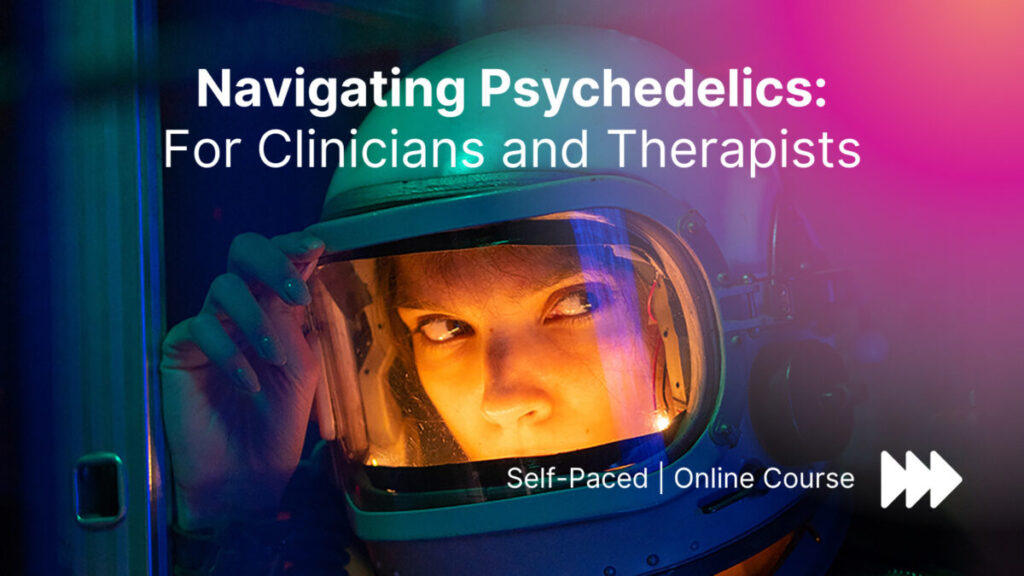
Both of these discoveries are crucial because cortical reorganization (or remapping) and inflammation are key drivers of chronic pain. Conditions like depression and anxiety are characterized by rigid, fixed beliefs or frameworks where the same negative thought loop keeps reoccurring repeatedly, with no amount of incoming contrary information able to alter that belief. It becomes what’s known as a “strong prior” in neurology, becoming a top-down driven process in the CNS, actively suppressing any bottom-up sensory input error correction. The same mechanisms of action occur with chronic pain, where, despite the healing or resolution of an injury; a rigid, fixed pain signal is continually being sent out by the brain as a maladaptive response of the CNS’ protective suite. These are referred to as nociplastic or noxious neurological conditions. The same is true for multiple chronic pain conditions where inflammation causes maladaptive signaling and perceptions, leading to negative structural or nociplastic changes in the peripheral and central nervous system. In psychedelic-assisted psychotherapy, a non-rigid, chaotic state is induced, which allows the cortical landscape to reorganize into a more efficient and positive state.
As everything was becoming more and more clear – in what had to have been one of my most transpersonal moments after my dosing session – a landmark review paper was published. “Chronic pain and psychedelics: a review and proposed mechanism of action” by Dr. Joel Castellanos, et al. was released from the Psychedelics Health and Research Initiative (PHRI) at UC San Diego in May of 2020, barely two months after my dosing session and pain revelation. It was an amazing overview of all the possible mechanisms of action that could be at play in psychedelics being an effective analgesic and resolver of chronic pain, but the most revelatory moment was when I found, buried within the heart of the paper, a link to the case study that had set PHRI in motion. It was written by the world-renown neuroscientist VS Ramachandran, the clinical faculty at PHRI, and by its case subject, Albert Lin, who had used high-dose psilocybin coupled with mirror box therapy to put his intractable phantom limb pain into full remission.
I sat speechless for at least five minutes, shaking my head in a feeling of wonder and disbelief, as if the universe itself had just delivered this paper to me. Other than my remission and the pandemic, I had thought of nothing else but the application of how these two approaches could be combined. Of course someone else had invented it well before me; of course they had. I knew that resourceful, capable people had been working on this for a while, and chronic pain is a singular motivator, but it was still astonishing to see my vision so vividly applied and executed.
I had learned in 2015 that cluster headaches had been effectively treated with psilocybin for 25 years, and of mirror box therapy a few years before that. I had even blogged about it because people in the rehab and training communities thought that my using visual inputs to treat pain was so weird they called it “voodoo.” But there is a neural hierarchy, and many pain and performance conditions in the body actually have higher-order components within the visual and vestibular systems. That’s often why, no matter how much manual/physio therapy one does, it is often a downstream compensation within the body in order to reconcile perceptual discrepancies between the visual and vestibular system. The visual system lets you assess the surrounding environment and predict any threats that exist within it, and the vestibular system helps you orient within that space, keeping your body in balance so that you might be able to execute any motor actions in response to any perceived threats. If your eyes are telling you the horizon is 5° tilted to the left, but your vestibular system, a.k.a. your inner ear, is telling you that it’s 5° to the right, your body will compensate so that those discrepancies are reconciled and you maintain a stable, level “sight picture” – your viewscreen of the world. Having an unstable sight picture makes for poor predictions; in other words, in an evolutionary survival context, having a “shaky cam” is not so great for avoiding saber-tooth tigers.
So, those downstream bodily compensations that keep your viewscreen steady are creating distortions and possible maladaptations in the structure of your body, and are now being cemented due to repeated compensatory use. The nervous system will protectively reduce motor output and increase pain perception as a response, to slow you down in order to avoid potential injury and survive another day. Ultimately, the body has evolved towards survival, not performance. And pain is an alarm/action signal designed to keep you alive.
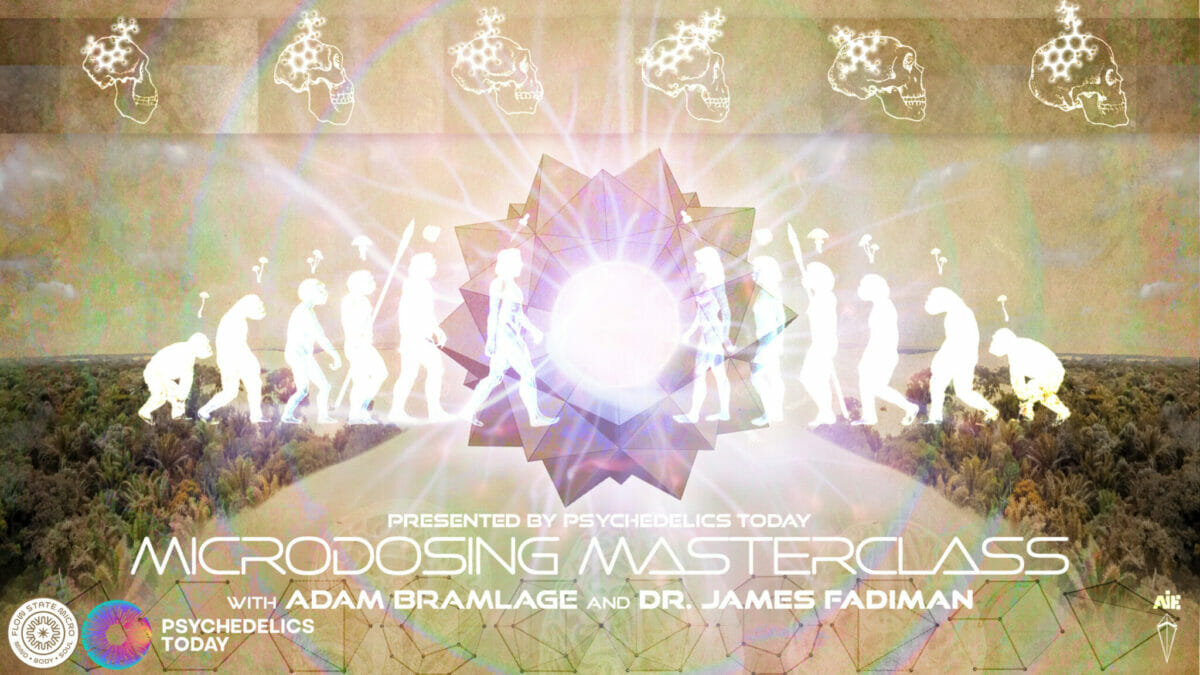
When we look at phantom limb pain, what we’re seeing is the phenomenon known as deafferentation: the loss of afferent or ascending inputs from the peripheral nervous system up to the brain. No limb equals no signal, and the loss of signal is very dangerous within an evolutionary context because limb loss due to injury or infection will mean, at the least, loss of sensation and loss of coordination for motor outputs/muscle contraction/movement, meaning a lost ability to gather food or to avoid threats. Or worse, it could mean signaling that you’re going to bleed to death in a matter of minutes.
Multiple pain conditions could be considered sub-clinical deafferentation: peripheral neuropathy from conditions like diabetes or shingles, or different types of phantom limb pain where the limb is still present but the nerves are so injured that they no longer transmit afferent signals – such as we see in cancer, stroke, or crush injuries. That loss of signal gets hardwired into the cortical representations of that limb, and never gets a counterbalancing signal, so the CNS registers it as an ongoing sense of threat. That creates a huge alarm signal in the form of pain perception.
What mirror box therapy does is replace that loss of signal with the image of an intact limb, generating input that dampens down that pain signal. And when you touch the remaining limb (which is generating normal signals) while seeing it reflected in the mirror in place of the missing or injured limb, it can immediately cause the pain signals to cease; so powerful are visual representations within the somatosensory cortex of the brain. Essentially, through seeing a limb appear where it wasn’t before, one tricks their own brain into thinking it’s still there, and the pain signals from the CNS for that lost limb stop being sent.
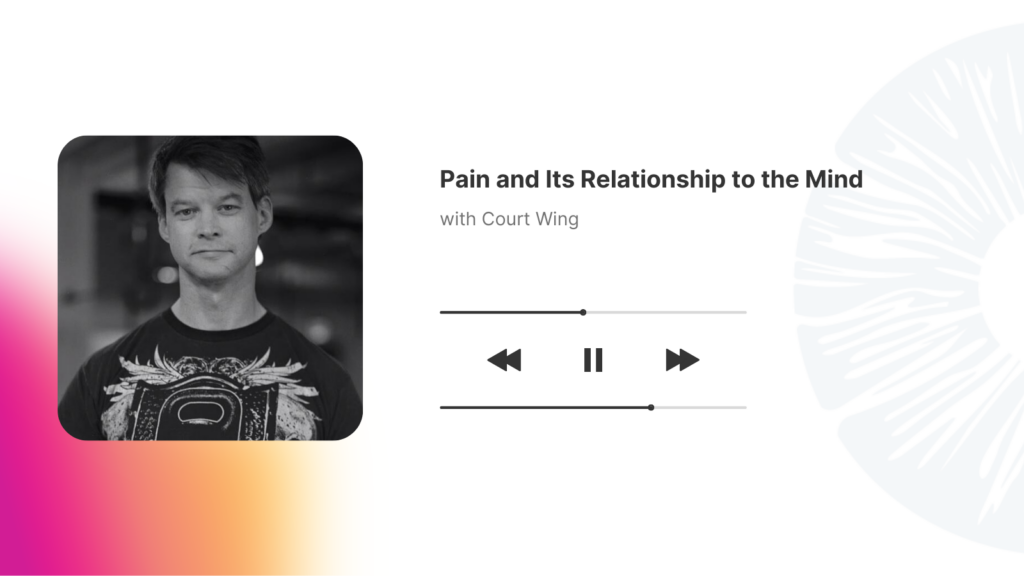
Mirror box therapy is often not enduring though; only being effective for as long as you do it, and that was the case with Albert Lin. It often takes a lot of repetition for it to become “sticky.” Neuroplasticity requires novelty and intensity, usually in the volume of work. But that can be hard to achieve, thus the issue in pain treatment that I had experienced directly as a practitioner and as a patient; everything works, nothing lasts. When it was suggested to Lin that psilocybin had strong neuroplastic properties that could impact cortical reorganization for chronic pain, he tried it a few times, taking a high dose of psilocybin mushrooms, which gave him approximately 3-12 pain-free hours, depending on the dose. But then the pain came back with a vengeance. Within the cluster headache communities, this is known as a “slapback effect” and can actually be a sign that the nervous system is adjusting and more permanent relief could be imminent.
Then, Lin’s wife suggested combining (stacking) mirror box therapy with psilocybin. He went out to the desert with a closet door mirror, and while under high-dose psilocybin, he would stare at the reflected image of his remaining leg and then at the space where his amputated limb had been, while repeating the phrase “You are safe. You are totally safe,” for approximately 45 minutes. This met all the conditions for driving neuroplasticity: novelty, intensity, and volume of work with deep assurance of emotional and physical security. Amazingly, it worked, immediately putting him into remission for the next 20+ hours, with 50% reduced pain for nearly two weeks. He shared his success with the lab, and experiments with different types of visual neuromodulation while under high-dose psilocybin quickly began.
Lin was dealing with a persistent pain in his phantom foot that felt as if a railroad spike was being driven through, suspected to be a sensory remnant from when the bones in his foot were surgically pinned together as they attempted to save it before ultimately deciding to amputate. An artificial foot and a pen with a telescoping pointer was introduced, and they covered the space between his stump and the plastic foot with a blanket, then “pulled” the telescoping pen out of his foot at the site of pain, mimicking the action of removing pins (or really, removing the pain). He felt instant relief.
Another experiment involved a novelty Halloween-store “flame” (bright light with orange and yellow fabric and a fan underneath that makes it flutter). Lin chuckled when he saw it, but when they brought it near his representational foot, he actually felt heat from the “flame,” which was intensely relieving.
Through these experiments and continued work, Lin went into full remission after five weeks, and has been free of chronic pain ever since. It’s worth noting that he had a top research team working with him that was extremely creative in creating novel inputs, and he is known for being an almost Michelangelo-type character, with a high degree of inventiveness and novelty-seeking, allowing him to discover unique, lateral approaches to solve problems. And, it bears repeating: chronic pain is a singular motivational force.
Additionally, post-dosing, cortical reorganization was happening during a psychedelically-induced “critical period reopening”; when the brain has a metaplastic quality that allows it to reset to an almost-new condition. As described in the work by Dr. Gül Dölen, critical period reopening happens during crucial phases of nervous system development in childhood, such as when toddlers can learn multiple languages without an accent or when adolescents are uniquely sensitive to social cues from peer pressure (and/or support), allowing them to quickly adopt different social customs and frameworks. This reopening is also seen post-stroke, when there is a limited window for rehabilitating from brain injury, so this likely applies very well here with chronic pain. We know that veteran groups like the Heroic Hearts Project, VETS (Veterans Exploring Treatment Solutions), and The Mission Within, who are employing psychedelics for treatment, are having striking results both in recovery from combat-induced PTSD as well as traumatic brain injury – typically seen as treatment-resistant conditions.
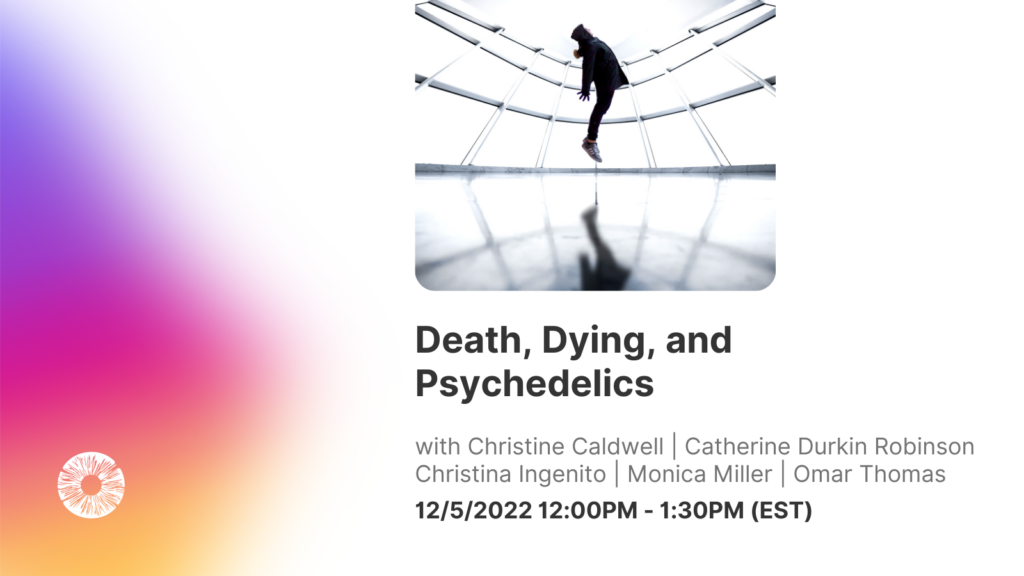
If there’s anything I would like you to understand after reading this article, it’s that:
We don’t have to prove that psychedelics are effective for treating chronic pain; we have to establish that this has already been proven.
Psychedelics are not an instant cure for chronic pain, but they are strong impact boosters for neuroplasticity and can make physiotherapy/neuromodulation become “sticky,” creating enduring relief.
We know that many mechanisms that create psychiatric conditions that are responsive to psychedelic-assisted psychotherapy are extremely similar in nature to the same mechanisms that generate chronic pain; it’s just that psychiatric conditions have gotten far more focus in psychedelics, perhaps because the non-ordinary states of consciousness they are known for producing seem more applicable to conditions more traditionally thought to be related to the mind.
But both arise out of the central nervous system and are rigid, fixed states of cognition and perception. With depression, you have negative outlooks and self-perceptions: “Nothing I do makes a difference,” “People are just saying that to make me feel better,” etc. At one point, these thoughts may have helped you to cope with a traumatic incident, environment, or upbringing, but now they’re maladaptive, weigh you down, are out of step with reality, and have actually caused (or are the result of) structural deficits in the neurology of your brain. It’s the same with chronic pain: when there is an acute injury or even the possibility of one, pain is part of the protective suite of responses from our nervous systems to prevent further injury and allow healing to occur – an alarm bell/action signal to change a behavior. But it can be so overprotective that it gets embedded and cemented with movement, emotions, and surrounding environments long after all tissue healing is done – getting triggered by seemingly innocuous events, maladaptively hardwired into your neurology in a negative loop of conditioned responses.
This is exactly what happened to me when I went through NYU’s psilocybin trial; an adverse financial and work environment, repeated (and under-recovered) musculoskeletal stress/injuries, and (likely) sub-clinical post-concussion syndrome and PTSD, all topped off by the sudden death of a close friend releasing long-suppressed grief and leading to a significant nociplastic output in the form of increasingly treatment-resistant depression and moderate chronic pain. Many recovery efforts were attempted using every modality I knew, but there was too much of a deficit to overcome – until psilocybin was introduced to the mix. That life-changing experience allowed for metaplasticity, cortical reorganization, descending inhibition, and anti-inflammatory properties to take root, giving all post-dosing interventions the opportunity to gain traction and for me to flourish once again.
Future articles in this “Pain and Psychedelics” series will focus on old assumptions vs. new science, additional case studies, the suspected mechanisms of action behind the interaction between psychedelics and pain, and best practices and safety concerns for working with psychedelics to alleviate chronic pain.
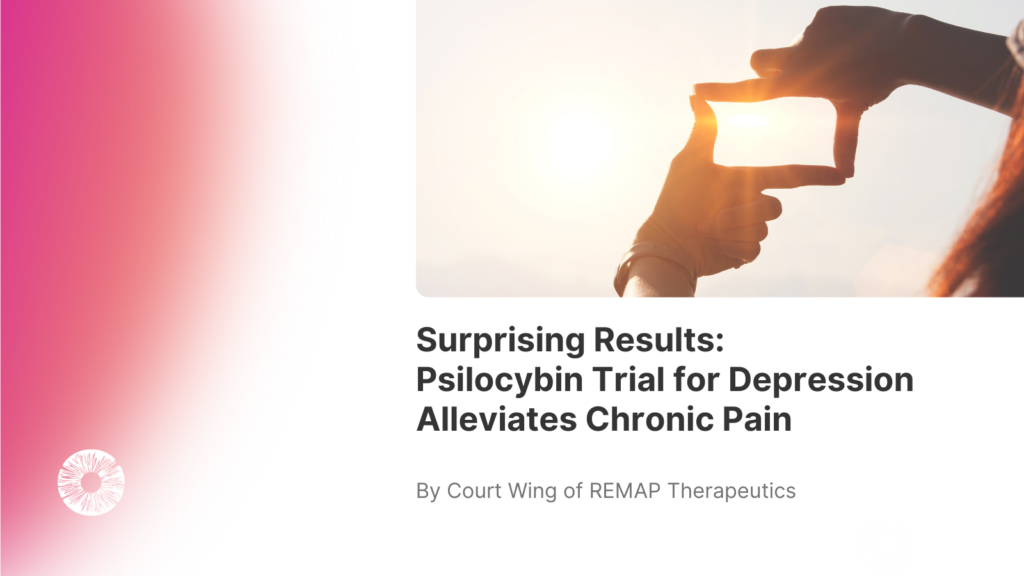
An NYU psilocybin depression study participant discovers an unforeseen application for psychedelics: the treatment of chronic pain. Part 1 of the series: Psychedelics and Chronic Pain.
In the fall of 2020, I was living a pretty successful and happy life – on paper. I had co-founded a very popular, leading-edge CrossFit gym in NYC; one of the first in the world. I held multiple advanced certifications in applied neurophysiology through Z-Health, helping clients with challenging pain and performance issues. As an early adopter of kettlebell training, I became a nationally top-reviewed instructor and trained Team 6 Navy SEALs, astronauts, pro athletes, wounded veterans, and members of the FBI, NYPD, NYFD, and ROTC. I was featured in Men’s Fitness, the NY Times Sunday Routine, and USA Today. I had 30 years in the pain & performance field, training and teaching at a high level, and was becoming widely known for helping people with difficult mobility problems or chronic pain, using unique methods from the leading edge of neurological rehabilitation. On top of all of that, I was 17 years sober.
However, not all that glitters is gold. A now ex-business partner was committing a Ponzi scheme to the tune of millions, and his case followed him like a shadow, turning my life’s passion into an emotionally and financially toxic nightmare that economically devastated my family. My best friend, Kirk MacLeod, who I had completely rehabbed from chemo & cancer surgery, died six months after being declared in remission. My first son had developed undiagnosed GERD and couldn’t sleep more than an hour and half at a time, which meant my wife and I slept even less.
Unsurprisingly, my episodic depression returned after more than a decade and a half, and I was now increasingly treatment-resistant; unresponsive to psychiatric drugs that had previously worked. All my pain neuromodulation interventions that worked on my clients no longer worked for me, and I had developed chronic pain myself.
I share all my background here to demonstrate that I was not under-resourced in either knowledge, networks, or diversity of approaches, practice, or experiences. I poured over all my certification materials looking for anything I had missed, but had fallen into an increasingly deeper recovery hole; everything worked, but nothing lasted. I was hitting a new bottom in my life, deeply sinking into the midst of an increasingly treatment-resistant depression episode that had likely been ongoing for five years.
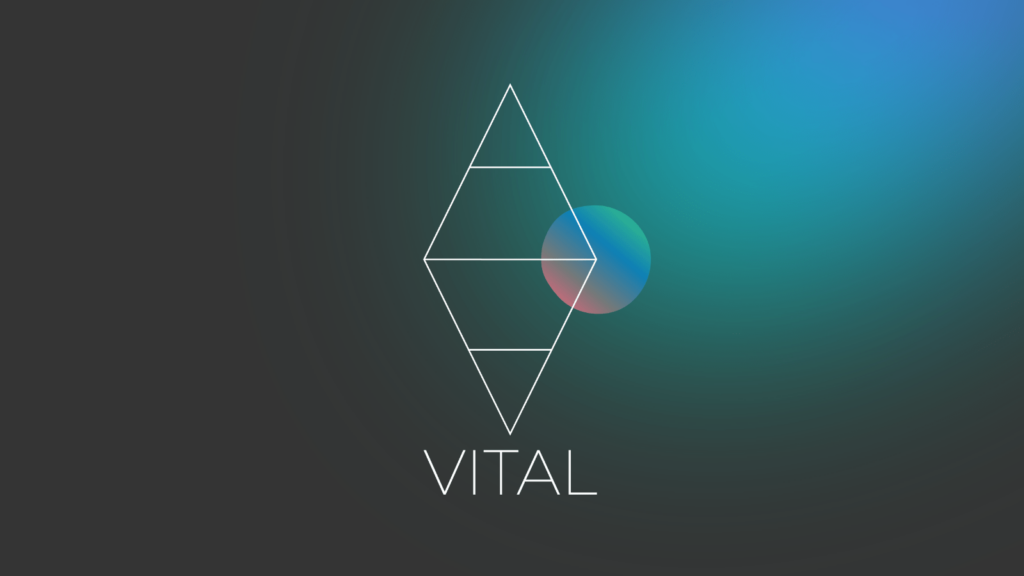
But then I became aware of ongoing studies on psilocybin for depression happening locally in NYC. I had experienced a few high-dose psychedelic sessions nearly a quarter century ago and had been an avid Terence McKenna fan (even speaking with him directly after a lecture in Seattle), but I had never taken psychedelics therapeutically, and my recreational interest had effectively vanished once I became sober from alcohol. Intrigued, I connected with the local clinical research coordinator, Leila Ghazhal, at the NYU for the clinical trial of Psilocybin for Major Depressive Disorder study (sponsored by the Usona Institute), and took all the online and over-the-phone assessments, passing them easily. The primary investigator (PI) on my study was Dr. Stephen Ross, who had been leading psychedelic research at NYU for more than a decade. Amazingly, I made it into the trial within a month and a half, learning that I’d actually beat out 8500 other applicants for just 100 spots nationwide.
When I first entered the trial, I was in a state of denial about how severe my depression was, but once I took the MADRS assessment, there was no avoiding that I had moderate to severe depression with suicidal ideation.
I remember a specific moment very well during this process, when I was finally cleared to enter the study and the study coordinator was speaking with me about the results of my assessment and my upcoming participation. I asked what would happen if I didn’t receive psilocybin during my session, and he reassured me that they would not just drop me off in the middle of the ocean to dog paddle – that there were other interventions and studies available and they would be sure to find me something, but there was a good chance I would receive psilocybin and hopefully get some good results. At this point, my mask cracked a little bit and some protective cynicism came out, and I quipped with a bit of a shrug: “Well, we’ll see.” I hadn’t meant it to be dismissive or sarcastic but it came out that way, and the conversational atmosphere rapidly shifted. He looked right at me and suddenly he wasn’t the primary investigator anymore, lost in the myriad details and logistics of a very involved study. Now he was the deeply experienced clinician and therapist, and, having heard something within the tone of my voice, dropped all the way in and asked softly: “What’s going on behind that, Court?” Suddenly, all the masking dropped and there was no more place to hide because I was so, so tired at this point, and had been waiting for this moment. In and out of therapy for years, dozens if not 100 self-help books, so many modalities, so many somatic systems, and here I was with a chance for something new to help me. When I realized why there was cynicism behind my statement, my voice cracked, I started crying, and I answered him: “Trying not to hope.”
The one glimmer of hope I did have was reading a 2018 paper by lead author Calvin Ly describing psychedelics’ neuroplastic activity in the prefrontal cortex. As someone who had studied the neurology of pain for years, this was revelatory. Many pain conditions are, in fact, nociplastic or noxious conditions arising out of the central nervous system (CNS); there’s no more injury or damage if there ever was, but your CNS is still continuing to put out a maladaptive alarm signal that is perceived as pain. So learning that psilocybin was creating actual structural change within my cortex – not “just” psychological change – was completely astonishing.
My dosing date was on March 5, 2020, and I remember looking down at the capsule sitting in the cup, saying to it: “I really hope that’s you.” I was terrified inwardly that I would receive the placebo, that I wouldn’t respond to the psilocybin, or that it would only work just a little bit, only for its effects to slowly fade. But within half an hour, there was no denying that I had received psilocybin, and I earnestly pursued all the procedures everyone on my care team at NYU had worked with me on for weeks in preparation for this day.
I was genuinely shocked at the sheer volume of psychological material from my childhood and early adulthood that came up. I had profound transpersonal experiences and healing, revisiting instances that were pivotal in my childhood. I had an encounter with the first woman I had ever loved, who had committed suicide three years after we had broken up. Her death had caused a profound grief in me that drove my drinking for a decade after. I thought I had released the majority of my grief around her once I got sober, but clearly, there was so much more to heal that had been deeply suppressed as I tried to move forward with my life.
The biggest shock of all, though, was waiting for me at the end of the day when one of my facilitators casually pitched a seemingly routine question while closely watching me out of the corner of his eye: “So, how do you feel?” Without thinking, I reflexively replied, “Good,” but then, just as reflexively, scanned more deeply inward, and in a sudden rush, realized my depression was completely gone – not just better, but vanquished, exclaiming: “Good! That fast? Are you fucking kidding me, that fast? Is it gone already?”
It felt as if a huge mass had been surgically removed from me or as if an entire continent within my interior was now suddenly revealed. No matter how many times you read the word “remission” and the percentages behind it in scientific studies, very little will prepare you for the shocking reality of it. The contrast between before and after was profound. All of the iterative rumination was gone, and it took no effort for that to happen. And it only seemed to strengthen as the days passed. Miraculously, all suicidal thoughts ceased on that day and never returned.
Shockingly, only ten days after my dosing session, NYC went into a complete pandemic lockdown, my entire industry closed, and my two young boys were now at home with me 24/7, tele-learning. I cannot imagine what 2020 would have been like for me if I had received the placebo. It’s almost unimaginable.
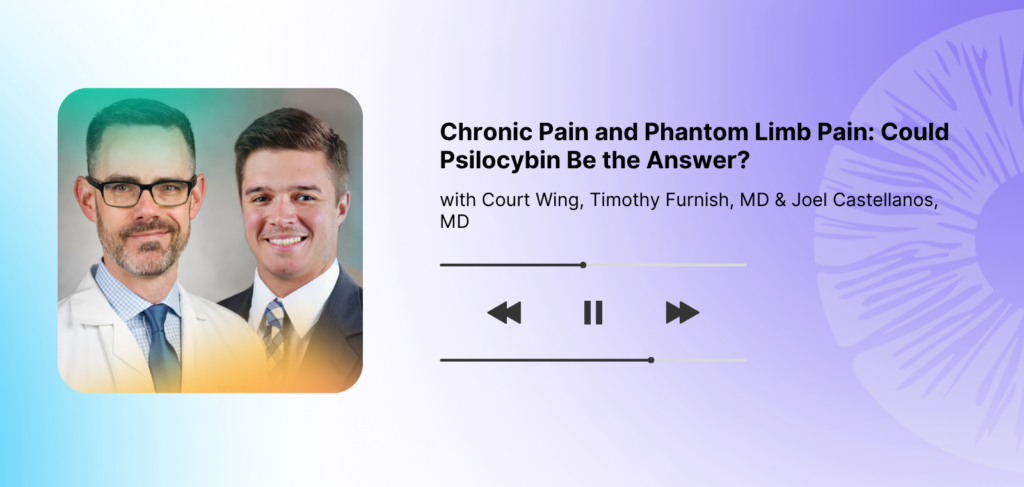
But here is where the story takes an even more profound and impactful turn. During the session, my leg started intensely tremoring/spasming. I had been evaluated for musculoskeletal pain and dysfunction that I had acquired through a host of injuries over the years of my performance career, and in fact, had just been in the doctor’s office a few months earlier trying to determine if I had arthritis or something worse. But right there in the session room, I started having a neurological revision, with my muscles and nerves in my right inner thigh firing in an effort to recalibrate the sensory and motor inputs and outputs in that part of my kinetic chain. It was almost like a self-generated TENS unit (Transdermal Electromagnetic Nerve Stimulation, used to generate muscle contractions and neuromodulate pain signals with micro-electric pulses) getting my leg back online by creating intense motor activity in the muscles of my thigh.
I’ve since spoken with spinal injury survivor Jim Harris and read a case series from UC San Diego’s Psychedelics and Health Research Initiative (PHRI) published in PAIN Journal where the exact same thing occurred to them under the effect of psilocybin with the same positive results, but at the time, the facilitators were concerned enough to ask the primary investigator to come and evaluate me during the session. I had to explain to him, somewhat hilariously as I was going into my peak, that, in fact, the tremors felt intensely good. I’m grateful that he let them continue because it has made all the difference.
While I partially understood what had happened, I was understandably beyond eager to learn more, and to see where else this realization could take me: Why did this work so well? Has our understanding of chronic pain been wrong? And if psychedelics are the answer, what does treating chronic pain with psychedelics actually look like?
This is part 1 of a 2-part piece and part of a larger series on chronic pain and psychedelics. In part 2, I will dive into the research around remapping and mirror box therapy, and why my psychedelic experience seemed to be so effective.
Future articles will focus on: What is pain and what causes chronic pain, old assumptions vs. new science, the suspected mechanisms of action behind the interaction between psychedelics and pain, and best practices and safety concerns for working with psychedelics to alleviate chronic pain.
In this Veteran’s Day episode, Joe checks in with two members of the Heroic Hearts Project: Founder and President, Jesse Gould, and Chief of Operations, Zach Riggle.
Heroic Hearts’ mission is to create a healing community that helps veterans suffering from military trauma recover and thrive through helping them gain access to psychedelic treatments, professional coaching, and ongoing peer support – and we’re always happy to have them on the podcast to remind listeners about the extremely important work they do.
Among other projects, they are currently running several studies: psilocybin for gold star wives (spouses of fallen soldiers), ayahuasca for combat veterans, and ibogaine for special operations veterans through the University of Texas at Austin Dell Medical School’s Center for Psychedelic Research & Therapy; a study with the University of Georgia on personality change through psychedelics; a gut microbiome study with University of Colorado Boulder; and a psilocybin for head trauma study through Imperial College London. And today, they released the short film, “It’s Time – A Documentary of Veterans and Pro Athletes Seeking Healing Through Psychedelics.”
Gould and Riggle discuss the growth in interest and acceptance in psychedelics they’ve seen over the last few years; the importance of people telling their stories; relative trauma and how people too often wait to seek help; how trauma isn’t always due to a single event; Colorado’s Proposition 122 (which passed!); the need to have standard measurements in psychedelic studies; and how people who go through trauma together can heal together.
“At what point do we ask for help? I think, just as a society, we feel like things have to be in full-on crisis before we need to seek some sort of assistance. And we want to put [it] out there that that doesn’t have to be the case – that if you’re able to look at your life and realize that there may be some areas where things could improve and you might need some help in improving them, then don’t be afraid to reach out, because we’re not going to turn you away.” -Zach
“In the standard medical world, the physicians [or] the psychologists are looking at that qualifying incident and trying to heal that, trying to address that. And there’s some things that are pretty effective …but they’re working largely on that single incident, and ignoring all the other things that may have happened over time. And that’s where psychedelics can be so beneficial, is that they address that whole issue with a full system reset.” -Zach
“You take a population that largely (due to their illness) has been isolating, pushing everyone away, and just sitting back and looking at how amazing everyone else’s life is while theirs continues to deteriorate. Well, we plug them back into a community, bring them in, and help them to heal together. That’s a powerful thing to realize: that communities that were traumatized together; they heal better together.” -Zach
Heroic Hearts Project – Canada
Psychedelics Today: PTSF77 – Progress and Context, with Jesse Gould of the Heroic Hearts Project
Jesse Gould and Keith Abraham – Heroic Hearts Project: Connecting Veterans to Psychedelic Treatment
Menshealth.com: This Veteran Is Helping Other Soldiers Restore Their Mental Health
University of Texas at Austin Dell Medical School: Center for Psychedelic Research & Therapy
Psychedelichealth.co.uk: Heroic Hearts to research psilocybin treatment for brain injury in veterans
Justice.gov: uBiome Co-Founders Charged With Federal Securities, Health Care Fraud Conspiracies
Psychedelics Today: PT223 – Daniel Carcillo – Life After Sports
Marijuanamoment.net: Colorado Voters Approve Psychedelics Legalization Ballot Initiative
In this episode, Joe invites Court Wing to co-host, interviewing two members of UC San Diego’s Psychedelics and Health Research Initiative (PHRI): Joel Castellanos, MD (Associate Medical Director of PHRI and board-certified physical medicine and rehabilitation and pain medicine physician), and Timothy Furnish, MD (Medical Director of PHRI and Associate Clinical Professor of Anesthesiology and Pain Medicine).
As one of the early participants of a psilocybin-for-depression trial in NYC, Court Wing (of REMAP Therapeutics) discovered that immediately after the session, his chronic pain had miraculously gone away. He began researching how psychedelics could be used (with or without other therapies) to continue the alleviation of pain psychedelics had brought him. Through the Psychedelics and Health Research Initiative, Drs. Castellanos and Furnish are following that that same road, and are currently recruiting for a randomized controlled trial on psilocybin for phantom limb pain.
They talk about the relationship between the mind and chronic pain: how people confuse pain with the simple act of nerves firing, but how it’s so much more. And they discuss how pain can become part of one’s identity (and how the Default Mode Network could be contributing); how physical therapy is related to neuroplasticity; mirror box therapy; microdosing for chronic pain; the unusual nature of phantom limb pain; and where the mystical psychedelic experience may come into play. If this topic is as fascinating to you as it is to us, stay tuned – we will be featuring much more on chronic pain and psychedelics, including a blog series from Court Wing coming soon.
“One of the things that may be unique about or interesting about chronic pain is that the longer it goes on, the more people start seeing pain as a part of their identity and that Default Mode Network is probably playing a role in that. And it’s possible that something like psychedelics could open up the possibility of changing that internal story so that pain is no longer so much a part of one’s identity.” -Tim
“I think that people oftentimes confuse pain with simply nerves firing. …[But] there is this rich interplay between the way we think about pain, the way we perceive pain, and how we feel about it.” -Tim
“When you’re not really dealing with chronic or severe pain on a daily basis, it’s really hard to think about how life-changing that is or can be.” -Joel
“When we hear things like ‘It’s only just in your head,’ I don’t think people quite get [that] the head can be a scary place to be trapped sometimes.” -Court
PHRI.ucsd.edu: Psychedelics and Health Research Initiative at UC San Diego
Psychedelics Today: Court Wing – Pain and Its Relationship to the Mind
Pubmed: Chronic pain and psychedelics: a review and proposed mechanism of action
Sciencedirect.com: Mirror Visual Feedback Therapy. A Practical Approach
Psychologytoday.com: Catastrophizing
Physio-pedia.com: Kinesiophobia
Sinobiological.com: What is tumor necrosis factor (TNF)
Neuropathycure.org: Cryoneurolysis: A Freezing Cold Way To Treat Chronic Nerve Pain
Journals.lww.com: Microdosing psilocybin for chronic pain: a case series
Healthgrades.com: Diagnosing and Treating Anhedonia: Loss of Pleasure Explained
In this episode, Joe interviews the Co-Founders of Tesselate Therapeutics: Dr. Rochelle Hines, Ph.D. (also the CEO and an Associate Professor at UNLV), and Dr. Dustin Hines, Ph.D. (the CSO as well as an Assistant Professor at UNLV).
While Tesselate’s primary objective is the development of novel psychedelic molecules, the Hines’ work goes much deeper than that, as they are researching the ways the brain communicates with itself and other parts of the body: how neurotransmitter systems interact, why synaptic partners find each other, and how certain substances may be able to modulate the actions of specific receptors. They are exclusively studying phenethylamines and using EEG to isolate signatures that could help predict the outcome of a therapy session. Additionally, they’re attempting to build a “tripnogram,” modeled after the hypnogram that explains the stages of sleep.
They talk about the reductionist base of neuroscience; the biodiversity in human populations and how heterogeneous depression can be; the reliability of the head twitch model; the structure of the cerebral cortex; neuroplasticity; the price of bringing new drugs to the FDA and the strategy of “failing fast,” and much more. You’ll likely learn a lot from this one, especially if terms like polypharmacy, laminar, ocular dominance columns, synaptic pruning, and “psychedelicitivity” (thanks for that one, Joe!) are new to you.
“I’m really fascinated by these connections that cells form with one another in the brain. And I’m really fascinated by how they form these partnerships so reliably, and all the right equipment gets there. And generally under typical conditions, we have this really high fidelity system so that [a] neurotransmitter gets released, and the right receptors are there to receive it, and the signal gets passed on. That always struck me as just this incredibly cosmic process. How do we make it right all the time, hundreds of thousands of times during development?” -Rochelle
“The average drug that gets into the clinic costs about 3 billion. And most of that cost is racked up from failures that get pushed along, pushed along, make it into clinical, a lot of money goes into them, and then they ultimately fail. So I think a big strategy now is to see how quickly you can get something to fail, because then you’ll save yourself some time and money in the long run.” -Rochelle
“If you want the answer, you should listen to everyone. You should be [a] skeptic, but you should listen to everyone.”-Dustin
“I’m not at the stage where I think this is our last hope; I think there’s other hopes. But I see a revolution here. I really do, because it’s impacting the basic science that we’re doing also. People need this. People deserve it.” -Dustin
TSL8.ai: Tesselate Therapeutics
UNLV.edu: Rochelle Hines, Ph.D.
MIT.edu: Why it’s a problem that pulse oximeters don’t work as well on patients of color
Sciencedirect.com: Head-Twitch Response
Wikipedia.org: Ocular dominance column
Encyclopedia.com: Illness And Sick-Role Behavior
Lucid.news: Journey Colab Looks to Mescaline for Treating Alcohol Use Disorder
Could a nation defined by inflammation find relief in psychedelics?
It’s a verifiable truth that the United States of America may be considered a global leader, especially when it comes to the prevalence of mental and physical health disorders. In fact, of the nearly 330 million people in the population, millions to hundreds of millions of Americans suffer from chronic conditions like:
These sobering statistics beg the questions: How could a single nation of relatively modest size be home to such a vast selection of chronic diseases? And how could psychedelics be used to combat these conditions affecting so much of the population?
The answer begins with key lifestyle factors such as diet, exercise, tobacco use, or genetic predispositions, each of which contribute to the pathology of a given disease. For example, a 2010 study by the American Cancer Association found that 90% of Americans don’t meet their daily recommended requirement of vegetables, with 75% failing to eat even a single piece of fruit during an average day.
The American diet overall is egregiously devoid of whole grains, beans, fruits, vegetables, and nuts, with the US Department of Agriculture estimating they represent a mere 11% of the populous’ typical daily food intake. Despite this lack of prevalence, these unprocessed natural foods are otherwise rich in medicinal phytochemicals found to support the immune system and strengthen the body’s resistance to infections, as well as fight cancer and diabetes; diseases that are twice as prevalent in the US relative to the global average. Shockingly, the US also leads the world in obesity rates by nearly 400%, and is first in global consumption of sugar, outranking Germany by about 26% yearly.

Although diet quality is proven to significantly impact the likelihood of disease development, what Americans eat is only one contributing factor among many. Poor diet alone doesn’t explain the exceptional amount of chronic health conditions seen in the population. In fact, it’s estimated that over 60% of Americans suffer from at least one chronic health condition, 42% of the population are diagnosed with at least two, and up to 12% of Americans live with five or more chronic diseases.
To put those percentages in perspective, the 2020 election saw the highest voter turnout in 120 years, with the most votes for a single presidential candidate ever recorded in American history. Joe Biden reportedly received over 81 million popular votes, representing less than half of the 198 million Americans suffering from at least one chronic health condition, and only marginally more than half of the 139 million with at least two.
Despite the fact that they’re by no means a minority in the population, chronic diseases are found to disproportionately affect socioeconomic minorities in the United States of America and beyond. A recent study published in the journal, “Archives of Public Health,” used 20 years (1995-2015) of empirical data from the Organization for Economic Cooperation and Development (OECD) to investigate the impact of education on health across the populations of 26 countries, including the United States, Canada, United Kingdom, France, Germany, and other founding nations that became members when OECD was created in 1960. This data, taken from millions of people in numerous countries across the globe over one fifth of a century, clearly demonstrated that higher educational attainment in adults positively correlates with longer lifespans, better health outcomes, increased Gross Domestic Product (GDP) per capita, and reduced infant mortality rates.
Put simply, the OECD data suggests that highly educated adults with ample finances generally live up to 12% longer (8-10 years), enjoy healthier lives, make more money, and are less likely to die at birth or of cancer, when directly compared to individuals of lower socioeconomic status (SES). Unsurprisingly, adults with higher GDP per capita also spent more money on healthcare and education over their lifetime, with college and university education found to positively influence life expectancy, child vaccination, and enrollment of children in education, as well as negatively impact infant mortality. Taken as a whole, the OECD data demonstrates an essential principle:
If appropriate education and adequate income significantly increase life expectancy, then access to quality schooling, sustainable employment, and equitable socioeconomic mobility are inherent to health care services.
However, even if we factor in education and employment as essential contributors to health, the fact remains that as of 2021, over 85 million Americans older than 25 had attained a Bachelor’s Degree or higher, and US unemployment was a mere 3.7% in August 2022. Since neither education nor employment are able to fully reconcile the disproportionately large number of Americans currently suffering from chronic health conditions, there must be a deeper underlying cause contributing to the pathology of diseases reportedly observed in the country’s citizens and resident aliens.

Compellingly, inflammation has been identified as a central contributor to all aforementioned chronic health conditions and beyond, and is implicated in over 60% of all human deaths around the globe. Some may already be familiar with acute inflammation in the form of localized pain, redness and swelling, usually in response to an injury or infection. Acute inflammation is typically a normal immune response during which the immune system is activated through the release of specific proteins, essentially called inflammatory markers. These markers then act as beacons to recruit immune cells, which subsequently migrate to the particular body part(s) in need of defense or repair.
In contrast, chronic inflammation is less apparent and far less immediate, but has insidiously dire consequences when left unchecked. Instead of causing localized pain or swelling, chronic inflammation causes systemic issues with immune cell signaling through excess “noise” created by high levels of inflammatory markers. Rather than being recruited to areas of the body most in need of healing, immune cells are drowned in an overwhelming number of biochemical beacons and ultimately disoriented. By disrupting this essential communication between immune cells, chronic inflammation prevents the appropriate direction of immune cells to critical issues needing attention, and may instead direct disproportionate amounts of immune activity to arbitrary areas – thus crippling the body’s capacity to effectively heal itself or prevent systemic disease.
The dysregulation of the immune system may ultimately induce the development of one or a combination of diseases, including autoimmune disorders like Crohn’s Disease, IBS, Alzheimer’s, arthritis, and diabetes, as well as various cancers and neurological disorders. Furthermore, children of mothers with chronic inflammatory conditions are demonstratively more likely to be diagnosed with ADHD, anxiety, depression, obsessive compulsive disorder (OCD) and autism, especially when chronic prenatal exposure to maternal inflammatory markers is exacerbated by psychological or physiological stress.

Over the past 20 years, a growing body of research has further investigated the complex relationship between chronic inflammation, various mental and physical diseases, and socioeconomic status (SES). High levels of inflammation measured by markers in the blood of low SES patients were found to prospectively predict whether they would suffer from depression, heart disease, ischemic stroke, and/or mortality.
Furthermore, factors such as poverty, lack of social or educational resources, obesity, and diets rich in refined sugar were all closely associated with increased inflammatory markers, chronic diseases, and mortality rates. Stress derived from socio-political, financial, environmental (chemical, biological, electromagnetic), or psychosocial (relationship experiences, trauma, social conditioning) aspects of a patient’s life also reportedly influenced inflammation, with chronic psychological and emotional stress inducing a significant increase in observed blood inflammatory markers; thus promoting immune dysfunction and ultimately increasing the likelihood of chronic diseases in individuals of low SES.
Despite these undeniable correlations and profound implications, the medical model of inflammation as the root of disease is not a new concept. Whether willow bark or aspirin, both traditional Ayurvedic and modern Western medicine employ preparations of anti-inflammatory drugs to treat a number of maladies, from headaches to heart disease. In fact, many over-the-counter (OTC) medications, commonly prescribed pharmaceuticals, and even psychedelic drugs owe some portion of their medicinal benefits to anti-inflammatory effects exerted in particular tissues of the human body.
For example, recent research has revealed that two of the most commonly prescribed classes of antidepressants, Selective Serotonin Reuptake Inhibitors (SSRIs) and Selective Norepinephrine Reuptake Inhibitors (SNRIs), may instead induce their expected medical effect via anti-inflammatory action within the brain itself, thus alleviating underlying neuroinflammation implicated as a central contributor to malaise, fatigue, brain fog, emotional reactivity, and other psychological symptoms. This revelation casts significant doubt on the broadly accepted model for the pathology of depression that classically purports serotonin deficiency as the primary cause. Today, a new breed of antidepressants specifically intended as anti-inflammatory drugs are undergoing feverish development by major drug corporations.
But before we herald these pharmaceutical innovations as the ultimate solution to tame the treachery of chronic neuroinflammatory disease, we must address the unjust marginalization and criminal victimization of disaffected Americans self-medicating via naturopathic means. Notwithstanding their evolutionary, anthropological, and social significance, the potent anti-inflammatory effects of cannabis, psilocybin mushrooms, and other psychedelic derivatives are now well-supported by an ever-growing body of recent scientific research. Although prohibitionist laws previously precluded a thorough investigation of their potential, the US has slowly and begrudgingly allowed the pursuit of psychedelic pharmacological power. As the barriers of outdated, impermissible, and fallacious legislative paradigms fall, clinicians are finally gaining critical insights that have enabled the development of novel pharmaceutical psychedelic derivatives with extreme precision; such that specific medical characteristics like an anti-inflammatory effect or psychedelic effect may be intentionally targeted and enhanced or diminished.
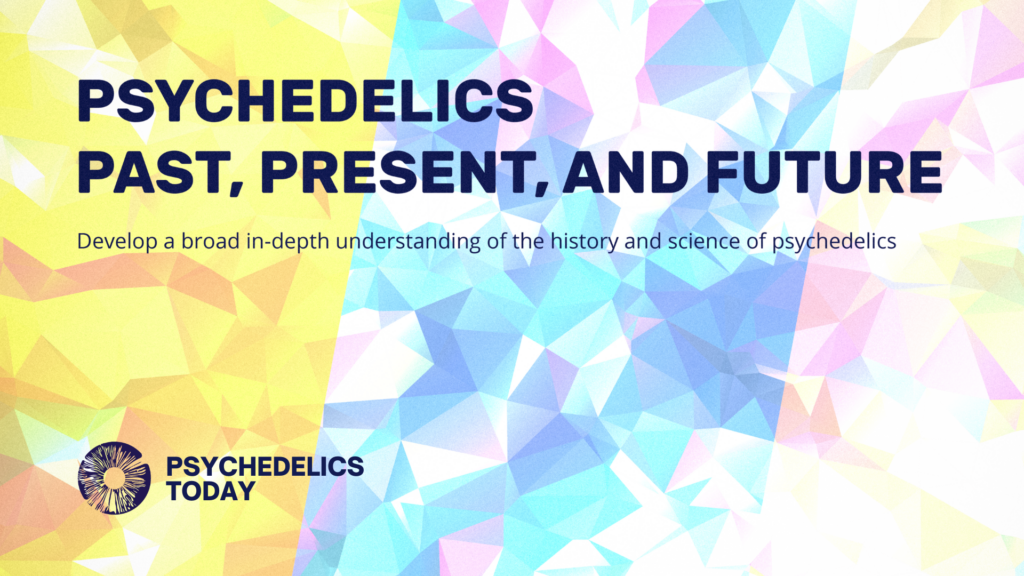
However new this scientific perspective may seem, medicinal preparations of psychedelics have reportedly been used for centuries, and even pharmaceuticals investigated and approved for clinical use decades ago were arguably directly modeled after psychedelics like LSD and psilocybin. Most notable of these compounds, Methergine (methylergometrine), is an LSD derivative used to induce contractions during childbirth since 1582, and is currently included on the World Health Organization’s (WHO) List of Essential Medicines. A similarly indispensable class of pharmaceutical psychedelic derivatives, the triptans, were first developed and patented in 1991 to treat migraines and cluster headaches, conditions which are both implicated to be caused by neuroinflammation. Interestingly, early triptans display remarkable structural similarities to tryptamine psychedelics like DMT and psilocybin.
Further progress spearheaded by brave and dutiful psychonauts in professional practice, underground social circles, and beyond has steadily illuminated the psychological and pharmacological nuances of many psychedelic drugs, revealing that they’re in fact highly safe and effective treatments for Post-Traumatic Stress Disorder (PTSD), suicidality, depression, anxiety, addiction, Fibromyalgia, various chronic inflammatory diseases, and more. Tireless efforts across decades of clinical trials using psychedelics such as cannabinoids, MDMA, ketamine, and psilocybin have paved the way to their current or imminent approval by the US Food and Drug Administration (FDA).
It finally seems quite possible that psychedelic medicines previously incorrectly admonished as “psychomimetic drugs” that imitated psychosis, damaged DNA, and were toxic to the human body may soon be available as legitimate pharmaceutical compounds aiming to alleviate the suffering of millions. With the current medical and legal trajectories, it’s highly likely that sometime in the not-so-distant future, inflamed Americans in need of psychedelic therapies will be able to access them without the unnecessarily harmful (but now still-looming) threat of social, criminal, and civil persecution. As much as one author celebrates this opportunity for a modicum of much needed progress in the United States, a single question remains:
Do a handful of state-level decriminalization initiatives for some select drugs, as well as the monetization and regulation of a limited number of pharmaceutical psychedelics at the federal level truly represent a sufficiently compassionate and broad solution to remedy the innumerable and egregious offenses against American life, liberty, and the pursuit of happiness committed by the war on drugs?
In this episode, recorded in-person at the recent From Research to Reality summit, David interviews one of the more well-known figures in the psychedelic space (who somehow hasn’t been on the show yet), David Nutt: Psychiatrist, Founder and Chief Scientific Officer at Drug Science, Chief Research Officer at Awakn Life Sciences, and Edmund J. Safra Professor of Neuropsychopharmacology in the Division of Brain Science, Dept of Medicine, Imperial College London.
At Awakn Life Sciences, amongst other projects, Nutt is working to set up clinics for legal psychedelic therapy (so just ketamine for now), and, after a successful study on MDMA in the treatment of alcohol use disorder, he’s doing something nobody has really done before in seeing if improvements can be made to MDMA. He tells the story of when he was fired as chair of the Advisory Council on the Misuse of Drugs due to telling the truth about the differences in harm between alcohol, tobacco, and “bad” drugs like LSD and cocaine, which led to the birth of Drug Science (and embracing the truth about drugs even more).
He covers a lot of ground in this episode: how serotonin seems to affect the default mode network; glutamate, cortexes, and the flexibility in the human brain; Robin Carhart-Harris’ “Trial of Psilocybin versus Escitalopram for Depression” study and the realization that psychedelics were doing something different in the brain; Measure 109 and the importance of how Oregon establishes a new paradigm around legal mushrooms; drug hysteria in the US and UK and how drastically that differs from Portugal’s incredibly successful approach to drugs; why real world evidence is the core of science; and why psychedelics seem best at disrupting internalizing disorders.
“The reality is that the psychedelic impact on depression has been so powerful, it’s changed the whole narrative about how we think about depression. Our one study in [treatment]-resistant depression spawned 40 companies now [that] are working on psilocybin for depression, which is amazing. …It’s been a spark to this amazing expansion. Why? Because for the last 40 years, there’s not been any innovation in terms of mechanisms in treating depression, ever. All the drugs we have today are essentially safer derivatives of the drugs we invented in the 1950s. So this is a new approach, and that’s really, really exciting.”
“We’ve got to get our politicians, our policymakers to admit that these drugs should never, ever have been put in Schedule I. They were put in Schedule I [because] we said they were ‘very harmful’ (which they’re not), and they have no medical value (which they do), and it’s actually immoral now, reprehensible that politicians could not see that.”
“They just said, ‘Let’s try a different approach. Let’s try decriminalization and let’s treat drug addicts as human beings and help them get off the addiction rather than put them in prison.’ And that’s been one of the greatest success stories in the history of drug interventions. In the 15 years we have data since the Portuguese experiment was instigated, the Portuguese have reduced opiate deaths to one third of what they were before. In the same 15 years in Britain, using prohibitionist policies, we’ve doubled our deaths from opiates. And that, frankly, is an insult to humanity that we’ve pursued policies which we know are actually killing people.”
“Real world evidence is the core of medicine.”
New England Journal of Medicine: Trial of Psilocybin versus Escitalopram for Depression
Pubmed: Psilocybin for treatment-resistant depression: fMRI-measured brain mechanisms
Parea.science: Psychedelics Access and Research European Alliance
Nature.com: Sacked science adviser speaks out
BBC.com: Alcohol ‘more harmful than heroin’ says Prof David Nutt (with drug harm scale)
EJI.org: Nixon Adviser Admits War on Drugs Was Designed to Criminalize Black People
NPR.org: New York City allows the nation’s 1st supervised consumption sites for illegal drugs
NYTimes.com: How a Man With a Van Is Challenging U.K. Drug Policy
The Drug Science Podcast: #32 – Drug Consumption Rooms, with Peter Krykant
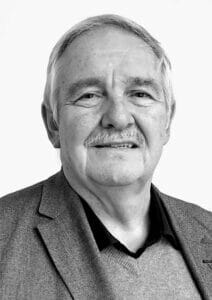
He is currently the President of the European Brain Council and Founding Chair of Drug Science. Previously he has been president of the British Association of Psychopharmacology, the British Neuroscience Association, and the European College of Neuropsychopharmacology. He broadcasts widely to the general public both on radio and television. In 2010, The Times Eureka science magazine voted him one of the 100 most important figures in British Science, and the only psychiatrist in the list. In 2013, he was awarded the John Maddox Prize from Nature/Sense about Science for standing up for science.
Socials:
Twitter: David Nutt / Drug Science / Awakn Life Sciences



In this episode, Joe interviews Miriam Volat, MS and T. Cody Swift, MFT; Co-Directors of The Riverstyx Foundation: a charitable organization focused on funding psychedelic research and ensuring integrity and reciprocity in the psychedelic space.
Volat and Swift cover a ton of ground in this conversation; from philanthropy, research, and the hurdles of funding in the psychedelic space, to the unintended consequences of the quest for holistic healing (e.g.: iboga & peyote over-harvesting), to plant medicine biocultures and the Good Friday Experiment, to changing our relationship with waste with green funerals. They discuss psilocybin’s ability to ease distress related to cancer and death, toad conservation efforts by the Yaqui; the true sacredness of peyote amongst Native Americans, and Indigenous-led structures for future biotechnology companies.
They talk about the ever-present reality (and ripple effect) of the decimation of the Native American way of life, and break down the critical considerations for the survival of Indigenous culture; looking at the Nagoya Protocol and how sustainable harvesting structures, better relationships with the land and surrounding communities, benefit-sharing, and, most importantly, partnerships with Indigenous leaders can help to ensure a culturally respectful and informed future for the psychedelic field.
“Sometimes in the psychedelic space, people are just focused on this organism or brew or something, and that’s the focus. But really, for thousands of years, those things aren’t separated from a way of life or a cultural container that guides many things through a territory, through language. So that’s why we’re really using that term, ‘bioculture,’ so as not to dissect these things into little parts that are actually very interconnected.” -Miriam
“If we arrive in a psychedelic future 20, 30, 50 years from now and we haven’t done our work to empower those communities to survive and stay strong and stay rooted in their own traditions, we’ll be at the same place of not knowing where we came from: What were the original ways of holding these medicines? What were the original songs? What were the original protocols? And once again, [that] will have been lost. And that’s not healing, that’s more disconnection.” -Cody
“White cultures, especially on the West coast; we’re blessed with …so many amazing medicines from MDMA and LSD and ayahuasca and 2C-B, and all the 2Cs, and 5-MeO, and just– it’s incredible. And the Native American communities have, at least in this country, they have peyote. They do not regard it [as] a psychedelic. This is a sacred, sacred plant medicine. And they have no interest (from all the leadership that we’ve talked to); absolutely no interest [in other drugs]. It would be a sacrilege to consider the other pathways. All they have is Peyote. We really need to keep that in mind.” -Cody
ICPCI.life: Indigenous Peyote Conservation Initiative
IMC.fund: Indigenous Medicine Conservation Fund
Psychedelicreview.com: Carey Turnbull
Psychedelicreview.com: William Linton
Wikipedia.org: Good Friday Experiment
ICEERS.org: International Center for Ethnobotanical Education, Research, and Service
UMIYAC: Union of Indigenous Yagé Medics of the Colombian Amazon
Wikipedia.org: American Indian Religious Freedom Act
This Is Your Mind on Plants, by Michael Pollan
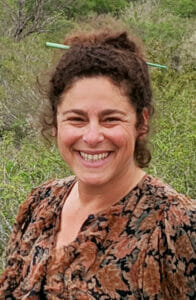




In this episode of the podcast, Joe interviews the CEO of Mindset Pharma, James Lanthier.
Mindset Pharma is a 3-year old biotechnology company built on discovering and developing new psychedelic compounds to be used as medicine for a variety of indications. While the efficacy of the psychedelics we know can’t be denied, the goal of science is to improve, and Lanthier believes optimizing these drugs will make them safer, more predictable, and more palatable for a far greater portion of the population. He envisions these new molecules leading to a future of highly personalized medicine, where people who would never eat a mushroom would likely take a related drug prescribed by their doctor.
Lanthier discusses what’s going on at Mindset Pharma; why patents alone will not be sufficient protection from competition; the long game of biotech, psychedelic stocks, and overreaction to slow growth; the Nagoya protocol; mescaline; the need for big pharma and capitalism; the art of formulation; and how microdosing could soon be revolutionized.
“I had some fairly well-known psychedelic investors say to me, ‘You’re just building a better mousetrap.’ And my reaction was: ‘Well, that’s the march of science. That’s what science is trying to do.’ Take the example of what the German scientist [Felix Hoffman] did in the nineteenth century to go from the bark of the willow tree, eventually going through a whole bunch of intermediate chemical steps to eventually get to Aspirin. Science hopefully tries to make things better, and that’s what we’re trying to do.”
“Big pharma has skipped right past psilocybin. Why? In my view, it would be because of the lack of strong IP rights. They’ve gone right to second and third generation drugs because they’ve made the assessment that even if you own the strongest IP in the psilocybin space, you’re still quite exposed, ultimately, to competition.”
“I think if there’s a future where you have relatively low-priced classic drugs potentially available alongside more optimized, specific drugs that have the full support of the medical community, that would be a great place to get to, I think – really great place to get to. And I think we only really get there with the machinery of capitalism moving forward.”
Otsuka-us.com (Otsuka Pharmaceutical)
Sciencehistory.org: Felix Hoffman
Protests for Right to Try (sent to us by Kathryn Tucker)
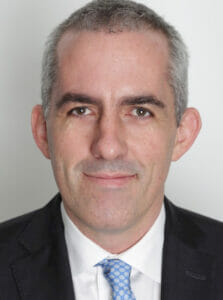
Socials: Linkedin



In this episode, Joe interviews Co-Founder and CEO of Sensorium Therapeutics, Dick Simon.
Sensorium Therapeutics was created by professionals from Massachusetts General Hospital who started to wonder: With so many plants with rich, ethnobotanical history, what if we looked to those plants for answers instead of just analyzing the trendy psychedelics so many are focused on now? Why not fully research what already has established efficacy? Their goal is to have the largest collection of psychoactive plants (which they’re calling their Neuro-Natural Library), and use machine learning to figure out exactly which molecules are doing what, to then synthesize new drugs that are safe and effective; eventually bringing these new compounds through the FDA approval process.
Simon talks about how so much of what we know to be effective and beneficial is based on assumptions or best guesses, and while that doesn’t discredit very real benefits, it does beg the question: Is this all optimized as best as it could be?
He also discusses how recent advances in neuroscience and technology are catalyzing molecular research; how we can learn about other mental health indications from studying rumination; the benefits and challenges of nutraceuticals; geopolitical conflict resolution; organoids; the necessity of the FDA; why “them” can be a very dangerous word; the challenges of benzodiazepines; Burning Man; and the problem with people needing to be treatment-resistant or seriously ill to gain access to psychedelics. He hopes that what Sensorium Therapeutics learns over the coming years will help bring better medicines to more people.
“The goal here is to look at the 500+ plants and fungi and what their component elements are (what’s actually driving that efficacy, or signals of efficacy; signals that they make a difference in a high throughput way), to really assemble massive data. Then, we’re using machine learning to distill all that down to: ‘Alright, we have all this cool information; what does it mean? What does it tell us? And how do we convert that into a drug that helps people?’”
“We operate under a lot of assumptions that are based on experience, but are not based on any controls on the experience. Even something basic like the assumption [that] music and playlists are really important – they’ve been used and they seem to work. We don’t really know if that’s true. …I’m not saying that music and a controlled playlist isn’t absolutely the best answer, but it seems like it’s something we really ought to know an answer to, rather than make assumptions.”
“If I would have told someone ten years ago: “No, no, we’re going to have this company, Sensorium, and it is going to be able to, in a 384-well plate, take a look at groups of neurons growing, and we’ll have sophisticated microscopy to take a look at it, and we’ll be able to do it at a high throughput basis, and we can reliably do it and replicate,’ the question would have been: ‘Alright, what other drugs are you taking? That’s not going to [happen].’ [But] we’re there.”
“Even questions as to how important the psychedelic effect is to efficacy; the assumption tends to be that somehow or another, the intensity of the experience is related to the efficacy. …There are people now who are looking at: ‘What if you removed the psychedelic effect from psychedelics? Are you still getting the same neuroplasticity, neurogenesis, and much of the effect?’ I don’t know the answer, but I think those that are ideologues on either side of that [are] silly. Let’s figure it out. …Why don’t we find the answer rather than argue for whatever our position is?”
Massachusetts General Hospital Center for the Neuroscience of Psychedelics
Psychedelics Today: PT245 – Robin Carhart-Harris – Psychedelics, Entropy, and Plasticity
The Nagoya Protocol on Access and Benefit-Sharing
Dick Simon Ted Talk: ”The Most Dangerous Four Letter Word: Them”
An Intellectual History of Psychology, by Daniel N. Robinson
Bostonpsychedelicresearchgroup.com

Socials: Instagram / Twitter / Facebook / Linkedin



In this episode, David interviews one of the biggest names in psychedelics and someone we haven’t had on the show until now; Founder and Executive Director of the Multidisciplinary Association for Psychedelic Studies (MAPS), Rick Doblin, Ph.D.
MAPS has recently been at the center of media scrutiny, notably through the New York magazine‘s “Cover Story” podcast series, which chronicled instances of alleged sexual abuse within the MAPS clinical MDMA trials. Since reporting on this issue has largely called into question the design of MAPS’ clinical trials, data reporting, quality control, and claims around the efficacy of MDMA in the treatment of PTSD, we wanted to provide an opportunity for Doblin to respond to these very real concerns – and he does just that.
He discusses how MAPS reacted, what could have been done better, what it has all meant for the non-profit, and how it feels to now be considered the enemy by many in a space MAPS helped build. He addresses the concerns of sessions ending too soon (highlighting how that may suggest a desire for additional therapy) and asks anyone who has participated in a MAPS trial to complete a long-term follow-up survey so the organization can improve their process and ensure their data is as accurate and robust as possible.
He also discusses what the post-approval psychedelic landscape could look like; their goals for facilitator training and how they align with requirements in Oregon; their desire for a patient registry or “global trauma index”; and the importance of collecting and analyzing real-world evidence. And he talks about MAPS and their globalization goals: how exploring psychedelic therapy specifically in countries with little to no tradition of psychotherapy can lead to new therapeutic models. Rather than exploring areas where there is guaranteed revenue, they are seeking areas that are high in trauma instead – to bring these medicines where they are most needed.
“I think you can have solutions that go too far. The podcast people put out a solution, saying that there should be no touch in therapy. …They’ve also said that [our] studies should be shut down and that we need experts to think about this for years. I think that kind of thinking is out of balance with the amount of suffering that seems to actually be alleviated.”
“The more dangerous the drug, the more important it is that it be legal.”
“We’re really wanting to bring this to the police, [and] we’ve done a lot of work with veterans. The breakthrough that we’re still looking forward to one day would be to treat the first active duty soldier. So far, it’s only been veterans, but if we can treat active duty soldiers, I think that would be [great]. The closer you can treat people to the trauma, probably the better.”
“Even though we’re focused on MDMA and there’s all these other things for MDMA, really, what we’re doing is opening the door to psychedelic medicine. So what we want, ideally, is therapists to be cross-trained with MDMA, ketamine, psilocybin, ibogaine, 5-MeO-DMT, ayahuasca, whatever. And then the psychedelic clinics of the future will not be: ‘Here’s a ketamine clinic, here’s [an] MDMA clinic, here’s a psilocybin clinic.’ It will be psychedelic clinics, and the therapists will be cross-trained and they’ll customize a treatment program for each individual patient with any number of different kinds of psychedelics at different times in a sequence.”
Thecut.com: You Won’t Feel High After Watching This Video
New York Magazine: Cover Story, Season One: Power Trip
Maps.org: Statement: Public Announcement of Ethical Violation by Former MAPS-Sponsored Investigators
Psychedelics Today: Addressing Abuse in Psychedelic Spaces
Fromresearchtoreality.com: Global Summit on Psychedelic-Assisted Therapies and Medicine
Psychedelics Today: Peter Hendricks Ph.D. – Is Psilocybin Helpful For People Who Abuse Cocaine?
Psychedelics Today: PT227 – Dr. Anne Wagner – Couples Therapy, MDMA, and MAPS
Psychedelicscience.org: June 17-25, 2023 in Denver
Psychedelics Today: PT236 – Dr. Carl Hart – Drugs: Honesty, Responsibility, and Logic
Forastateofhappiness.com: How is Gross National Happiness measured in Bhutan?
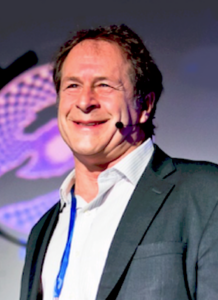
Socials: Twitter / Instagram
MAPS socials: Twitter / Instagram



In this episode of the podcast, Joe interviews cannabis expert and social ethnobotanist, Amanda Reiman, Ph.D., MSW. Reiman is the Founder of Personal Plants; an organization dedicated to promoting a deeper relationship between people and plants, and Co-Founder of Sacred Garden; a Web3 project which advocates for entheogenic plant conservation.
Reiman has over 25 years of experience growing cannabis and is intensely passionate about deepening the relationship between people and their source of healing, which she hopes is with plants they are growing. She talks about her early days of growing cannabis; the pros and cons of pharmaceutical vs. herbal plant models; the rules around cannabis regulation and taxes; the concept of retreat centers soon having liability insurance; how the different consumption patterns of cannabis and psychedelics could lead to vastly different pharmaceutical models; and what she’d like to do to promote a better connection to plants: guided tours of sacred gardens in virtual reality.
This episode swerves into territory often touched on but not fully dissected in the podcast, as they delve into the endless possibilities of cryptocurrencies, NFTs, and other Web3 projects. While the mining of cryptocurrency does present many environmental concerns, Reiman discusses how NFT groups like hers are mitigating these worries by focusing on conservation efforts, and how the benefits of being able to decentralize the internet and return control to the people may far outweigh most concerns. She sees the future bringing on the possibilities of legal defense funds and clinical trials being entirely crowd-funded, and therefore taken out of the hands of venture capitalists and the endlessly corruptible government.
“People who don’t even consume cannabis are finding joy in growing cannabis and giving it to their friends who do consume. So that’s really what Personal Plants is about: it’s taking a step back from that culture of high-level sophistication and bringing it back to the joys of gardening.”
“It becomes about profit margins and it becomes about revenue and I think that’s probably the biggest threat to plant medicine (the way we’ve seen it be a threat to healthcare). The fact that healthcare is a business means that what’s best for the people is never going to be number one, and so if we create a plant medicine system that also upholds those same values, I’m afraid the people will lose.”
“You can sit and listen to someone talk about something, [and] even if it’s freaking fascinating, it’s still not going to be the same as actually physically touching something, smelling something, [and] seeing something come alive in front of you. It just impacts the brain in a different way. So what I would love to do is have guided tours in the virtual reality space of a sacred garden.”
“I don’t think drugs are going back. I don’t think we’re going back. I think it’s too late. I was just looking at the latest Pew research figures yesterday and only 8% of the entire population thinks cannabis should be illegal. So we’re done. And I think now that we’re done with cannabis, it’s tugging on the thread of questioning about other drugs. And when I first started doing reform work, people would say, ‘Oh, you just want to legalize cannabis because you really just want to legalize all drugs.’ And you know what, Joe? I do. I do want to legalize all drugs. And I think we’re getting there.”
Cannabisbusinesstimes.com: Bank of America Closes Cannabis Researcher’s Accounts
Fortune.com: Wells Fargo rejected nearly half of their Black homeowners refinancing applications
Cointelegraph.com: Banking system consumes two times more energy than Bitcoin: Research
Frontiersin.org: Virtual Reality as a Moderator of Psychedelic-Assisted Psychotherapy
Ethereum.org: What are DAOs? (Decentralized Autonomous Organizations)
Chambersforlouisiana.com (Gary Chambers)

An internationally recognized cannabis expert and public health researcher, Dr. Reiman is a leader in the field of cannabis as a substitute for alcohol and other drugs, and has presented her research all over the world. She has written for/been quoted in The Huffington Post, New York Times, Washington Post, Rolling Stone, and Playboy, as well as numerous peer-reviewed academic journals and several textbooks.
Socials:
Amanda Reiman: Twitter / Instagram
Personal Plants: Twitter / Instagram
Sacred Garden: Twitter / Instagram / Discord



In this episode of the podcast, Kyle interviews psychiatrist, Dr. Reid Robison, and clinical psychologist, Steve Thayer, Ph.D. Together, they host the Psychedelic Therapy Frontiers podcast and work at Novamind; Robinson as the Chief Medical Officer, and Thayer as the Clinical Director of Education & Training.
They talk about their respective journeys from psychology into the field of psychedelic medicine, their current work with ketamine-assisted psychotherapy (KAP) at Novamind, and their combined efforts in educating and training future KAP therapists and clinicians – a need they feel is going to become increasingly urgent as ketamine becomes more mainstream. To meet the challenge of scaling accessibility of psychedelic therapies, Novamind recently combined forces with Numinus Wellness, creating a platform and standard of mental health care within psychedelic therapy.
Robison and Thayer discuss the different ketamine dosing modalities and purpose for each; the ketamine sessions Novamind provides for frontline healthcare workers (called ‘Frontline KAP’ or FKAP); how difficulties in emotion-processing are often at the heart of mental health struggles; and how ketamine can help loosen emotional binding, allowing greater access to them. They also discuss current clinical trials on LSD for anxiety and alcoholism; how ketamine can be used for therapist burnout; the challenge of long LSD sessions and therapist stamina; the benefits of group ketamine sessions; the concept of combining ketamine with other therapeutic modalities (or substances); and the power of stepping aside and allowing the inner healer to take over.
“Difficulties in emotion processing are often at the heart of many mental health struggles. And if we can support the clients in developing skills and confidence in moving towards their emotions, and leverage the power of the corrective experience, the healing power of caregivers, [and] supporting them with emotion coaching skills, then we’re wrapping the client in this really powerful therapeutic healing environment and leveraging ketamine as a catalyst.” -Reid
“People will tend toward self-actualization and transcendence if you give them the environment to do so. To be well is not something we have to teach people to do, it’s something that they can remember how to do. It’s in them. If we can help them peel away the negative programming and conditioning and trauma and all that stuff, they’ll find their way to health and healing.” -Steve
“To me, it makes complete sense to use something like LSD for anxiety because what we think perpetuates something like generalized anxiety is what Steve Hayes of ACT might call ‘experiential avoidance’; that we don’t want to feel these intense feelings of fear or embarrassment or rejection or whatever it is, so we worry chronically, we get addicted to worry itself, [and that] keeps us safe from having to do scary stuff. And the LSD experience is just (for a lot of people) going to crack that open and give you an opportunity to face your fears, so to speak. It’s like exposure therapy on psychedelic steroids.” -Steve
Psychedelic Therapy Frontiers podcast
Foundations of KAP Training Course from Cedar Psychiatry
MAPS MDMA Therapy Training Program
Novamind.ca: Frontline KAP Group Sessions for Health Care Workers
Wholeness.com: Dr. Scott Shannon
Psychedelics Today: PT302 – Dr. Adele Lafrance – Vital Psychedelic Conversations
Psychedelics Today: PT300 – Dr. Richard C. Schwartz – Vital Psychedelic Conversations

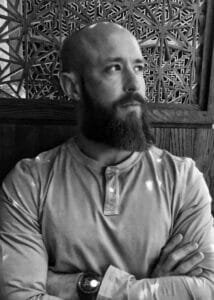



In this episode of the podcast, David interviews Dr. Dominique Morisano: clinical psychologist, professor, researcher, and Co-Founder of the upcoming non-profit conference, “From Research to Reality: Global Summit on Psychedelic-Assisted Therapies and Medicine.”
Morisano was researching the small percentage of people who experience negative effects from cannabis dependence, but in 2013, her boss retired to pursue ayahuasca research around the same time she was reading Michael Pollan’s How to Change Your Mind, and she wondered: Is there a tangible future here? She discusses the emergence of psychedelic medicine and the importance of reciprocity and inclusivity, pointing out how we often lump very different traditions together under the umbrella of “Indigenous.”
Three years in the making and planned as a one-time event, she considers the “From Research to Reality” conference to be a state of the union of the field of psychedelic science, where people from all fields in psychedelia will meet and discuss what we know, what the future could look like, and how we can get there. Each presentation was submitted and reviewed by a committee of peers, and will largely feature new research. The conference takes place May 27th to May 29th in Toronto, and a virtual option is available, with a special “Saturday night special” featuring David Nutt, Rick Doblin, Monnica Williams, and others. Check out the website for more details!
“We can’t just pick and choose what we want to gain from Indigenous knowledge. It has to be gifted to us. It has to be given freely. And if people want to incorporate Indigenous practices into their modern Western clinical practice, I think it should be done in consultation with multiple folks across different groups of different nations, and done with reciprocity in mind.”
“One person can’t speak for everybody. Three people can’t speak for everybody. 10 people can’t speak for everybody. But the more we listen to different perspectives of people coming from different nations, the more we will learn. And we includes everybody. It’s not just like we’re in one group and they’re in another group, it’s like we’re all having conversation together, hopefully learning from each other.”
“This is a place where everybody’s going to come together – government, regulators, policymakers, traditional medicine providers, neuroscientists, clinical practitioners; they’re going to all come together for the conversation. It’s a single track event, so there’s not going to be: ‘The neuroscientists are going to that room, the clinical people are going to that room.’ It’s like: No, everybody’s in the same room at the same time, listening to all the same stuff, and they’re going to learn from each other. That’s the idea. We’re going to learn from each other so that when we’re making decisions moving forward about what works best for people and for us, we’re going to have a lot of different viewpoints in the conversation.”
Fromresearchtoreality.com: Global Summit on Psychedelic-Assisted Therapies and Medicine
Mentalhealthcommission.ca: Mental Health Commission of Canada
CCSA.ca: Canadian Centre on Substance Use and Addiction
CAMH.ca: The Centre for Addiction and Mental Health
Psychedeliceducationcenter.com: Ketamine and Trauma Treatment Series




For our first ever Earth Day episode, Joe interviews publisher, ecologist, and planetary steward, Deborah Snyder. Snyder is the co-owner of Synergetic Press and its associated organic farm, orchard, and retreat center, Synergia Ranch.
Snyder worked with the team that designed and built Biosphere 2, and she unpacks the many ways in which understanding the planet as a biosphere – a collection of cooperative living systems – can shift our perspectives and help us to heal our precious home. She discusses how monitoring the earth from space can teach us how best to care for it; the technosphere’s disharmonious relationship with the biosphere; the anthropocene epoch; Synergia Ranch and Synergetic Press; the importance of recognizing ourselves as an integral part of nature; and the ways psychedelic and ecological spaces overlap. While both agree that the environment is in trouble, they have an air of optimism and action that we all desperately need in order to secure the future of the planet and our species.
This episode also features a brief chat between Joe and Kyle, with Joe calling in from Bicycle Day San Francisco. With Vital officially launching the same week we hit 3 million downloads of the podcast (!!!), they felt it was worth doing a rundown of the top 8 most downloaded episodes, as well as highlighting some of their favorites. Thank you to everyone who has been listening and sharing your favorite episodes with friends. To 3 million more!
“I would describe the psychedelic world as tools to be able to enhance a person’s ability to explore and to understand what connections and interrelationships are. Many people that have had grand epiphanies that have led to whole new revolutionary technologies attest to this phenomenon. So Biosphere 2 was definitely an example of the creativity that came out of people that were able to do that.”
“We are very much nature and I think that we need to really work on our value of what that brings us and carefully consider before utilizing those resources for something that is perhaps just a one-way street.”
“I have never met anybody that has undergone or gone through any kind of transformative experience for themselves or looking for insight that hasn’t come out with a greater appreciation for the nature of which we are a part.”
Psychedelics Today: PT228 – Deborah Snyder from Synergetic Press
The United States Environmental Protection Agency (EPA)
Wikipedia.org: Vladimir Vernadsky
Wikipedia.org: Anthropocene Epoch
Tamera.org: Peace Research & Education Center
Vandana Shiva | Synergetic Press
The Rose of Paracelsus: On Secrets & Sacraments, by William Leonard Pickard
LSD My Problem Child: Reflections on Sacred Drugs, Mysticism, and Science, by Albert Hofmann, Ph.D.
LSD Psychotherapy: The Healing Potential of Psychedelic Medicine, by Stanislav Grof
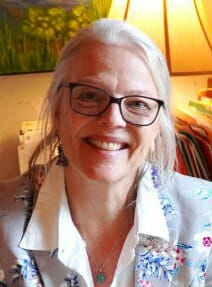



In this episode of Vital Psychedelic Conversations, Kyle interviews researcher, author, Associate Professor of Psychology at the University of Greenwich, and Co-Founder and Director of the Breaking Convention conference: Dr. David Luke.
Luke talks about the importance of understanding the full range of psychedelic experiences; the difficulty in defining and measuring the transpersonal, how science has pathologized (and religion has demonized) the weird; the need for counselors to be open minded to the reality (and after effects) of their clients’ experiences; the problem of trying to apply science to something science can’t define; and how the most important thing we need is community.
And he talks about DMT and entity encounters: What could these encounters represent, or what could these entities be? And why do people who have these experiences have such massive shifts in belief afterward? While he can’t answer these questions, he shares a few stories of his own that led to prolonged, incremental ontological shock in his own life, including elves taking light from the sky and putting it into his chest, and meeting a being with “multiple snake body tentacles all morphing in a kind of fibonacci spiral covered in thousands of eyeballs.”
Reminder that each of the guests on Vital Psychedelic Conversations is a part of the teaching team for our 12-month Certificate course, Vital. We’re taking applications until March 27th, and classes begin April 19th!
“I would have these extraordinary experiences which I couldn’t quite explain, which begged me to kind of reconsider my worldview about the nature of reality. And just as I maybe started to incorporate that and go, ‘Okay, I feel comfortable with that now, that isn’t really so mind-blowing to me any more,’ …I’d have another experience which would be even more mind-blowing than that, and I’d have to try and get my head around it. And then on and on it went. …It’s a series of just shattering your beliefs and then just staring at them on the floor and wondering how to reconstruct them.”
“When your ‘boggle-threshold’ just gets exceeded, it finally finds some new equilibrium in a more expanded kind of worldview. But then that can be exceeded again. [There] doesn’t appear to be any apparent limit on how far out we can go with our beliefs. But just a word of caution: Keep an open mind, but not so much that your brains fall out.”
“Experiences are real. It’s a real experience, no matter what. If you are somewhere in another dimension encountering with impossible entities, then it’s still a real experience. It doesn’t mean the phenomena are real or the entities exist, but it’s a real experience. …And that has a profound effect. We see these profound effects and how [they shift] people’s beliefs, so they should be treated with that respect and seriousness.”
“The very fact that the mystical experiences even are in the scientific parlance; [are] in the research agendas; [are] in some of the clinical research (not all of it); and being talked about is a massive shift. Basically, up until very recently, what we might consider a mystical experience was either demonized or pathologized. Now it’s completely done a 180, and it seems to be part of the solution for mental health problems instead.”
His Certificate course at Alef Trust: “Psychedelics, Altered States and Transpersonal Psychology”
Academia.edu profile (publications & past public events)
University of Greenwich profile
The Hard Problem of Consciousness
Newatlas.com: Largest ever DMT survey travels to the fringes of psychedelic science
The referenced John C. Lilly quote
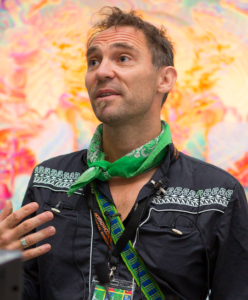
Dr. David Luke socials: Twitter / Instagram
Breaking Convention socials: Twitter / Instagram / Facebook
Photo credit: Jonny Greet – Breaking Convention



In this episode of the podcast, Joe interviews Professor of Neuroscience, author, and Founder and Vice Director of the Brain Institute at Universidade Federal do Rio Grande do Norte in Brazil: Sidarta Ribeiro.
Ribeiro tells his story, discusses some of his work with dreams, and talks about what he’s seeing happen in psychiatry: that we’re realizing how little traditional psychiatry paid attention to set and setting, how much the creation and spread of antidepressants was influenced by conflicts of interest, and how the future of psychiatry and psychotherapy will mean more talking and less use of drugs (and not the other way around).
He also discusses research where MDMA was given to octopuses; how we’re arriving at many “new” conclusions that are actually old; why he’s primarily researching LSD; how all descriptions of the world are metaphors; the ayahuasca-like drink, jurema; how we need to look at things outside the realm of logical positivism; microdosing; and why we aren’t more tolerant of each other. And he talks a lot about biopiracy: how we need to honor the sacredness of these plants, learn from the knowledge that came before Western science, and respect the dream-state journey that many psychedelic companies are trying to figure out how to remove from the experience.
We’re giving away 5 copies of Riberio’s newest book, The Oracle of Night: The History and Science of Dreams. Click here to enter!
“People need to be listened to. People need to dialogue. People need to have access to sophisticated techniques of care that can be aided by substances, but they cannot be replaced by substances.”
“What I don’t like and I think it’s either naive or disingenuous or even quite misleading (and I see it [with] lots of people; scientists, journalists, and capitalists going in that direction) is to say that the non-psychoactive psychedelics are the good ones, the preferred ones – that this is the right way of doing the therapy. I think this would be similar to saying that sex without orgasm is better than sex with orgasm.”
“Because of the propaganda, because of the war on drugs, because of Nixon, because of Reagan, because of people that said that cannabis kills brain cells, because of people that said that psychedelics would make everybody psychotic. That really worked. People really believed those myths and it really took very sustained research work over many decades to overcome this. Now, I think the genie is out of the bottle. It’s very hard to portray psychedelics as something tremendously harmful and dangerous. This moral panic; it doesn’t stick anymore.”
“We are really close to a very big positive change. And the reason I believe it is because it’s obvious that we have accumulated in the past three million years such a wide and rich wealth of knowledge from many different sources, that if we were able to gather the best of all that we have and apply it, we would reach world balance and harmony quite quickly. If we think of the financial capital that has accumulated now, the technological capital, the human capital: we have it all. But we’re still confused about something that is quite basic, which is that we need to share.”
Neuro.ufrn.br: Publications – Memory, Sleep and Dreams department
The Oracle of Night: The History and Science of Dreams, by Sidarta Ribeiro
Sciencefriday.com: I Dream Of Octopuses, But Do They Dream About Me?
Vice.com: Scientists Gave MDMA to Octopuses and They Started Hugging
Ideas to Postpone the End of the World, by Ailton Krenak
The Dawn of Everything: A New History of Humanity, by David Graeber and David Wengrow
“Human history becomes more and more a race between education and catastrophe.” – H.G. Wells
Reuters.com: Aging Japan: Robots may have role in future of elder care
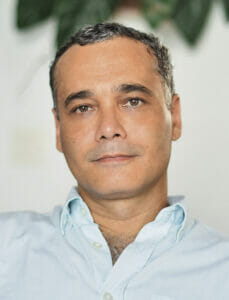
Photo credit: Elisa Elsie



In this episode of Vital Psychedelic Conversations, David interviews Andrew Tatarsky, Ph.D.; author and developer of Integrative Harm Reduction Psychotherapy, and Juliana Mulligan; writer and head of Inner Vision Ibogaine, which supports people in their preparation for and integration of ibogaine treatment. Both are involved with our Vital program, and both are part of The Center for Optimal Living in NYC (CFOL); Tatarsky as the Founder and Director, and Mulligan as the Psychedelic Program Coordinator.
Mulligan tells her story of overcoming opioid dependence through an almost deadly ibogaine treatment, and how later, she began to see two major issues quickly becoming a problem: the continued labeling of psychedelic interventions as “miracle cures,” and the alarming lack of knowledge so many people seemed to have about preparation and integration. Tatarsky discusses his realization that traditional 12-step or abstinence-only programs were contributing to what he calls “treatment trauma,” and how breaking the rules in how he treated people led to a newfound interest in harm reduction and the creation of the CFOL.
They talk about reframing addiction, the ways society divides us by accepted behaviors, how being taught to doubt ourselves as children creates trauma, the idea of the “disease narrative” and self-demonization, how research studies support the idea of the quick fix, and harm reduction as a pathway to a better self.
The CFOL is currently running an 8-week virtual training series with a focus on intersectionality and social justice called “Working with Psychedelics to Treat Substance Use Issues,” featuring names like Gabor Maté, Laura Mae Northrup, Courtney Watson, and Dr. Carl Hart. Mulligan developed the curriculum by asking her favorite people in the psychedelic space what they were most passionate about. Check out the event page here.
“The harm reduction framework is about not imposing barriers, expectations, our values [and] our agendas on the people that we’re trying to be helpful to. It’s about radical acceptance and respect and empowerment, and therefore we can truly meet people where they are as unique humans in unique social and relational environments and create a safe space to support people in discovering their truth and their goals and what approach to positive change makes sense to them. So it’s non-ideological, it’s non-prescriptive, and I think it really is a very powerful way of engaging folks. And it works!” -Andrew
“I had to go through homelessness and getting beaten up and going to jail and all of this, but the most traumatizing thing for me was being told repeatedly that I had a disease for life that had no cure and I had to admit that I was powerless and say that I was an addict for the rest of my life, and if I stopped going to these meetings, then I would end up in a jail, institution, or I would die.” -Juliana
“In the psychedelic world in general, we need to get away from this kind of ‘miracle’ language or even ‘10 years of therapy in one night.’ That kind of thing, I think, is playing into the notions that we’ve been taught in capitalism that you can buy your way into getting what you want or there’s some kind of magical overnight fix for things. There’s not.” -Juliana
“We’re losing hundreds of thousands of people a year from lethal overdose or drug poisoning because of prohibition. Our American gulag is filled with mostly people of color and folks in marginalized communities because of the simple use or possession of a substance. I mean, these are catastrophic outcomes of prohibition. If anybody ever believed that prohibition was supposed to be helpful to vulnerable people, I think that’s been glaringly exposed as a terrible lie.” -Andrew
Harm Reduction Psychotherapy: A New Treatment for Drug and Alcohol Problems, by Andrew Tatarsky
Center for Optimal Living facebook
Centerforoptimalliving.com: Training + Events
Centerforoptimalliving.com: Integrative Harm Reduction Psychotherapy Certificate Program
The Hidden Dimension: Psychodynamics of Compulsive Drug Use, by Leon Wurmser
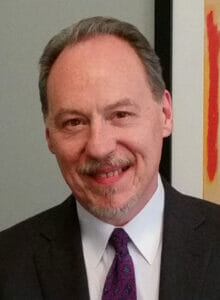

Instagram / Facebook / LinkedIn



In this episode of Vital Psychedelic Conversations, Kyle interviews Sam Gandy: researcher, science writer, Ph.D. ecologist, and collaborator with the Centre for Psychedelic Research at Imperial College London.
Gandy is most interested in the capacity of psychedelics to amplify or ignite our relationship with nature. He talks about our skewed relationship with nature; David Luke’s study on nature interconnectedness after psychedelic experiences; and ways to add nature into the integration and prep stages, from VR to planting seeds to even just looking at pictures or videos.
He talks about the challenge of maximizing the benefits of the psychedelic experience and the need for more knowledge on how to integrate, asking how we can use psychedelics intentionally as creativity-enhancing agents. And they discuss James Fadiman and Willis Harman’s 1966 “Selective Enhancement of Specific Capacities Through Psychedelic Training” study and how the directive priming that was used in it is similar to intention-setting today.
They also discuss the communal aspect of the music festival psychedelic experience, dream states and creativity, how more research is needed on the context around the chemicals (not just the chemicals), and the complications of trying to step into a newly-discovered life purpose while living in a capitalist society.
“People are maybe slightly focusing too much on the chemical substances themselves when the context around the usage of those chemicals is probably much more important and in need of much more attention, I think. And I feel like more exploration there could enhance the potential benefits of psychedelics in a variety of different ways.”
“Some scientists have argued, as I do in this paper, that perhaps we’ve become a little bit over-reliant on analytical thinking. Like, I’m in no way shooting down the importance of analytical thinking. It’s absolutely essential. But perhaps [these] more slightly dynamic, free-flowing, unconstrained states of consciousness that you can access through these altered states – perhaps they’ve got a place.”
“There’s not that much known, really, at this stage, about how to maximize the benefits in terms of people bringing those insights back and integrating them into their life and acting on them. That’s something that I feel needs more attention.”
“Prior to people going into an experience, you could maybe tend a bit of soil, like you’re preparing your psychic soil before going into [the] experience. And then plant a seed that you then take away and you nurture this young plant as you’re hopefully nurturing and grounding the insights in yourself.”
Pubmed: Economic value of protected areas via visitor mental health
Psychedelic-library.org: Selective Enhancement of Specific Capacities Through Psychedelic Training
Scientificamerican.com: Spark Creativity with Thomas Edison’s Napping Technique



In this episode of the podcast, fresh off the heels of the announcement of (and opening of applications for) our new 12-month certificate program, Vital, Kyle sits down for episode 2 of Vital Psychedelic Conversations; this week with two figureheads lending their knowledge to the course: Annie & Michael Mithoefer.
While also supervising and training therapists for MAPS-sponsored trials, the Mithoefers are probably best known for groundbreaking trials they’ve been involved in, including two MAPS-sponsored Phase II trials studying MDMA-assisted therapy for PTSD, a study providing MDMA-assisted sessions to therapists completing the MAPS therapist training, and a pilot study treating couples with MDMA-assisted therapy combined with Cognitive Behavioral Conjoint Therapy. They are also both Grof-certified holotropic breathwork practitioners, and huge proponents of breathwork in general.
They talk about why they connected so much with breathwork and how it cured Annie’s panic attacks; how they’ve used breathwork in their practice in conjunction with therapy; what trusting or following the process means (for the patient and facilitator); the concept of the inner healer (or “inner healing capacity”); touch and bodywork in therapy; how the communal, group process aspect of breathwork is inspiring ideas for group MDMA sessions; how we can best scale therapy; updates on new trials for 2022; and their best advice and biggest takeaways they’ve learned from decades in the field.
“It’s not that you never offer any direction or engage and help people if they’re stuck, it’s that that only happens in service of what’s already trying to arise spontaneously; that the point is to give plenty of time and encouragement for that process to just take its own path and unfold in its own way. …You may be offering quite a bit sometimes in terms of support and direction, but it’s only in service of what’s already happening.” -Michael
“Stan learned it by working directly with thousands of people with LSD in the beginning. And of course, other cultures (in some cases, for hundreds of thousands of years) have developed knowledge about wise use of these kinds of states. So it sounds a little new-agey or woo woo (‘Trust the process’ and the inner healing intelligence, you know), but it’s based on reality that people have observed for a very long time. And we see it. We just get it reaffirmed again and again.” -Michael
“People do get better with love and care. Sometimes it’s just that extra fifteen or twenty minutes at the end of a breathwork session when somebody is still kind of shaky, or sitting with them and having a meal after breathwork, or the extra times that you take with people. Supporting people: it really makes a difference.” -Annie
“There’s something great about breathwork, to know that you can have these experiences without taking anything – just having that experience of: ‘Wow. These places are not as far away as I thought they were.’” -Michael
Beyond the Brain, by Stanislav Grof
Maps.org: Israel Embraces Research on MDMA-Assisted Therapy for PTSD
Ncbi.gov: Relational and Growth Outcomes Following Couples Therapy With MDMA for PTSD
Psychedelics Today: PT227 – Dr. Anne Wagner – Couples Therapy, MDMA, and MAPS
Maps.org: Phase 2 Study at the Bronx, New York Veterans Affairs Medical Center
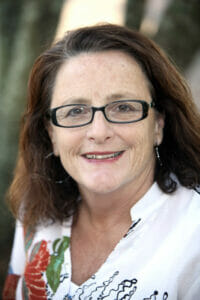
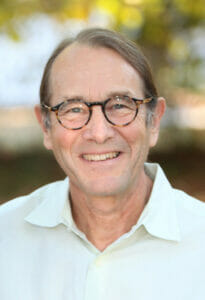



In this episode of the podcast, Joe interviews Chairman and Chief Executive Officer of Tryp Therapeutics, Greg McKee.
Tryp Therapeutics, a fairly young, early-stage biotech company, is focusing on nociplastic pain (the hard-to-explain pain where nothing seems physiologically wrong, but a nerve signal related to pain seems to be stuck in the “on” position) and how it could be alleviated through the rewiring often possible in the psychedelic experience. They are first looking at psychedelics for chronic pain and eating disorders, and when this podcast was recorded, had just received FDA clearance to begin a fibromyalgia study at the University of Michigan (with studies on phantom limb pain, complex regional pain syndrome, binge eating disorder, and hypothalamic obesity likely coming after). They are also working on a psilocybin derivative-based novel compound and novel route of administration/protocol, possibly with the ability to stop a difficult trip when necessary.
McKee discusses the origins of Tryp, the benefits of using synthetics, 5-MeO-DMT, how the Nixon administration killed research progress, the positives to take away from Compass Pathways’ preliminary psilocybin Phase 2B trial results, MAPS and possible insurance models, Robin Carhart-Harris, why a lot of early psychedelic investors may be mistakenly panicking, and the idea of insurance covering the treatment of a patient for a period of time rather than number of visits.
“We think that there’s a huge opportunity to unleash the full potential of psychedelics, well beyond traditional mood disorders.”
“It’s a fascinating field, no doubt. There’s a lot to be learned and there’s still a lot more questions, frankly, than answers. That’s the thing that’s really quite surprising. I mean, I’ve been on a learning curve [and] I got right to the edge fast, because I realized, ‘Oh shit, nobody has the answers to these questions.’”
“The thing about synthetic is that it just allows you not only to have consistency and all that that we just [talked] about, but it allows you to scale so you can impact so many other people’s lives. So it is a little bit of a pain in the backside to go through this process, and I can totally get why certain people are saying, ‘Hey, why do we need the pharma industry to do this?’, but on the other hand, if life science investors and biotech and pharma companies do get involved and push this through to market; boy, you’re going to be able to treat so many more patients.”
YouTube: Stanislav Grof: Psychedelics and the Future of Humanity, from Psychedelic Science 2017
Psychedelics Today shop: Save a Toad Short-Sleeve Unisex T-Shirt (it’s “exploit a chemist,” not “squeeze,” Joe)
Chasing the Scream: The First and Last Days of the War on Drugs, by Johann Hari
University of Michigan: Chronic Pain & Fatigue Research Center (where Dr. Dan Clauw works)
Psychedelics Today: PT245 – Robin Carhart-Harris – Psychedelics, Entropy, and Plasticity



